












NC TECH AWARDS: 30 UNHERALDED INDUSTRY STARS BIGGEST FINANCIAL INSTITUTIONS | BEST EMPLOYERS | CHEROKEES’ MARIJUANA PUSH JUNE 2023 HEALTHY RETURNS Raleigh investment firm QHP Capital seizes opportunity to back promising life-science and med-tech enterprises. Price: $3.95 businessnc.com



4 UP FRONT
6 PILLARS OF N.C.

Luther Hodges Jr. reinvented himself throughout his career.
10 POWER LIST INTERVIEW



Dr. Anthony Atala’s pioneering work in regenerative medicine helps restore failing organs.
14 NC TREND




Major protein producers and retailers face off over charges of antitrust violations; Becca Wright turns a family recipe into a hotselling gourmet snack; A coastal beach club preps to build on its elite status; A veteran economist says insuring all bank deposits can calm the industry’s turmoil; News from the N.C. Tribune
94 GREEN SHOOTS
A Johnston County flour mill expansion shows ag still matters in the fast-growing suburban area.
44













28 ROUND TABLE: BUSINESS



& EDUCATION
Business and education leaders discuss overlooked paths to highpaying jobs.

34 NC PORTRAITS: WOMEN IN BUSINESS
Four leaders reveal their definitions of successful leadership.

82 COMMUNITY CLOSE UP: GUILFORD COUNTY


Transportation businesses driving growth in a county long known for furniture.
HEALTHY RETURNS
A Raleigh private-equity group eyes opportunities in financing innovation in drug discovery and healthcare services.







 BY DAVID MILDENBERG
BY DAVID MILDENBERG
SMOKY MOUNTAIN HIGH


The Cherokee tribe’s wager on marijuana portends another regional economic boost.
BY EDWARD MARTIN
BANKING N.C.
Ranking the state’s biggest financial institutions and money management groups.




N.C. TECH AWARDS


Meet 30 top performers making a difference at global firms, agencies and small enterprises.
 BY KEVIN ELLIS
BY KEVIN ELLIS
BEST EMPLOYERS
These businesses – both large and small – do the extras to keep workers happy.
3 JUNE 2023 June 2023, Vol. 43, No. 6 (ISSN 0279-4276). Business North Carolina is published monthly by Business North Carolina at 1230 West Morehead Street, Suite 308, Charlotte, NC 28208. Phone: 704-523-6987. All contents copyright © by Old North State Magazines LLC. Subscription rate: 1 year, $30. For change of address, send mailing label and allow six to eight weeks. Periodicals postage paid at Charlotte, NC, and additional offices. POSTMASTER: Send address changes to Business North Carolina, 1230 West Morehead Street, Suite 308, Charlotte, NC 28208 or email circulation@businessnc.com. Start your day with business news from across the state, direct to your inbox. SIGN UP AT BUSINESSNC.COM/DAILY-DIGEST.
JUNE 2023 COVER STORY
48
60
40
52
COVER PHOTOGRAPHY BY BRYAN REGAN
PROBLEM SOLVERS
We are excited to share a new feature with you in this issue. BNC partnered with technology advocacy association NC TECH to launch the Next Tech Awards to showcase and celebrate North Carolina’s rising tech stars. Next Tech Awards honors a selection of individuals who are critical and exceptional performers helping to grow our state’s tech and tech-enabled companies and organizations. e focus is on those who are c-suite executives and o en aren’t recognized publicly. Individual winners, who are pro led on pages 52-59, will be celebrated during a reception on June 12 at the Raleigh Convention Center.
e awards honor contributors who go the extra mile, build products, increase revenue, support operations and manage projects that propel businesses forward. What these individuals share in common is their exceptional business impacts, positive energy and attitude, and community engagement.
I was fortunate to be one of the judges, which was no easy task. ere are many great folks working in our state’s technology industry. e fact that these people don’t get as much attention as others makes the project unique.
My colleague, Kevin Ellis, edited the list and pro les. Here are his thoughts:
“Just from where they went to school or their backgrounds, you could tell these folks work really hard and enjoy what they do. ey enjoy the challenge, and most of them relate it back to solving problems for customers or others.”

“It’s amazing at the number of these folks who give back to the community, whether it's mentorships, volunteering or raising service dogs to give to the disabled.”
As you read about those being honored, I’m sure you will agree these are special people.
Contact Ben Kinney at bkinney@businessnc.com.

e Power List 2023 edition included these inaccuracies. We regret the errors and we have been updated them our website.
• e wrong photo for Tands CEO Cam McRae was published.
• SAS Institute's expected plans for issuing IPO shares was misstated.
• e operating performance of Brighthouse Financial was misstated.
• Accenture's work for the N.C. Department of Health and Human Services was inaccurately portrayed.
PUBLISHER
Ben Kinney bkinney@businessnc.com
EDITOR
David Mildenberg dmildenberg@businessnc.com

MANAGING EDITOR
Kevin Ellis kellis@businessnc.com
ASSOCIATE EDITOR
Cathy Martin cmartin@businessnc.com
SENIOR CONTRIBUTING EDITOR
Edward Martin emartin@businessnc.com
SPECIAL PROJECTS EDITOR Katherine Snow Smith
CONTRIBUTING WRITERS
Kathy Blake, Vanessa Infanzon, Tucker Mitchell, Ebony Morman, Ray Gronberg
CREATIVE DIRECTOR
Peggy Knaack pknaack@businessnc.com
GRAPHIC DESIGNER
Cathy Swaney cswaney@businessnc.com
CONTRIBUTING PHOTOGRAPHER

Bryan Regan
MARKETING COORDINATOR

Jennifer Ware jware@businessnc.com
ADVERTISING SALES
ACCOUNT DIRECTOR Melanie Weaver Lynch, eastern N.C. 919-855-9380 mweaver@businessnc.com
ACCOUNT MANAGER AND AUDIENCE DEVELOPMENT SPECIALIST Scott Leonard, western N.C. 704-996-6426 sleonard@businessnc.com
CIRCULATION: 818-286-3106
EDITORIAL: 704-523-6987
REPRINTS: circulation@businessnc.com
BUSINESSNC.COM
OWNERS
Jack Andrews, Frank Daniels III, Lee Dirks, David Woronoff, in memoriam Frank Daniels Jr.
PUBLISHED BY Old North State Magazines LLC

PRESIDENT David Woronoff

4 BUSINESS NORTH CAROLINA
VOLUME 43, NO. 6
UP FRONT Ben Kinney



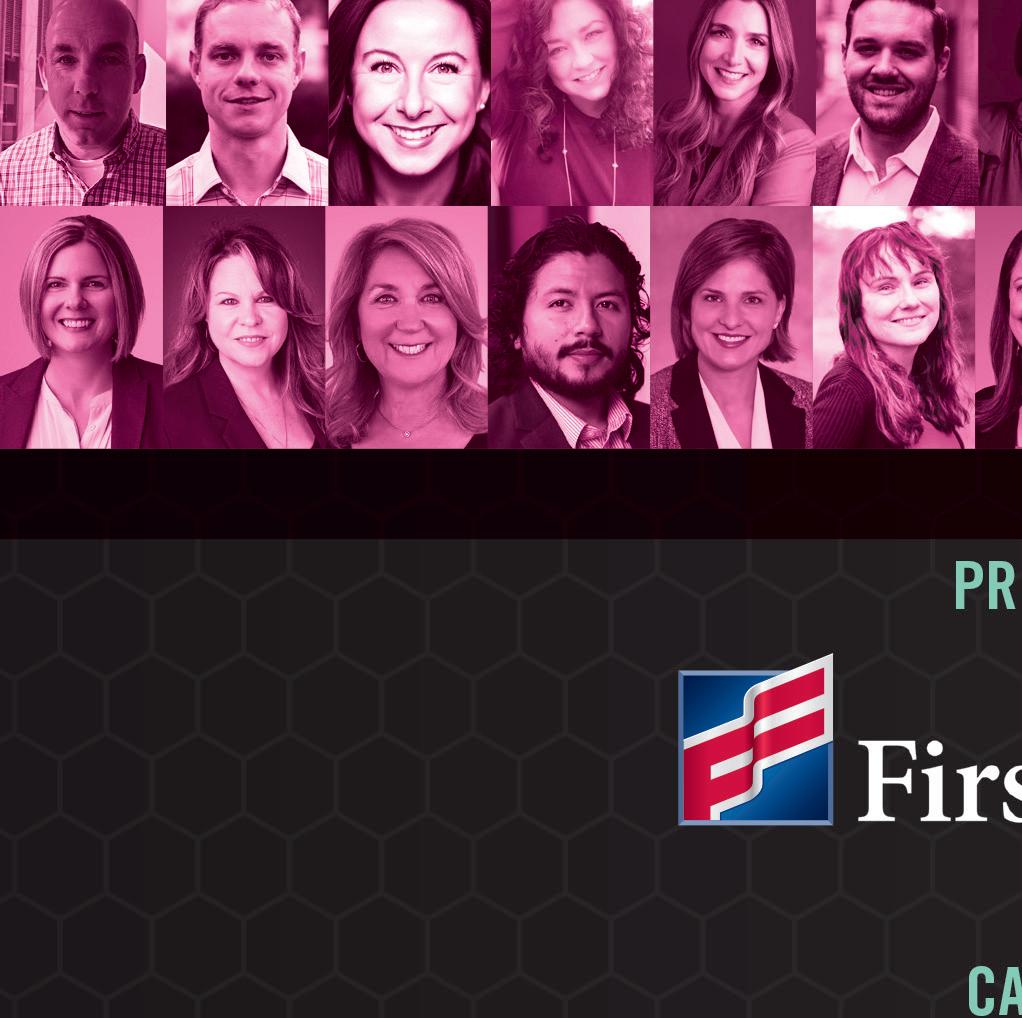





LUTHER HODGES JR.
The son of a governor reinvented himself throughout his career.

 By Vanessa Infanzon
By Vanessa Infanzon
If Luther Hodges Jr. thought being the son of an in uential governor would make for a smooth ride, he was mistaken. Hodges made his way through banking, politics and business by adapting to a variety of complex situations.
Hodges, 87, grew up in Leaksville, in Rockingham County near the Virginia border. He earned his bachelor’s degree at UNC Chapel Hill in 1957, during his father’s gubernatorial reign from 1954-61. e younger Hodges served in the Navy from 1957 to 1959, then earned an MBA from Harvard in 1961.

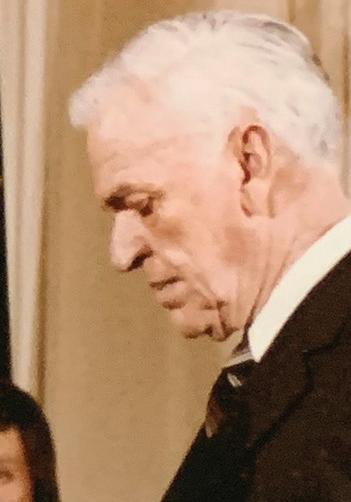
ough he had worked for a summer at then-dominant Wachovia Bank, Hodges chose to join North Carolina National Bank in Charlotte, which was formed in 1960 a er mergers of



banks in Charlotte and Greensboro. His peers included Hugh McColl Jr., who had joined the organization in 1959.
“ ey would sit up late at night and talk about how they were going to turn NCNB into a banking powerhouse,” says Greensboro author Howard Covington Jr., who with Marion Ellis co-wrote a history of NationsBank, which became Bank of America. “ ey were competitors and good friends.”
Over the next 15 years, the duo helped NCNB CEOs Addison Reese and Tom Storrs to build one of the nation’s 25 largest banks. Hodges spent lots of time attracting clients in the Northeast states, while McColl focused on lending to Carolinas’ businesses. At age 38, Hodges became chairman of the bank’s board, which was distinct from the holding company.
“(Hodges) was a good public face for the bank,” Covington says. “Luther had a recognizable name. He was a handsome guy. He did well in front of the public and the legislature, or wherever he was needed.”
By the mid-1970s, many U.S. banks were struggling because of high in ation and growing levels of uncollectible consumer and real estate loans. To help steer NCNB through the di cult period, then-CEO Tom Storrs preferred McColl’s “driving force of energy” to Hodges’ “glitz and glamor,” Covington says.
Like his father, Hodges had political ambitions. A 1974 Time magazine feature on “Leadership in America” spotlighted one emerging leader in every state. Hodges, then 37, represented North Carolina. Pundits expected him to launch his political career “before the decade is out,” Time reported.
In 1977, Hodges resigned from NCNB to run for U.S. Senate. (McColl became CEO in 1983 and built what is now the secondlargest U.S. bank.) Democrats hoped to defeat Republican Jesse Helms, who was completing his rst term. In a surprising primary upset, N.C. Democrats chose John Ingram, the state’s populist insurance commissioner, over Hodges. Helms easily defeated Ingram in the general election.
6 BUSINESS NORTH CAROLINA
PHOTOS COURTESY OF LUTHER HODGES JR.
Hodges’ mountain home is filled with Russian and Southwest art..
Hodges then focused on Washington, D.C., when President Jimmy Carter tapped him as a deputy secretary of Commerce during the second half of Georgia peanut farmer’s single term. (Luther Hodges Sr. had been Commerce secretary for four years under Presidents John F. Kennedy and Lyndon Johnson.)
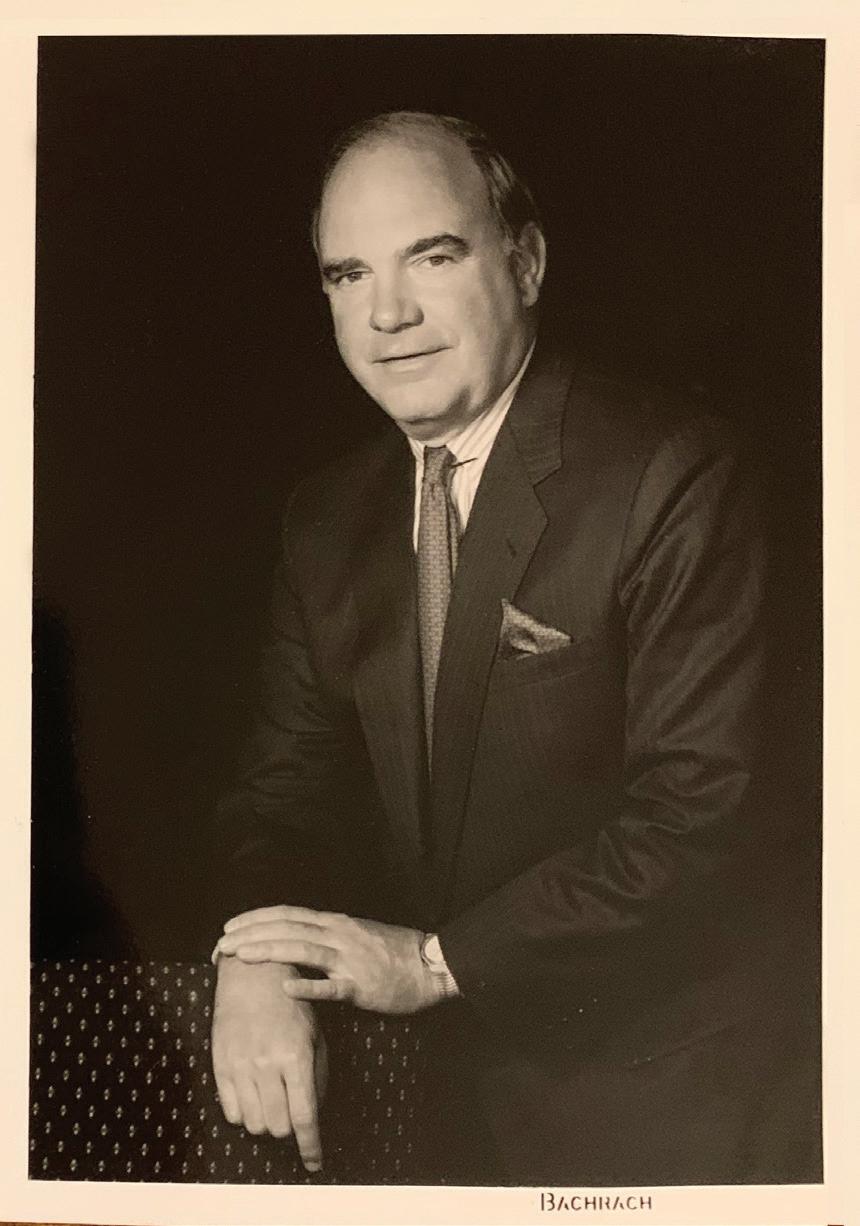
In 1980, Hodges was named chief executive of the National Bank of Washington. a much smaller bank than NCNB but the oldest nancial institution in the nation’s capital. e bank was then owned by the United Mine Workers union, which sold its stake to a group led by Hodges in 1985. A er a disagreement with minority investors from Saudi Arabia, he resigned in 1990 and moved to Santa Fe, New Mexico, for a fresh start. He invested in the Hotel Santa Fe and a city magazine, served on the local college board and bought lots of Southwest-themed art.
Hodges returned to North Carolina in 2000, living in the Boone area. His current residence has stunning views of Grandfather Mountain and other peaks and a large o ce lined with photos from his career and art collected over the decades. His son is a money manager in the Seattle area and his daughter works in banking in Charlotte. He has four grandchildren.
Comments are edited for length and clarity.


Everyone thought I had a leg up because the governor was my father. But it was also a liability. You have to be good. Fortunately, I was successful and everything went well.
When I got out of Harvard, I chose the North Carolina National Bank, which was just formed by a merger between banks in Charlotte and Greensboro in 1960. We were competing with the Wachovia Bank, and we did very well. Banking was the biggest business in North Carolina – it was where the action was.
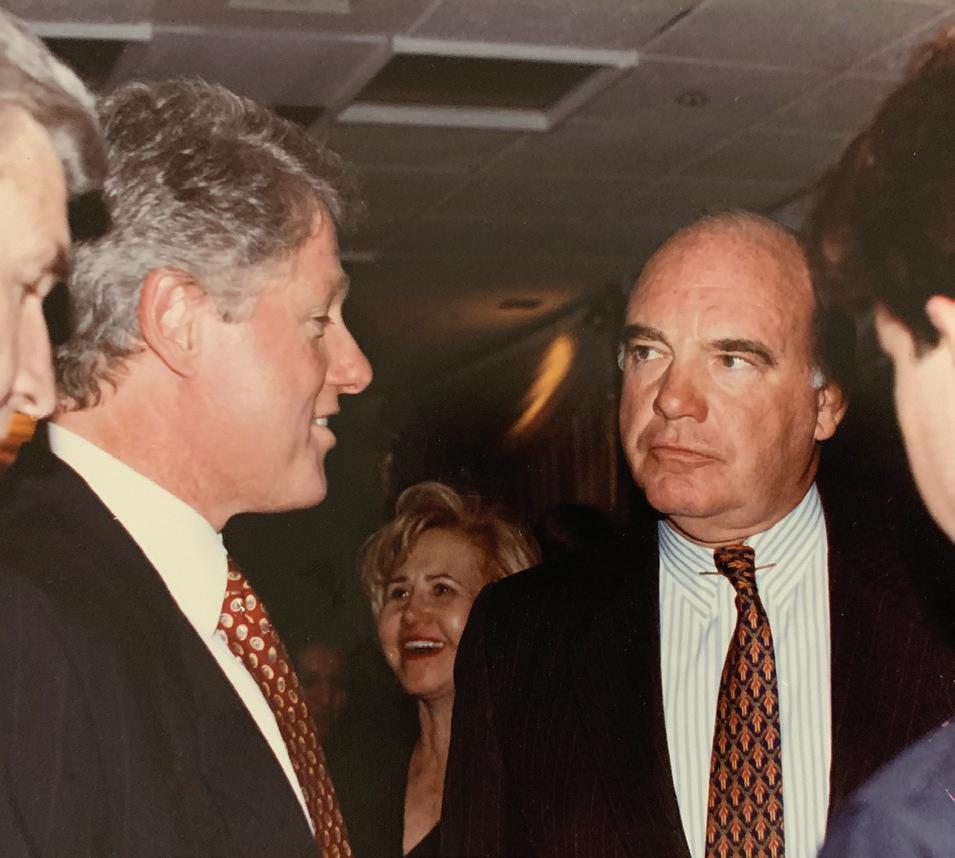
We (Hugh McColl Jr.) were at Chapel Hill together. We were in ROTC together. I went to the Navy, he went into the Marine Corps.
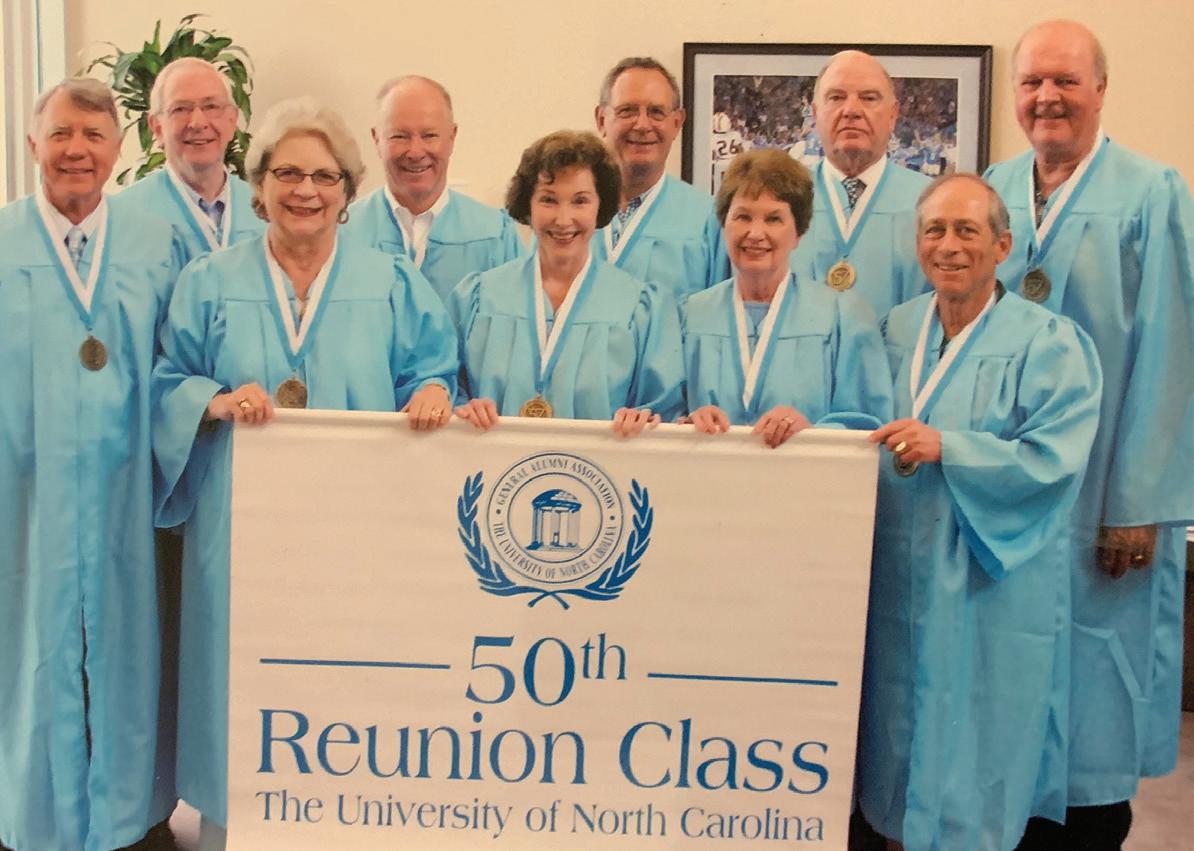
Hugh and I were close friends, but we were also competitors. We were equals at NCNB, and we both worked quite hard and were quite successful. I became chairman of the board and he became president of the bank. We complemented each other, but there was also jealousy between the two of us, which I would admit to.
I traveled to northern states for the rst few years. We were trying to get the banks and corporations to do business with NCNB. We wanted to cultivate relationships.
7 JUNE 2023
A 1978 primary defeat ended Hodges’ political plans. College classmates included former N.C. Supreme Court Judge James Exum, far left.
In 1977, I quit the bank and ran for United States Senate. Everyone told me I could save the world from Jesse Helms. He was a bit controversial but had his own following. I ran for o ce in 1978, and it didn’t work. My people didn’t vote (in the Democratic primary runo ); they assumed I was going to win.

Mr. Carter was then president and he asked me to join his team. Carter was an interesting commodity. He wasn’t a strong person. I worked there until Carter le . I get a Christmas card every year.
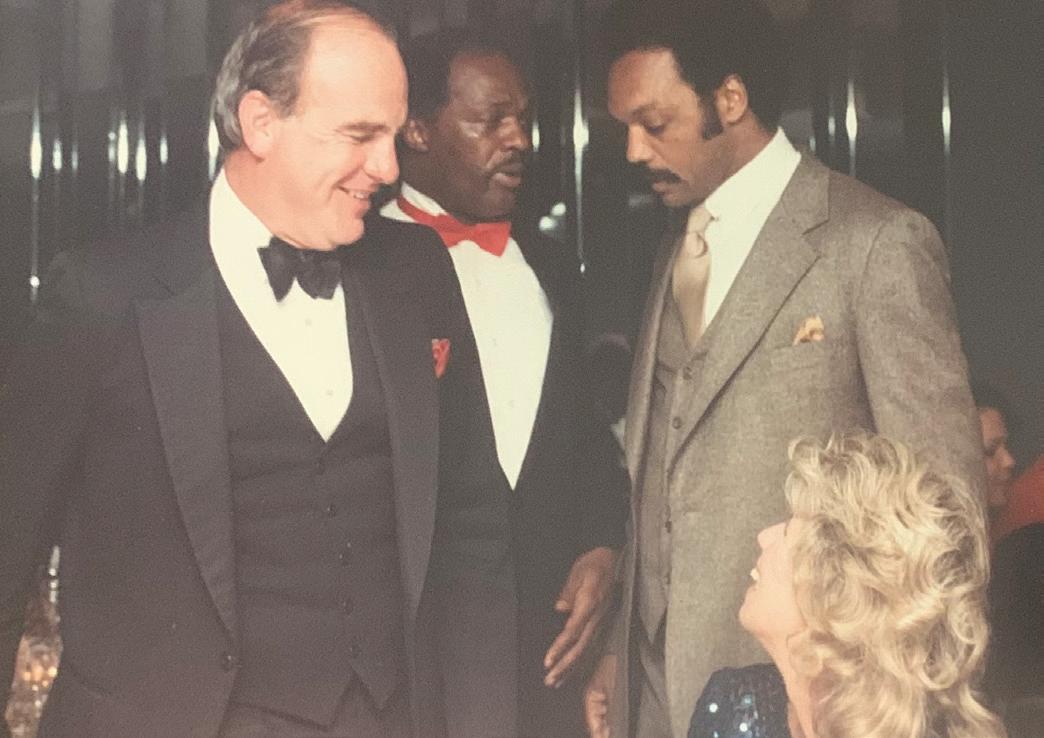
A lot of the problems I had at the bank (Bank of Washington) was raising the money, largely from a Saudi Arabian investor. ey owned a big piece of it. ey decided they wanted to run the bank.

ey did not want me to run the bank. ey paid me to go away. I wanted to sell the bank, and they didn’t.
at’s when I went to Santa Fé and started another life. I owned the (Santa Féan) magazine in Santa Fé. I was trying to create another career for myself.
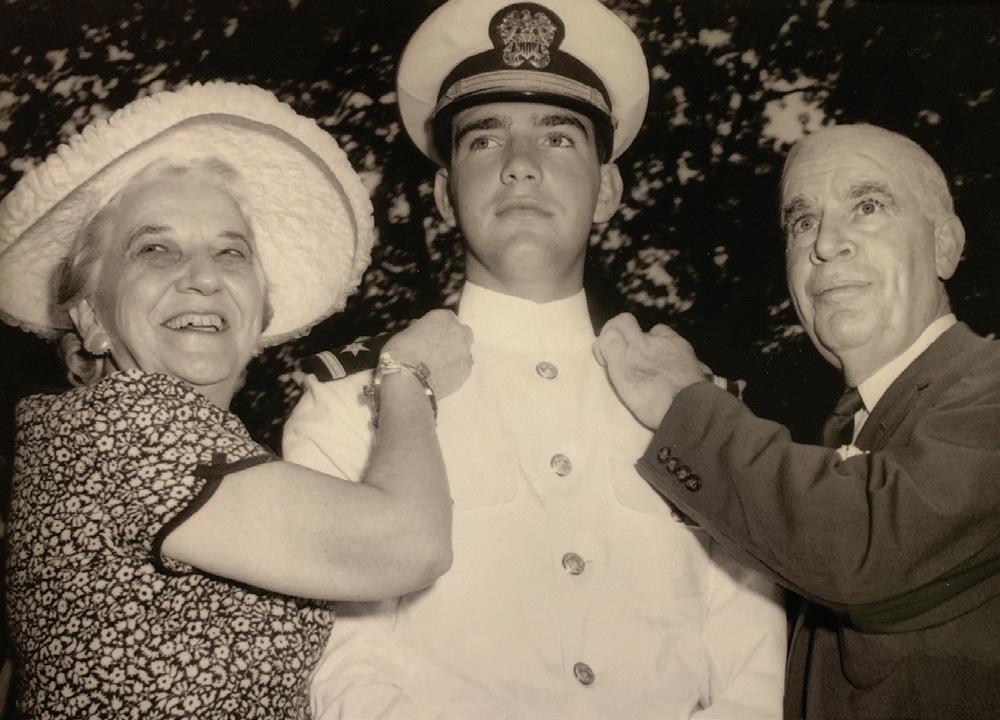
As my father used to say, everybody in the South is born a Democrat and a Methodist or Baptist. Give them a little bit of money and they become a Republican.
e South, 40 years ago, had conservative Democrats. I certainly, as was my father, a conservative Democrat. ere’s no such thing today. A conservative Democrat is an oxymoron right now.

We’re too divided and there’s very little interaction between one side and the other. at’s not a good way to be. Right now, we’ve got two very di erent parties and God knows what’s going to happen.
It’s going to be an interesting time. It’s di cult to predict at this moment, but I’m very worried and pessimistic about it. We don’t really cooperate with each other anymore. It’s not a good scene. I’m too old to do much about it.

I came back to North Carolina in 2000. I always wanted to come back.
North Carolina has done very well. It’s got education, decent government, and I’m sort of proud of what it’s done. ■

8 BUSINESS NORTH CAROLINA
Hodges served in the Navy between stints at UNC Chapel Hill and Harvard. He was a high-profile Washington, D.C., banker during the Reagan Administration. He now lives near Boone.
Hodges’ with former Washington, D.C. mayor Marion Berry and Jesse Jackson.

with Nido Qubein at High Point University
REDISCOVERING WONDERS
Dr. Anthony Atala joined High Point University President Nido Qubein in the Power List interview, a partnership for discussions with some of the state’s most influential leaders. Interview videos are available at www.businessnc.com.
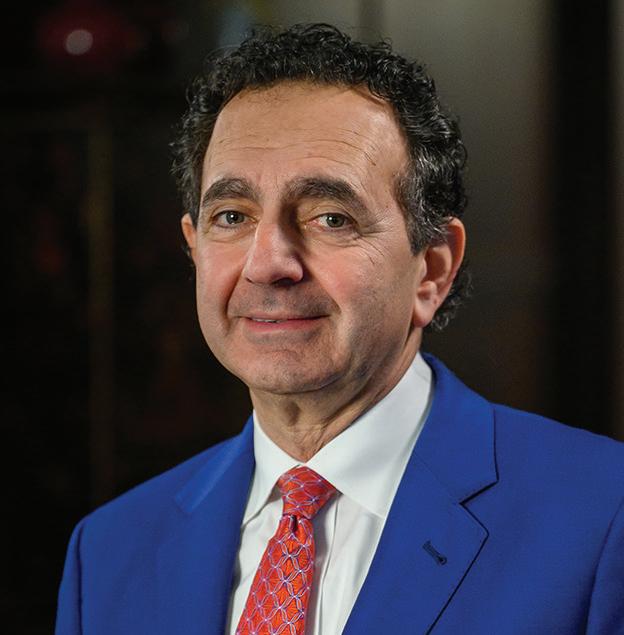

Anthony Atala is a superstar in North Carolina’s medical research community. The physician is director of the Wake Forest Institute for Regenerative Medicine. He’s edited 25 books, published 800 journal articles and received more than 250 patents. Scientific American named him one of the most influential people in global biotech. Time has cited his work twice among the Top 10 medical breakthroughs of the year. Atala was born in Peru and grew up near Miami. He earned a medical degree at the University of Louisville and worked at Boston Children’s Hospital before moving to Wake Forest Baptist Medical Center in 2004.
This story includes excerpts from Atala’s interview and was lightly edited for clarity.
How do you define regenerative medicine?
Regenerative medicine is really a field that takes in a lot of different aspects of science to basically help to regenerate your tissues and organs — to make them better — to make them healthier. And that’s really, in a nutshell, the field.
Does regenerate mean recreate?
You’re really recreating what’s already there because your cells already have all the genetic information. Each cell in your body has the playbook of what it’s supposed to do. So, it’s really making sure you put them back in the same environment to let them do what they need to do.
We really need to take in that we’re not discovering anything. We’re rediscovering the wonders of what created us. God created this universe, and we’re just rediscovering the wonders that are there. It’s amazing to see how much information goes to make just one cell. And how do we make sure we can replicate what nature already does so we can make it better for generations to come?
So if my liver is in bad shape, there’s hope?
That is the goal of regenerative medicine. One thing to remember is nature made us with a 10-times reserve for pretty much all our organs. If you get chest pain, they rush you to the hospital, and find out that the blood vessel to your heart is over 90% obstructed. You did not get pain when that blood vessel was 80% obstructed. You only had the pain when it was over 90%. Same with your lungs. The question is, when that reserve starts giving out, how can we make sure that we refill the tank?
I would like my body to tell me at 20%.
That’s the key to the future of medicine. It’s about preventive medicine You want to detect that problem when you’re at 50% or less to prevent it.
What does genetics play in predicting your health?
Features in your genes predetermine certain factors. If you’re born with a gene, for example, for cystic fibrosis, you’re going to be born with cystic fibrosis. Or you are born with a defective gene that prevents you
10 BUSINESS NORTH CAROLINA
LIST INTERVIEW
from making a protein, that is going to be problematic for you to live long. But you are not dealing with single gene defects. You’re dealing with just abnormalities in your body that you need to overcome, and you can help to overcome them by living a healthier life.
How do you recreate a kidney or liver?
We take a small sample of tissue of the organ that we want to regenerate. So, it’s your own cells. We take a sample of tissue, less than half the size of a postage stamp. We can then expand those cells outside the body into large quantities, and we can then use those cells to recreate the tissue — either by hand, or we can print them, or we can inject them. And, because we are using your own cells to create that tissue or organ, it will not reject. Your body will recognize it as its own. You are creating new structures for your body.
How many employees do you have?
At the Wake Forest Institute for Regenerative Medicine we have about 470 people. We have MDs, Ph.Ds, MD-Ph.Ds, masters students, scientists of all types. When you are creating a tissue or an organ, it’s not just cell biology. It’s cell biology, molecular biology, genetics, material sciences, engineering, nano-technology. It takes a village to get these tissues and organs into patients.
Does a 50-year-old have greater success with regenerative medicine than someone 85?
Your cells keep producing no matter your age. There are so many factors. It’s the blood vessels that feed your cells, the nerves that feed your cells. So there are a lot of factors, but whether you’re 8 or 80, you’re still reproducing cells, but the backing for the tissue may be different. Your body does go through changes over age. But, your cells remain genetically the same, from the time you are born to the time you die.
Do you have faith in how the FDA operates?
The FDA is there to protect the consumer, and they’re doing a good job. Look at the technologies out there and we see few problems compared to the past. The FDA has tried to modernize itself and tried to reinvent itself, so I think they’re on a good path. These technologies are available through clinical trials, but the average time for a drug to get approved and to the first patient is about 18 years.
What excites you about work?
We work on about 40 different technologies, and they’re affecting different types of diseases. And, you may say, ‘Well, this is more important than the other one.’ In reality, they’re not. If you’re the patient, that challenge is the most important thing for you. The importance of those technologies is equal.
How many other groups are working similarly?
There’s probably not a single university in the world that does research that is not involved in an area related to regenerative medicine, whether they are working with cell biology or material sciences or just delivery of therapies. And that’s good because it means that technologies are working and people are getting behind it. Knowledge is additive and it’s compounded. This January, we are at 501 active collaborations, of which about 440 are national and 60 are international.
Can you
explain this in layman’s language?
I’ll make it simple. You’re taking cells from a patient. You’re expanding them, you’re creating a three-dimensional mold in the shape of the organ, and you’re coating the cells like you’re baking a layer cake. And then you put it in this oven-like device that has the same conditions as the human body, then you can take it out and plant it back into the patient. I have to emphasize — that’s highly over simplified — but that’s really how it gets done.
What would say to a business audience?
Everybody wants to live longer, and that’s because we have so much more at our disposal now. The average life expectancy in 1900 was about 40. Today, it’s over 80. We’ve doubled our life expectancy in a century. The key is living longer, but with quality of life.
In some countries, life expectancy is still in the 40s?
Absolutely. The quality of the water, the environment and nutrition. Think about the nutritional supplies we have today that we didn’t have before. Before, if you wanted something sweet, it was processed sugar. Now you have all these substitutes.
What you consume is one of the most important things in terms of longevity. And exercise. Eating well, exercising well and avoiding toxic agents is the way to assure the best outcome for you in the long term.
Is moderate use of alcohol a toxic agent?
Studies have shown that a small consumption of alcohol daily is good for you. That’s about 4 to 8 ounces of wine. One glass of wine a day is a perfect thing for the body because it really has a lot of additive effects, even for your blood vessel disease, for Alzheimer’s, for many other conditions. The evidence is overwhelming.
Does living longer put pressure on health care?
Absolutely. Over a 10-year period, the number of patients on the transplant list went up tenfold, while the actual number of transplants went up less than 10%. And that has to do with us living longer. The longer we live, the more our organs tend to fail.
Does our more stressful world affect health?
Remember when we were in school and not learning about RNA synthesis until college? Now, our children learn that in first grade. Information has grown enormously. There’s more pressure out there. Everything is more competitive. We live in a more stressful world. If COVID taught us anything, it taught us to take a break.
We live in a stressful world, yet we live longer. Is that because of medication?
I don’t think that that’s the relation. The relation has to do with better nutrition and better healthcare. Just a few decades ago, people didn’t realize the nutritional requirements that they needed. That’s still a challenge in parts of the world.
What is your view of biotech in North Carolina?
We are No. 3 in the biotech sector after California and Massachusetts. Biotechnology is a great commercial venue for the state because you have high-paying jobs, you’re attracting smart people, and the payback in terms of every dollar you spend in biotechnology, you’re spending at least equal amounts in other services. We’ve established this ecosystem of business entities that are in our backyard. So, biotechnology is a major driver for our economy, and attracting companies in this sector is also a positive. ■
11 JUNE 2023
BUILDING A BRIGHT FUTURE FOR WOMEN ENTREPRENEURS


In the 35 years since the Women’s Business Ownership Act of 1988 was signed into law, the face of entrepreneurship in the U.S. has changed dramatically. According to 2022 data from the U.S. Small Business Administration’s Office of Advocacy, women now own 43.2% of the nation’s small businesses. In North Carolina, 44.3% of the state’s nearly 1 million small businesses are owned by women.
While the pace of women’s business ownership is moving in the right direction, experts agree much work remains to address the unique challenges women entrepreneurs face –among which is a lack of access to capital. In fact, unequal access to credit is one of the main drivers of the 257-year economic gender gap identified by the World Economic Forum’s 2020 Global Gender Gap Report, which inspired PNC’s Project 257®: Accelerating Women’s Financial Equality initiative.
“Access to capital is a complex issue, especially for new businesses, because banks generally cannot provide conventional financing to companies with less than a threeyear track record,” says Beth Marcello, head of Women’s Business Development at PNC. “Another factor to consider is that women typically aren’t willing to leverage their home or personal credit to finance a startup, even when they believe in it with all of their heart and soul.”
To help address the credit gender gap, PNC recently expanded its collaboration with the global nonprofit Coralus (formerly SheEO) – a provider of 0% interest loans, mentorship and support to women and nonbinary entrepreneurs – to launch the PNC Bank + Coralus Collective, a cohort of entrepreneurs and financial advisors collaborating for growth and success.
In establishing the Collective, PNC covers the $1,100 annual contribution for 100 entrepreneurs to join the Coralus community. In addition to the benefits of Coralus membership, each participant in the Collective is paired with a PNCCertified Women’s Business Advocate to serve as a sounding board – and is granted access to PNC financial workshops and knowledge-exchange sessions.
Among the members of this cohort are Charlotte-based Jill
Marcus, president of Something Classic, and Raleigh-based Kristi D. Tally, founder and CEO of KD7 Enterprises Inc. – two talented entrepreneurs who have channeled their passions into successful ventures.
PATHWAYS TO ENTREPRENEURSHIP

As a political science major and member of Davidson College’s first national championship-winning women’s tennis team, Marcus assumed her career path would be linear and that she would become a lawyer or tennis pro. A study-abroad experience in France changed that trajectory. During that transformative year, she developed a love for food and traveled throughout Europe to nourish her appetite and curiosity.
Following graduation and additional time abroad, Marcus willed herself to pursue a career more traditionally aligned with her liberal arts education. During the day, she worked for a law firm, followed by a bank and then an ad agency. At night, she went to business school at UNC-Charlotte and hosted exquisite dinner parties. It was during her stint at the ad agency when her mentor sat her down and asked what she really wanted to do. Marcus started her catering business in 1989, and while she has never looked back, she marvels at the symmetry of her entrepreneurial journey, which began with catering a party at the Mint Museum and continues today with her ownership of Mariposa, a restaurant located at the Mint Museum Uptown that takes inspiration from her global culinary experiences.
While Marcus found her business inspiration abroad, Tally found her calling closer to home in southeast Raleigh.
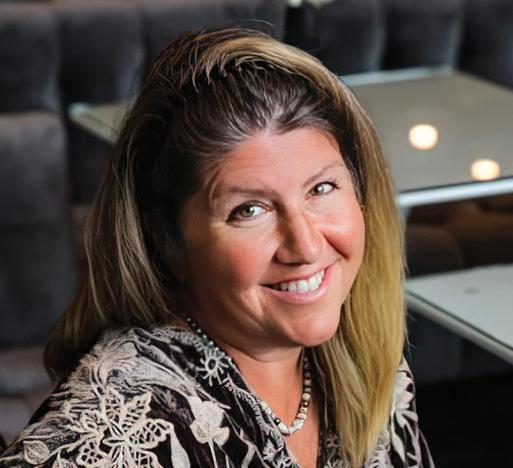

SPONSORED SECTION 12 BUSINESS NORTH CAROLINA
This is the twenty-sixth in a series of informative monthly articles for North Carolina businesses from PNC in collaboration with BUSINESS NORTH CAROLINA magazine.
Jill Marcus
Kristi D. Tally
“My entrepreneurship story started and continues in my Southgate/Southeast Raleigh neighborhood because my business is designed to address needs that I see in my own community,” says Tally, who founded KD7 Enterprises, a community engagement and education consulting company, in 2014. Her tenure as a business owner followed a career as an eighth-grade science teacher in the Wake County Public School System, service in education policy for the North Carolina state government and a series of consulting engagements for education-oriented projects. “The work I do to advocate for those in my community can be replicated and applied within other communities facing similar challenges – from improving access to affordable housing, to sharing information on elections and voting.”
Although local needs form the impetus for Tally’s business, her impact extends far beyond her 27610 zip code and even the United States. One of her earliest consulting engagements, for example, entailed developing science education materials for educators in the Republic of Benin in West Africa, in connection with a partnership between Saint Augustine’s University and the country.
While their entrepreneurship journeys and ventures are inherently different, Marcus and Tally share an appreciation for opportunities to connect with entrepreneurs. “The concept for my restaurant group and catering business is all about bringing people from diverse backgrounds to the table,” says Marcus. “That’s exactly what the PNC Bank + Coralus Collective does
by fostering a community where women business owners can share and benefit from ideas and encouragement.”

PRO TIPS
In their combined decades of business ownership, Marcus and Tally have amassed a lifetime of learnings that they generously share with aspiring women entrepreneurs. “First of all, pay yourself,” says Marcus. “And remember that family comes first. Even though I sometimes refer to my business as my child, there are special moments with my children that I’ve missed – an important soccer goal, for example – that I can never get back.”
Tally has found that daily affirmations help keep her focused and moving forward. “Positive affirmations serve as inspiration,” says Tally. ”These, along with my business and personal goals outlined every day, give me the fuel to continue growing my company. While receiving affirmation from others is welcomed and appreciated, it’s important to not become solely dependent on that validation.”
Finding sources of joy beyond the scope of building and running a business has been crucial to achieving balance for Tally, and she shares this advice broadly: “Commit to spending time exploring that joy – whether it be remaining spiritually connected, spending time with family, volunteering or learning a new skill – on a weekly or daily basis. Finding that joy spurs creativity, which in turn feeds success.”
For more information about PNC’s collaboration with Coralus, including the PNC Bank + Coralus Collective, and how PNC is supporting women financial decision makers, please visit www.pnc.com/women
Any views expressed herein are subject to change without notice due to market conditions and other factors.
PNC Bank and Project 257 are registered marks of The PNC Financial Services Group, Inc. (“PNC”).

13 JUNE 2023 REGIONAL PRESIDENTS: Weston Andress, Western Carolinas: (704) 643-5581 Jim Hansen, Eastern Carolinas: (919)
©2023 The PNC Financial Services Group, Inc. All
835-0135 This article was prepared for general information purposes only and is not intended as legal, tax, accounting or financial advice, or recommendations to buy or sell securities or to engage in any specific transactions, and does not purport to be comprehensive. Under no circumstances should any information contained herein be used or considered as an offer or a solicitation of an offer to participate in any particular transaction or strategy. Any reliance upon this information is solely and exclusively at your own risk. Please consult your own counsel, accountant or other adviser regarding your specific situation.
PNC,
rights reserved.
FOOD FIGHT

 By Edward Martin
By Edward Martin
In the foothills behind the gates of a gray, steaming plant in Wilkesboro, hundreds of Tyson Foods employees slaughter and package chickens around the clock. Cattycornered across the state, Rose Hillbased House of Raeford daily sends tons of turkeys and broilers to tables. Here, tourists visit the world’s largest skillet, able to sizzle 360 fryers at one time.
In Mount Olive, Butterball’s plant with more than 3,000 workers is as large as a shopping mall. It is eclipsed by Smith eld Foods’ 4,500-worker plant in Tar Heel in Bladen County. ey are the biggest of their respective elds, anywhere.
ose are prime examples of North Carolina’s meatpacking industry, says Robert Ford, executive director of the N.C. Poultry Foundation, which represents more than 5,000 turkey and chicken producers. Poultry pumps $40 billion a year into the state, and pork adds $10 billion.

“When it comes to meat, we’re one of the biggest producers in the United States,” adds N.C. State Agricultural & Technical University economist Kathleen Liang in Greensboro.




By year end, that industry is expected to be locked in a historic courtroom battle in Chicago, following a decade of mostly under-the-radar legal wrangling. Soon to explode into public view are accusations that the industry’s major players manipulated prices and violated the Sherman Antitrust Act. Critics and court documents portray the companies that feed America as a secrecy-driven cartel.
e plainti s alleging they were harmed by the meatpackers include retailing giants Kroger, Walmart and Aldi; food distributor kingpin Sysco; and restaurant groups such as Chickl-A and Sonic. Giant meat processors have engaged in antitrust violations for years, they claim, colluding to drive up consumer prices and their pro ts by various measures, including agreeing to limit how much meat they sent to market.
e defendants deny the accusations. “[Plainti s] claim over a 13-year or longer period, the companies got together and restricted volume so prices would increase,” says Henry Jones, an attorney at Raleigh’s Jordan Price law rm who represents House of Raeford and the N.C. poultry group. “We’re talking about 18 to 20 di erent parties that are all in competition with each other. at’s pretty ridiculous, but that’s the industry side of it.” Adds Ford, “It’s above my pay grade, but it looks like they’re beating a dead horse.”
O cials of several other companies named in the lawsuits declined to comment publicly ahead of trials scheduled for this fall in federal court in Illinois. House of Raeford’s case, now in its seventh year, may be heard as early as September, Jones says.
Virtually all of the state’s major meat producers are either named in the lawsuits, or have been cited in similar legal lings in recent years. at includes Cargill subsidiary Sanderson Farms, which has processing plants capable of processing 2.6 million chickens a week in St. Paul and Kinston; Mountaire Farms, which employs an estimated 1,800 in Siler City; Butterball,
14 BUSINESS NORTH CAROLINA NC TREND ›››
Litigation
14 Litigation 16 Entrepreneurs 18 Tourism 19 Banking 20 Public affairs 22 Statewide
Charges of antitrust violations sets up a courtroom battle between major protein producers and retailers.
which is headquartered in Garner and 51% owned by Kansasbased Seaboard; and privately owned House of Raeford.
The Chicago-based jurist who’s hearing the cases has denied repeated efforts by turkey, chicken and pork processors to dismiss the lawsuits. U.S. Judge Virginia Kendall of the Northern Illinois District cites evidence of an alleged conspiracy beginning in 2009 in which Butterball and other companies secretly agreed to hold down production. “Prior to that,” she wrote, “turkey prices closely tracked the cost of feed, the primary input cost in turkey production.”
Kendall also cites research showing pork prices increased by 50% between 2008 and 2016, then leveled off at 25% higher than before.
Ag industry observers say stakes are high, befitting the massive size of companies on both sides of the dispute. Last October, Tyson Foods paid the state of Washington $10.5 million to settle a lawsuit accusing the largest U.S. chicken producer of fixing prices and rigging contracts with competitors. Over the past decade, it has paid more than $200 million in settlements.
Tyson, which has plants in Union and Wilkes counties, denies wrongdoing, while declining to comment. Officials of Butterball and Sanderson Farms also wouldn’t discuss the litigation.
“My client hasn’t settled,” adds Jones, referring to House of Raeford. “But particularly public companies that have to answer to shareholders are a different dynamic. They may figure the cost of settling is less than going to trial, appeals and so on.”
Much of the controversy centers on producers’ ties to the Fort Wayne, Indiana-based Agri Stats research company, which has a key role in the world of commodity pricing. Formed in 1985 and employing about 100 people, Agri Stats compiles data to provide commodity processors with market information, such as the price of animal feed, wages, wholesale prices and wage rates. It’s called benchmarking.
More than 90% of the meat-protein industry subscribes to Agri Stats monthly reports, which are largely based on data collected from industry players. Before the antitrust issues arose, the Sanderson Farms president said that his company checked its Agri Stats report “every workweek, on Monday morning,” to set the week’s production.

Agri Stats gathers information known only by codes, then disseminates the data to other subscribers. The controversy
circles on allegations that the information can be dissected to enable companies to understand what rivals are doing, then act accordingly. N.C. State’s Liang says the information is critical for the big processors. It’s why Agri Stats has been mentioned in more than 90 lawsuits over the issue.
“It’s all anonymous,” says the lawyer for a N.C. meat company client. “Anybody who’s a subscriber has an oath of private confidentiality and cannot disclose the code. That cannot be deanonymized. You can’t see what the other plants are doing.”
Some disgruntled former Agri Stats employees disagree, noting that astute subscribers can easily decipher the codes. In some cases, they have visited competitors’ plants, the company’s critics say.
Once the major processors gained a clearer understanding of market conditions, plaintiffs allege that the companies worked together to manipulate industry price indices. In some cases, the producers used texts and phone calls to coordinate bids for major buyers such as the fast-food chains that sell millions of chicken sandwiches.
Agri Stats declined requests for an interview. It has denied wrongdoing and defended its operations in court. Others note that companies can collect similar information from state and federal agriculture departments through public, daily reports. On a recent weekday, the North Carolina report noted, the “estimated [hog] slaughter for Tuesday” is 3.62 million head compared with 3.55 million a week earlier. It included the average weights of hogs, and other information.
N.C. Agriculture Commissioner Steve Troxler won’t comment directly on the litigation. But he is wary of any result that would hurt the ag industry. “At a time when food insecurity is a growing global issue and when the United Nations anticipates the need to increase food production by 75% by 2050 just to meet demand, we would be concerned with anything that damages our farmers’ ability to produce food.”
Troxler says increasing criticism of “Big Ag” — namely, the increasingly consolidated food production industry — overlooks the critical role of hundreds of individual farmers in the state raising hogs, chickens and turkeys under contracts with those companies. COVID-19 illustrated the importance of those farmers with many products in short supply, “but that seems to have been quickly forgotten.” ■
15 JUNE 2023
GRANDBETTY’S POPULAR PENNIES
By Cathy Martin
Running a commercial bakery was far from Becca Wright’s mind when she enrolled in the MBA program at UNC Chapel Hill in 2019.

But the idea for Piedmont Pennies had been baking since 2016, when the Burlington native drew up an unofficial business plan after sharing the crunchy, cheesy snacks — based on a cherished family recipe — as holiday gifts. At the time, she was working for Deloitte Consulting in Washington, D.C.

“I made Pennies in my Dupont Circle row house for my clients,” Wright says. Impressed, they asked, “Where did you get these? Did you buy them at Whole Foods?”
Soon after, the Carolina grad returned to Chapel Hill to pursue her MBA, with concentrations in entrepreneurship and venture capital. When COVID-19 derailed plans for an in-person internship at Facebook (now Meta) in Menlo Park, California, the idea of turning Piedmont Pennies into a bona fide business returned.


“I had so much free time at home, and I was working on the Instagram [account for Piedmont Pennies] behind the scenes,” Wright says. After completing her virtual internship for the social-media behemoth and mulling a full-time job offer, she launched the brand online in September 2020, renting a commercial kitchen in Chapel Hill.
With the holiday season approaching, the business exploded. “I had my MBA friends in there hand-pinching Pennies from 8 p.m. to 2 a.m. People were shipping them as
gifts, because no one was buying stuff in person,” says Wright. With momentum for the brand building, she declined the Facebook offer and decided to make Piedmont Pennies her full-time occupation. “I thought, I just really want to try this. If I’m going to do it, it’s going to be now,” she says. She moved to the Queen City in December 2020 with her husband, Coble, a Charlotte native.
Cheese straws, or pennies, are a holiday staple in many Southern households. Wright’s gourmet version is based on her late grandmother’s recipe, tweaked by her father after her “Grandbetty,” who lived in Rocky Mount, developed arthritis and could no longer “pinch” pennies. The flour is milled by Lindley Mills in Alamance County, where Wright grew up, and the cartons are made in Charlotte.
A $50,000 grant in December 2021 from NC IDEA, a Durham-based private foundation that assists entrepreneurs, helped propel the brand
16 BUSINESS NORTH CAROLINA NC TREND ›››
Entrepreneurs
PHOTO CREDIT:
KOLO
AMY
Piedmont Pennies got a boost from the NC IDEA foundation that supports early stage entrepreneurs.
Cheese please! Becca Wright turns a family recipe into a burgeoning gourmet snack.
further. Today, Piedmont Pennies has five employees, and its products are on shelves in about 300 stores in 25 states. Priced at $15 for a 12-ounce carton, the snacks are better suited for entertaining and gifting than everyday snacking. They are also popular as wedding favors and corporate gifts.
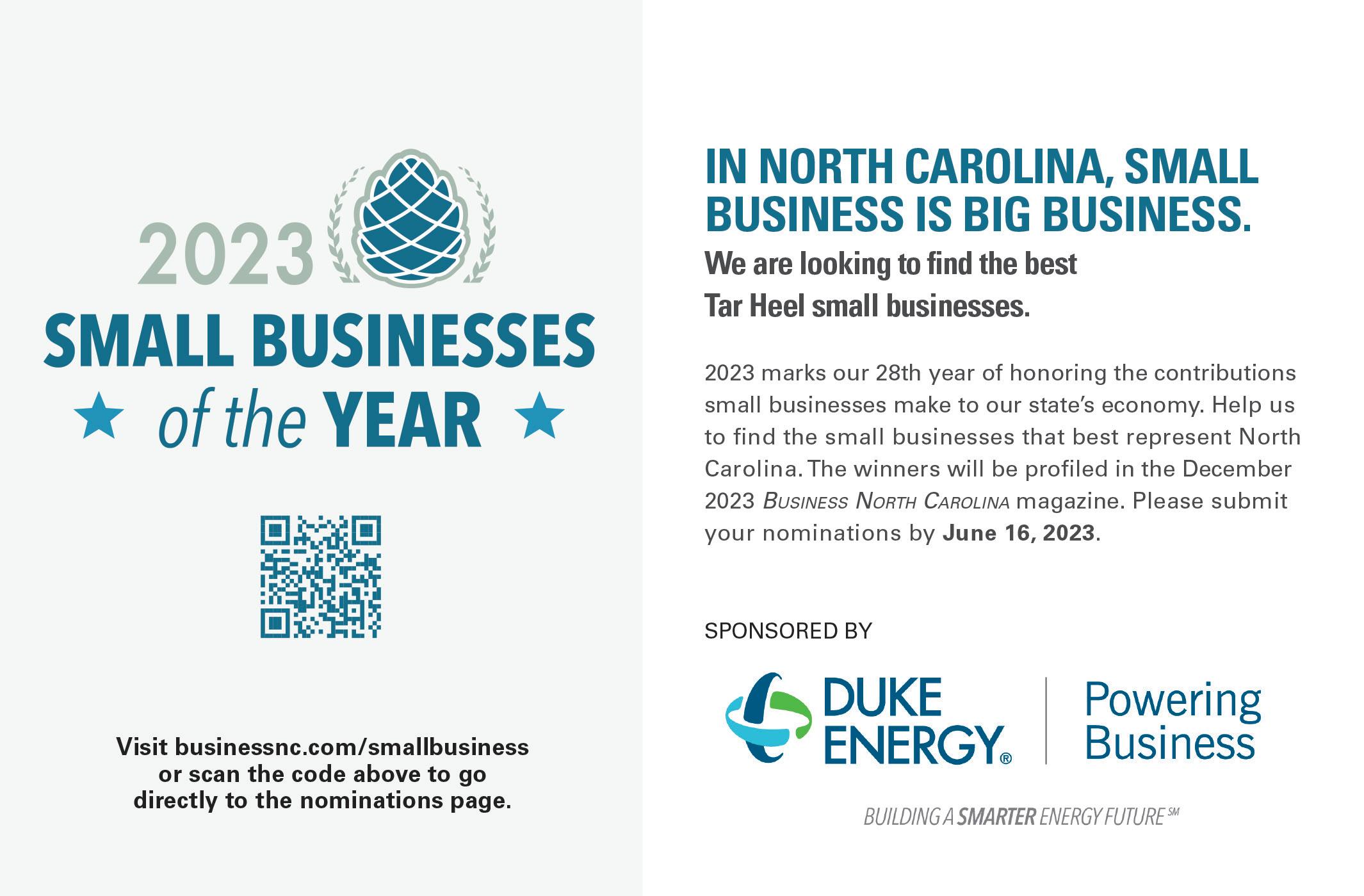
Trusting others with her beloved family recipe has been one of the biggest challenges, Wright says. Being patient while the business grows is another. While Wright spends plenty of time darting around trade shows and promoting the brand (she was on “Good Morning America” last September), she’s also a regular at Piedmont Pennies’ west Charlotte kitchen. “I’ll go in and put on an apron and help package,” Wright says. “But that keeps you humble and close to the product.”

Pennies are available in two varieties, the original with a mildly spicy “Carolina kick” and a more fiery spicy chipotle. New products and flavors are in the works, says Wright. She attributes her work ethic to her family — her mom and dad, a retired radiologist, have supported her from the start, helping fill orders and make deliveries during busy surges.
“I think there’s a lot of entrepreneurial spirit in my family, and a lot of grit, creativity, optimism — all the things that help you, at least in the first couple years of starting a company,” Wright says. “Humble, but hungry.” ■
17 JUNE 2023
Wright worked at Deloitte before starting her snack business.
BAY WATCH
 By Kathy Blake
By Kathy Blake
Sounds of ocean waves crashing on the sand of Atlantic Beach can be heard by Coral Bay Club members swimming in the zero-entry pool. Nearby, certi ed personal trainers lead exercise classes and tennis professionals o er instruction on clay courts. Members dock boats on the Bogue Sound-side of the oceanfront property in Carteret County.
Depending on their tastes, members can enjoy ne dining options inside the Ocean Room, or more casual meals at the Sandbar. Indoor and outdoor bars serve drinks to t any mood. Year-round social events range from dinner dances to holiday brunches. Fourth of July reworks are the “most spectacular on the island.” e exclusive club started in 1958 has a membership of about 625 members from across North Carolina, a power list that over the years has included Raleigh banker Frank Holding Jr., Glen Raven textile titan Allen Gant Jr. and former Sen. Leo Daughtry of Smith eld. Entry requires a referral from a current member.
Now, this coastal playground is preparing to add some shine to its glitz. As happens o en at private clubs, the price tag for renovations is causing some members to question the cost.
O cials wouldn’t provide nancial details on the renovation plan, but the project is expected to cost about $20 million with an assessment of at least $13,500 per household, according to people familiar with the matter. A membership entails an upfront cost of $33,000 with annual dues of $3,000, they add. at’s less than North Carolina’s elite country clubs, where initiation fees of $80,000-plus and monthly fees of $750 or more are common, as are lengthy waiting lists of potential members. But Coral Bay doesn’t have a golf course to maintain.
“It’s not an upgrade. It’s a scrape and rebuild,” says one longtime club member.” ey’re going to demolish 100% of the entire club and build a new club. … I’m not happy about it. I think they’re rushing into it. But they have the power. You either pay it, or you quit.” at appears to be a minority view, however. “We have a facility with fabulous members, and we have the opportunity to provide them with the nest club on the East Coast,” another member says. e club’s board is unanimous in its support for the renovation, he adds.
‘GOING TO BE INCREDIBLE’


Atlantic Beach is part of a barrier island with 1,300 year-round residents, connected by a bridge to Morehead City and North Carolina’s mainland. Its charm rests in public beaches and natural beauty, although its location makes it susceptible to damaging storms.


Decisions to dress stu up amid record prices for beach property are commonplace at the coast. ree other beach and country clubs in Carteret County have seen recent upgrades.
e billionaire Wordsworth family of Rocky Mount bought the Crystal Coast Country Club on Bogue Sound a er Hurricane Florence in 2018 caused major damage in the area. e new owners made a “massive investment,” according to the club’s website. e oceanfront Dunes Club, established in 1939 and owned by its 425 members, underwent clubhouse renovations four years ago. Across the bridge, the Morehead City Country Club has renovated its golf course and pool in recent years, and is adding a 30,000-square-foot clubhouse.
Coral Bay’s improvements are scheduled to start a er summer’s traditional Labor Day ending. Kersting Architecture of Wilmington and Greensboro-based Samet Corp. were hired to lead the clubhouse overhaul. e pool and beach areas will remain open.
e new building “will be tens of thousands of square feet,” a member says. “It will be completely restructured, which encompasses all the items that would be in a clubhouse, and it will be able to withstand the weather there.”
Previous renovations have never really accommodated the beach environment, he adds. “We have been working for three years to design the best club on the East Coast. It has been incredibly well-received by our membership.
“If you come to Coral Bay, it’s going to be incredible. Just imagine the nest possible club.” ■
18 BUSINESS NORTH CAROLINA NC TREND ›››
Both members asked that their names not be used. Private clubs prize privacy, a er all.
Tourism
An elite coastal beach club preps to become the East Coast’s “finest.”
FAIR FOR ONE, FAIR FOR ALL
Insuring all bank deposits is needed to avoid further industry turmoil, a veteran economist opines.
By Tucker Mitchell
Whatever one terms the turmoil in U.S. banking, Harry Davis says he’s got the remedy: Guarantee all bank deposits.
It shouldn’t matter if those deposits are at the smallest local bank or the four giant mega-banks, says Davis, a nance professor at Appalachian State University for more than 40 years and longtime economist for the N.C. Bankers Association. e Federal Deposit Insurance Corp. needs to make clear that all the $17.8 trillion in domestic deposits are safe.
Until then, Davis expects investor con dence in the U.S. banking system will remain jittery and more money will ow to the four “too big to fail” giants: JPMorgan Chase, Bank of America, Citigroup and Wells Fargo. He says that’s unfair.
e issue mounted a er the March-April failures of Silicon Valley Bank, Signature Bank and First Republic Bank, three of the 30 largest U.S. lenders, and the KBW Nasdaq Regional Banking Index sunk in early May to its lowest level since 2016 (excluding the COVID-19 panic in early 2020.)
e Federal Reserve stepped in to make depositors whole at the three failed banks and, by extension, to buck up con dence. Only investors and senior bank executives felt any real sting.
“ e feds did the right thing,” says Davis. “ ey stepped in and guaranteed everything, and no one lost a dime of their deposit. And no one is going to lose a deposit, not next year, not for the next 100 years.
“If you’re going to save the depositors at (Silicon Valley Bank) and First Republic, then you can’t turn around and not do it for the bank across the street,” he adds. “Everyone knows this. I know it. e Fed knows it. e bag boy at the grocery store knows it.”
e problem is that it’s not written down in the law, Davis says. “So what we need is some clarity.”
Insuring all deposits would be costly to the 4,700 banks that pay for the FDIC’s Deposit Insurance Fund. Covering all domestic deposits would mean increasing the fund from $125.5 billion to $240 billion. at equates to a 1.35% reserve ratio. Many bankers oppose higher fees, Davis says.
e recent bank failures followed depositor runs due to a toxic mix of rapidly rising interest rates that devalued assets and a high percentage of uninsured deposits. At Signature and Silicon Valley, the percentage of uninsured deposits topped 90%. Sixtyeight percent of First Republic’s deposits were uninsured.
e FDIC insures deposit accounts up to $250,000 each.






e insurance amount is 100 times what it was at the agency’s inception in 1933, but it hasn’t kept pace with the nation’s wealth. Uninsured deposits peaked at 46.6% of deposits in 2021.”
As problems at individual banks emerged, depositors with uninsured accounts pulled money out. at panic was aided by mobile banking and fueled by social media. “I think Silicon Valley (Bank) was basically tweeted out of existence,” says Davis.
Changing the deposit insurance law would require an act of Congress, and several lawmakers have called for new limits, including $1 million per account. e FDIC issued a May white paper that lists three options: increasing the current limit, raising the limit on corporate accounts, or adopting unlimited coverage.
“Put it at $1 million, $2 million, $5 million. It really doesn’t matter,” Davis says. “It wouldn’t have stopped what just happened and it doesn’t make any di erence. We know the Fed is going to guarantee all depositors.”

Unlimited coverage has its pitfalls, critics argue. It might lead to greater risk-taking and a ect competing deposit instruments, including treasury bills and bonds.
Alas, the professor doubts his idea will prevail in Congress. “More likely is they’ll raise the limit again and hope it all works out all right.” ■

NC TREND ››› Banking
19 JUNE 2023
TRIBUNE NORTH CAROLINA INDEPENDENT INTELLIGENT INFORMATIVE




Our paid daily newsletter provides detailed interviews with key lawmakers, Q&As with other political leaders and lots of stories tracking daily happenings at the state legislature during the current session. Here’s some of what you missed. Sign up today at nctribune.com.
STATE WORKING ON OFFSHORE WIND STRATEGY
LEVELING THE PLAYING FIELD

Some North Carolina charter schools are dominating in athletics, and those wins have sparked envy.
Because charter school enrollment isn’t bound by district lines, charters draw students from larger pools than traditional high schools. That gives some an advantage to build powerhouse teams.
Until recently, the solution most often floated has involved having charters “play up” a level, meaning a 1A charter would play at the 2A level and so on. A new rule being considered by state lawmakers would require charters to play at the same level as the traditional high school that “the largest percentage” of its students would otherwise have attended.
The potential effect of the percentage idea is that a small charter that draws most of its students from a large, 4A high school would have to play 4A ball, says Rep. Ashton Wheeler Clemmons, D-Guilford.
Some say the potential mismatches could wreck charter-school athletic programs and in the process also threaten their schools’ market appeal. Of course, that’s the flip side of the argument traditional-school ADs and coaches have been making.
RECRUITING SUCCESS
A bill that would impose a 10-year moratorium on o shore wind energy projects o North Carolina’s coast will not become law this year. A Department of Commerce task force meeting hinted at possible reasons.

One is that if the industry gets o the ground — or, rather, on the water — there are potentially a lot of jobs that might come the state’s way.
Project managers are going to have to create a lot of supply chains from the ground up, which will mean work for a broad set of trades, Maynard Smith, the Maryland business development manager for US Wind, told members of N.C. Taskforce for O shore Wind Economic Resource Strategies.
His presentation included a slide pointing out that as projects reach the construction phase, there’ll be work for everyone from machinists and welders to whoever’s driving the truck that delivers the port-a-potties.
O the North Carolina coast, the project furthest along is one by Kitty Hawk North, although the company suggests it’ll be at least 2025 before it gets the green light.
MAKES NEW TARGETS HARDER TO HIT
e state’s economic-development e ort is going to need a strong last eight months of the year to make good on its “very aggressive” targets, one of its top recruiters says. rough the rst four months of 2023, the state had notched “27 recruitment and expansion wins” in its Tier 1 and Tier 2 counties, said Christopher Chung, CEO of the Economic Development Partnership of North Carolina.
But “where we’d like to be is 40 wins,” to meet a benchmark set by averaging performance over the last three years and adding to that a growth factor, Chung told members of the Economic Development Accountability and Standards Committee, an
oversight group.
Similarly, the January-to-April wins promise more than 3,400 jobs, and involve capital investments “at an announced $1.5 billion and change,” Chung said.
But the state's targets would have translated into goals of about 8,600 jobs and $3.1 billion, respectively.
One reason the targets are high is because of the state’s past recruiting successes, Chung said.
He was alluding to prior-year announcements like the VinFast auto plant in Chatham County, which promised 7,500 jobs and about $2 billion in company investment. ■
20 BUSINESS NORTH CAROLINA NC TREND ›››
Public affairs
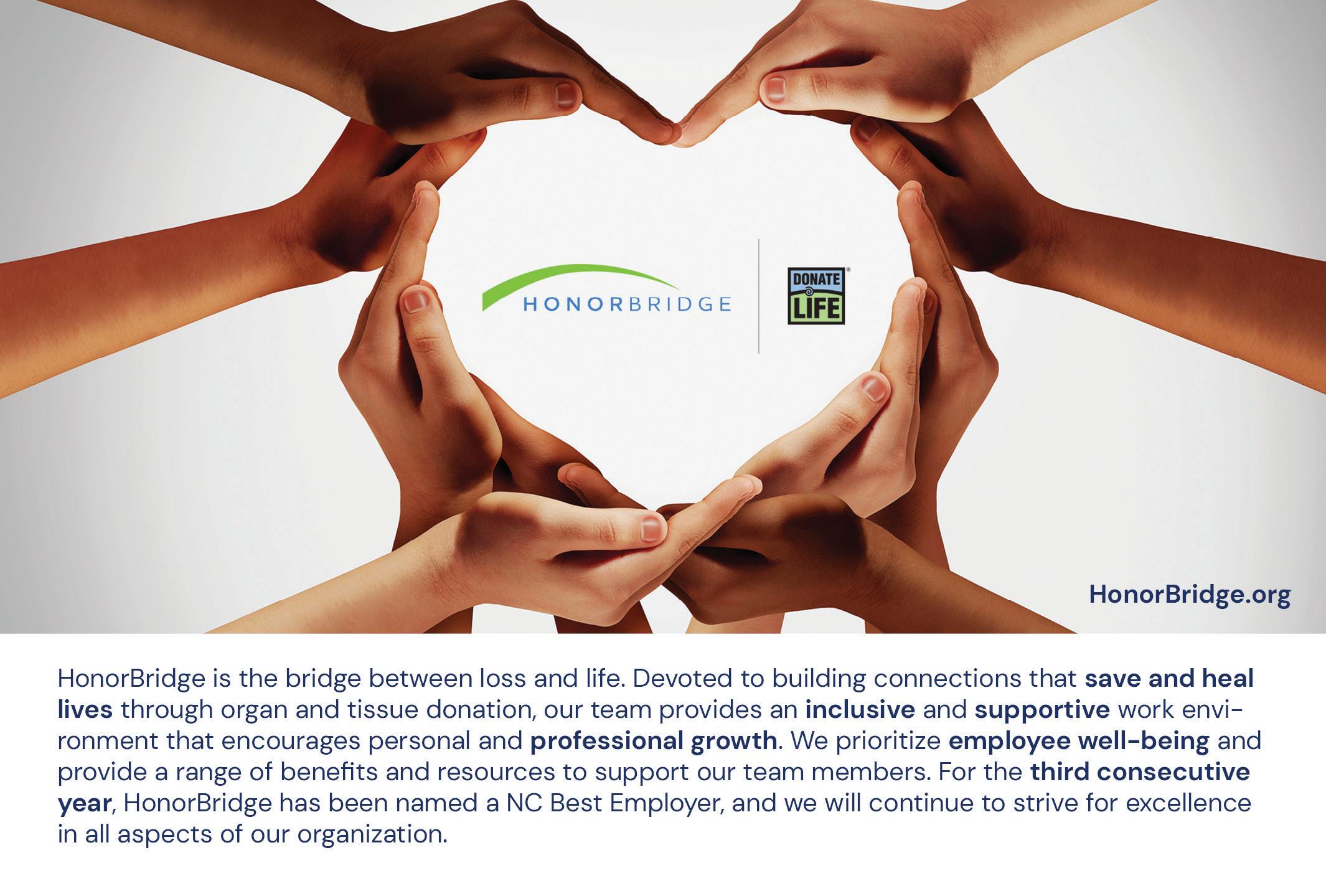

21 JUNE 2023
CHARLOTTE
CHARLOTTE
Driven Brands CFO Tiffany Mason exited the automotive services company without explanation. The firm appointed Cardtronics alum Gary Ferrera to the post effective May 10.
The Carolina Panthers made Bryce Young the new face of the franchise by making the former Alabama quarterback the No. 1 pick of the NFL Draft. The Panthers got the top pick in a trade with the Chicago Bears.
CORNELIUS
Almost 60 workers at FXI will lose their jobs when the foam manufacturer closes in June. Formerly known as Foamex, the plant has been in operation for more than 26 years. FXI has owned the 48-acre site since 1990.

City Council is considering contributing $600 million for a $1.2 billion renovation of Bank of America Stadium in private talks with Carolina Panthers owner Tepper Sports & Entertainment, according to media reports. Mayor Vi Lyles said disclosure of the talks hurts the city’s ability to negotiate.

Beacon Partners and Crescent Communities purchased 138 acres for $18 million for Rapid Commerce Park in western Mecklenburg County. The project is expected to include nearly 1.8 million square feet of industrial space.
Fiber communications provider Brightspeed received $500 million in funding from Mubadala Investment, Abu Dhabi’s sovereign fund. It became a minority shareholder.

Private investment firm Kian Capital raised $400 million in its third fund to invest in lower middle-market companies. Its previous funds totaled $150 million in 2013 and $250 million in 2018.
SPX Technologies expanded its electrical heating business with the $418 million purchase of ASPEQ Heating Group. The seller was Industrial Growth Partners, a San Francisco-based private equity firm.



HUNTERSVILLE

Atom Power plans to add 205 jobs and invest $4.2 million in a Mecklenburg County plant that makes charging systems for electric vehicles. The state offered $1.2 million incentives tied to meeting job and investment targets. Atom Power received $100 million from Korea’s SK last year.


22 BUSINESS NORTH CAROLINA NC TREND ››› Statewide
KANNAPOLIS
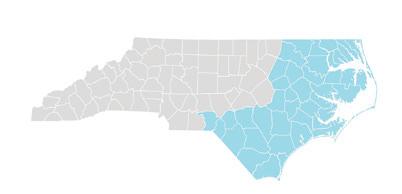
Dallas-based developer Trammell Crow completed construction of Metro63 Logistics Center, a 755,996-squarefoot industrial building. The developer announced its plans to develop the project in 2021.
MOUNT HOLLY
Gold Bond Building Products invested $90 million to expand its Mount Holly facility, which will add about 11 jobs and retain 100 existing ones. The subsidiary of Charlotte-based National Gypsum produces gypsum wall board and other products. Enhancements include a rail line, which will allow shipments by train rather than truck.

EAST
GOLDSBORO
Minnesota-based Select Genetics created 26 jobs and invested $58 million at a new turkey egg hatchery and establish turkey farms in Goldsboro. The jobs will have a potential annual payroll impact of more than $1.1 million for the region.

GREENVILLE
Van and Jennifer Isley, of Raleigh, gifted $5 million to East Carolina University’s Pirates Unite Campaign. The gift is the largest one-time philanthropic gift in the booster club’s 61-year history. Van Isley is an ECU trustee who founded Professional Builders Supply in 2003.

WILMINGTON
A vacant, waterfront property of less than an acre downtown sold for $6 million. The buyer, Northern Ventures, has not revealed development plans. The property fronts the Cape Fear River. The property previously housed a Wachovia bank branch that was demolished in 2008.
Off the northern Outer Banks, the Kitty Hawk Wind Energy Area project is being developed by Connecticut-based Avangrid The area is about 200 square miles and the project is expected to eventually power as many as 1 million homes, according to Avangrid.

RICHLANDS
Design work for a runway extension at Albert J. Ellis Airport started. It’s part of a $29 million state Department of Transportation project approved last year. The Federal Aviation Administration is doing an environment assessment of the project.
Food Lion remodeled two-dozen stores in southeastern North Carolina, showing off new features, services and expanded inventory. The Salisbury-based company’s $50 million-plus investment includes remodeling and expanded pickup and/or home delivery options.

23 JUNE 2023
KITTY HAWK
TRIAD
GREENSBORO
TAT Piedmont Aviation, a maintenance and repair company, expanded its airportarea operations with an 85-job, $12.8 million project. The jobs have an average annual wage of $51,706.

Vecoplan, which makes industrial shredding equipment, will create 33 jobs and invest $6.75 million at a new facility. The company manufactures industrial shredding, grinding, and recycling machines for various markets including waste management, wood and plastics and document shredding.

lines. The jobs would have an average annual wage of $55,647 and will be created by Dec. 31, 2024. The expansion bolsters Avgol’s overall workforce to at least 312 people.
MOUNT AIRY
Bluefield, Virginia-based First Community Bancshares acquired Surrey Bancorp for $113.2 million. The sale leaves Oak Ridge Financial Services and Piedmont Federal Savings Bank as the remaining investorowned community banking companies headquartered in the Piedmont Triad.
WINSTON-SALEM
Tanger Factory Outlets reported a 14.9% increase in first-quarter net income to $23.3 million. First-quarter revenue was flat at $108.9 million. The company sold its Blowing Rock property in December, so its only North Carolina center is in Mebane.

MOCKSVILLE
Avgol Americas plans to create 52 jobs and spend $100 million in capital investments with additional production
A sales slump in North America and China caused a 70% decline, to $29.3 million, in first quarter earnings at Herbalife. Revenue declined to $1.25 billion versus $1.34 billion a year earlier.
Advertising agency The Variable acquired Data Crunch, an applied AI and advanced analytics company headquartered in Raleigh. Data Crunch works with brands including Deloitte, American Express and USAA. The Variable clients include NAPA Auto Parts, P&G, and Frigidaire.
An annual report presented to the Winston-Salem City Council shows minority and women-owned business enterprises received 5.3% of dollars spent by the city last year. That’s the lowest percentage in seven years. M/WBEs make up about 35% of available vendors.
GREENSBORO
British American Tobacco, the parent company of Reynolds American, agreed to pay a $508.6 million civil penalty to settle “apparent (U.S.) violations of sanctions against North Korea and weapons of mass destruction proliferators.” The civil settlement is with the U.S. Treasury Department’s Office of Foreign Assets Control.
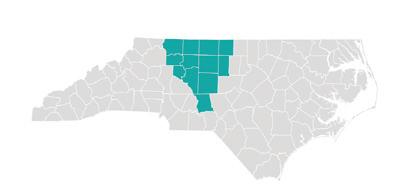
24 BUSINESS NORTH CAROLINA NC TREND ››› Statewide
HIGH POINT
Marshall Aerospace, the United Kingdom’s largest privately held aerospace and defense business, will invest $50 million and create 243 jobs at a maintenance and engineering facility at the Piedmont Triad Airport.
TRIANGLE
e-Emphasys Technologies merged with CDK Global Heavy Equipment, the heavy equipment business of Illinoisbased CDK Global. The combined 700-person company will operate under the e-Emphasys name. Terms of the deal were not disclosed.

CARY

SAS Institute CEO Jim Goodnight said the company will invest $1 billion in artificial intelligence initiatives over the next three years. The company already has a big footprint in advanced analytics and AI through its SAS Viya product suite.


25 JUNE 2023
CARY
CHAPEL HILL
Charlotte-based Grubb Properties received approval from Town Council for a seven-story apartment development on the corner of East Rosemary and Columbia streets. e project will replace the former PNC Bank site with 150 units, with retail space on the ground oor.
DURHAM
Shutter y is closing its Spoon ower production facility two years a er it acquired the company for $225 million. e move impacts 108 employees, though they will be “eligible for rehire by Shutter y and its a liated companies,” said the company in an o cial notice to the state. Spoon ower moved into the 110,000-square-foot space in 2021.

As it plans a natural-gas plant in Texas costing an estimated $950 million, NET Power has secured $275 million in capital for its proposed merger with Rice Acquisition. e Rice family and energy giant Occidental are key NET Power backers. e company says its market capitalization tops $2 billion.

A trio of executives at Duke Regional Hospital — Chief Financial O cer
Jonathan Hoy, Chief Nursing O cer
Vicky Orto and Chief Operating O cer
Mitch Babb — stepped down following a review of the hospital’s performance. Duke Health ended its 2022 scal year with an operating loss of $151.4 million, according to Fitch Ratings.
Employees at a local REI store led a petition for a union election, joining similar e orts at stores in Boston, Chicago and Eugene, Oregon. e retail chain carries gear, apparel and footwear for outdoor and tness activities.
MORRISVILLE
Syneos Health, a biopharmaceutical solutions organization, agreed to be bought for $7.1 billion by a consortium composed of Elliott Investment Management, Patient Square Capital, and Veritas Capital. ey are paying $43 per share for the company, which formed in the merger of INC Research and inVentiv Health.
PINEHURST
Moore County native Alexander “Sandy” Stewart was named president of Sandhills Community College. He succeeds John Dempsey, who had the job for 33 years. Stewart is assistant commissioner at the N.C. Department of Agriculture and Consumer Services. His family has owned a Moore County farm for nearly 250 years.
RALEIGH
Wilkes Community College President Je Cox was named president of the North Carolina Community College System. e system’s 58-college system enrolls nearly 600,000 students annually. Cox had been president of Wilkes Community College since 2014.

Next Century Spirits raised nearly $2 million in capital, including investment by comedian Seth MacFarlane, creator of the “Family Guy” television series. e spirits company has a production facility in Zebulon. It is chaired by Matthew Bronfman, grandson of the founder of the Seagram liquor rm.
Levitate, a so ware business formed by ShareFile founder Jesse Lipson, raised $13.75 million in a round led by Durhambased Bull City Ventures. e company has raised nearly $40 million since 2017. Other backers include Tippet Partners, Duke Capital Partners, Lipson and more than 60 entrepreneurs.
DURHAM
IBM’s Red Hat division is cutting hundreds of jobs in a series of layo s. Chief Executive O cer Matt Hicks shared the news with employees in an email. e so ware giant has some 2,200 employees based at its downtown headquarters and some 19,000 worldwide.
26 BUSINESS NORTH CAROLINA NC
››› Statewide
TREND
Houston developer Welcome Group started work on a 1.3 million-square-foot industrial park, Welcome Venture Park, that spans 160 acres. e industrial park will have buildings designed to attract industrial, ex and life sciences companies.
Bryn Pharma named Sandy Loreaux as CEO and raised $15 million from 82 investors as the company seeks FDA approval for its unique nasal spray. The company is creating a treatment for a life-threatening allergic reaction called anaphylaxis.
SANFORD
VinFast plans to turn a former automotive parts factory here into a training facility for its workforce, which is expected to reach 7,500 over the next decade. The Vietnamese-based automaker says it will start production in nearby Moncure in 2025 with plans for 150,000 vehicles per year.
WILSON
The 294-bed Wilson Medical Center named Christopher Munton as CEO. It’s part of Duke LifePoint Healthcare, a joint venture between Brentwood, Tenn.based LifePoint Health and Durhambased Duke Health. Munton has been CEO of Duke LifePoint’s Harris Regional and Swain Community hospitals in western North Carolina.


WEST
ASHEVILLE
County commissioners approved a oneyear moratorium on cryptocurrency mines. The pause is fueled by concerns as nearby towns face potential negative impacts, such as excessive energy use, e-waste, pollution and noise. Six commissioners voted unanimously to institute the moratorium.
Parsec Financial, one of the state’s biggest wealth management companies, was acquired by Modera Wealth Management of Westwood, N.J. The move adds $3.8 billion and six North Carolina offices to Modera, which now has $10.5 billion in assets.

Buncombe County Sheriff’s Office deputies began patrolling downtown Asheville alongside Asheville Police. The move follows Asheville Watchdog’s “Down Town” series of stories documenting concerns from businesses and residents about increasing crime, a depleted police force, and the challenges of a homeless population.
BOONE
George Shinn, who started the Charlotte Hornets NBA team in 1988, bought the renowned Cornerstone Christian
Bookstore. Shinn and his wife, Megan, are Linville residents who described the store as one of their favorites. It has been open for more than 40 years.
LINVILLE
A three-year repaving and rehabilitation project will involve road closures in a 75-mile section of the Blue Ridge Parkway from near Laurel Springs to the Grandfather Mountain vicinity. The $98 million project will be phased with a staggered series of closures. ■

27 JUNE 2023
DIVERSE PATHS TO GOOD CAREERS








Business North Carolina gathered a panel of education and business leaders at the James B. Hunt Jr. Library at N.C. State University to talk about how business impacts students’ education and career paths. From offering hands-on experiences to exposing students and parents to lesser known jobs to creative ways to fill workforce shortages, ideas, challenges and success stories swirled around the table.
Caterpillar and Duke Energy sponsored the discussion. It was moderated by Caroline Sullivan, executive director for the North Carolina Business Committee for Education. The conversation has been edited for brevity and clarity.
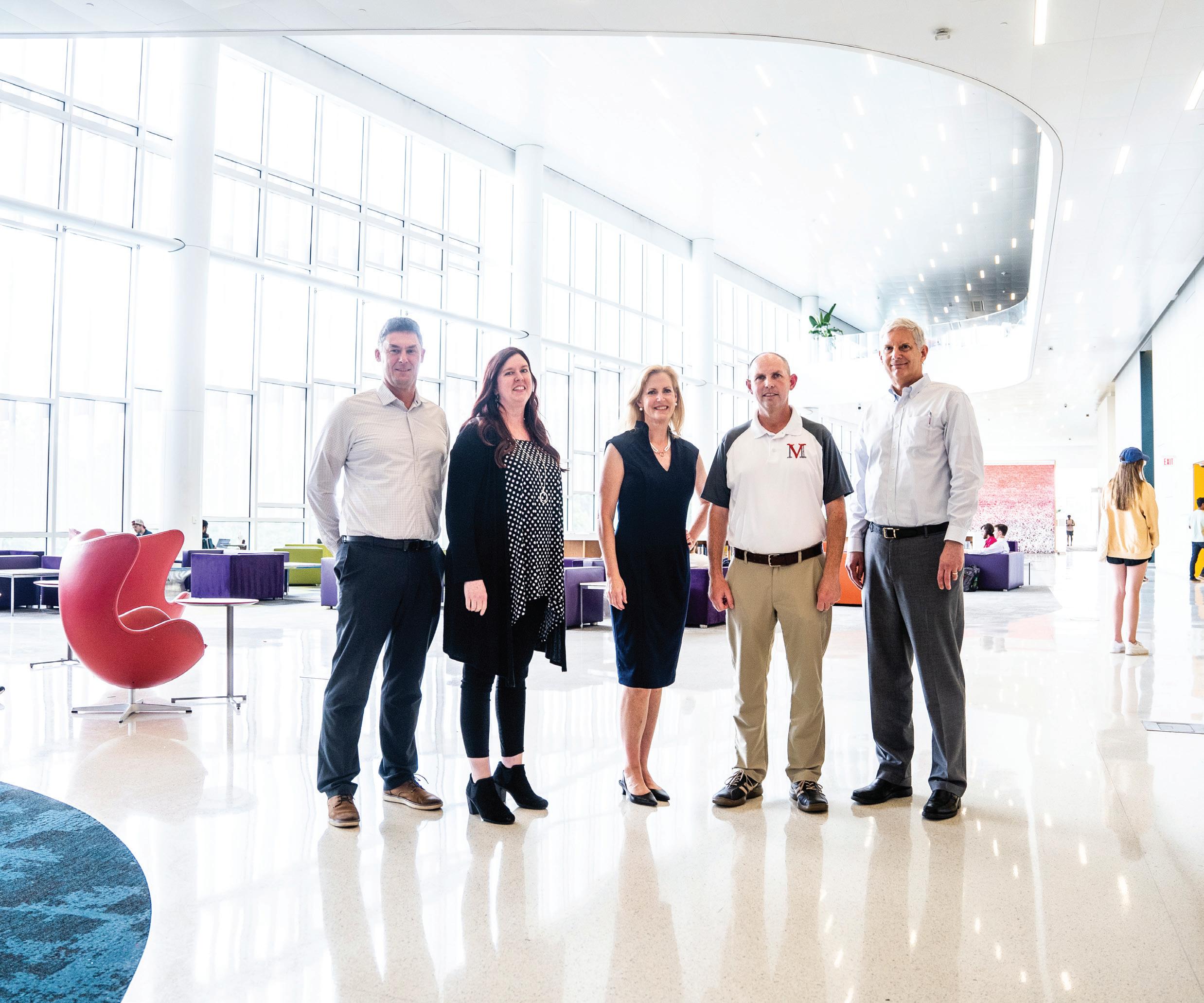
SPONSORED SECTION 28 BUSINESS NORTH CAROLINA
Photography by Bryan Regan
ROUND TABLE BUSINESS & EDUCATION
DAVE, CATERPILLAR HAS BEEN A LEADER IN HIGH QUALITY APPRENTICESHIP PROGRAMS FOR STUDENTS AS EARLY AS IN HIGH SCHOOL. CAN YOU TALK ABOUT WHY IT’S BENEFICIAL TO YOU?

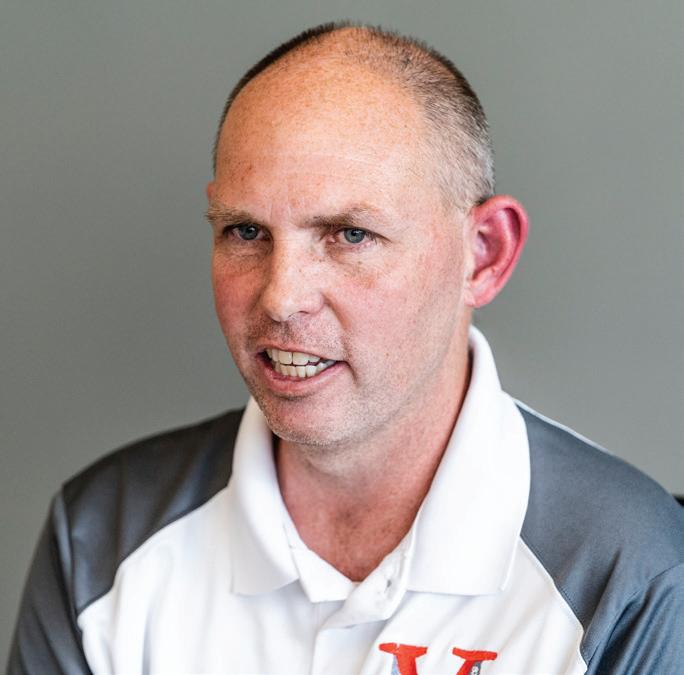
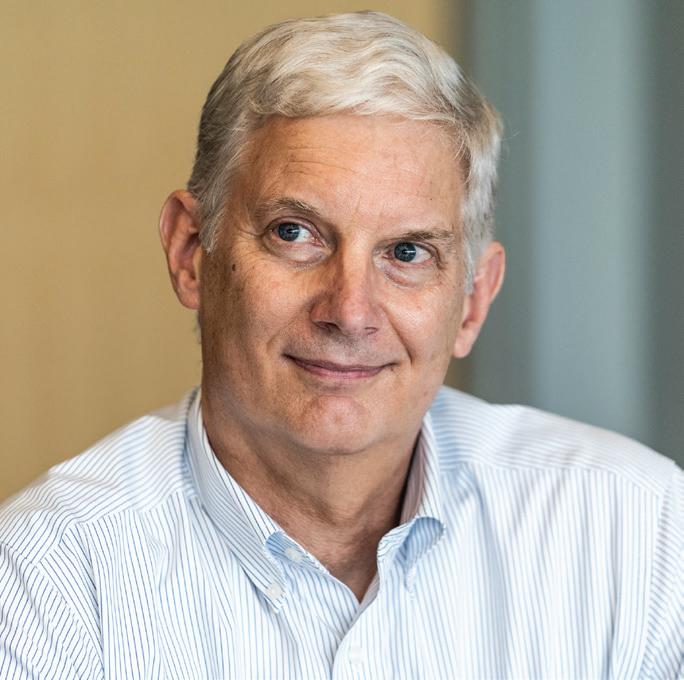
EMONSON: We employ over 2,000 people in manufacturing roles in Wake, Lee and Johnston counties. With community colleges and the local high schools, we have developed pre-apprentice programs where students are exposed to the jobs we offer, that can then lead to a full apprentice program. They go through the same training that we would offer full-time employees and
they do this while completing their studies. It’s been really successful.
These programs have been running for over 10 years, and in Sanford, where welding is a really important part of the skill set we have been very successful. Twenty-five percent of our current welding workforce in Sanford went through these apprentice programs, and 20% of these ex-apprentices are at our highest level of our welding program and are very well compensated for this critical skill set.
It is very difficult to hire people into manufacturing, so the more we can promote it, the better. As for having young people within a workplace, I was an apprentice in the UK at
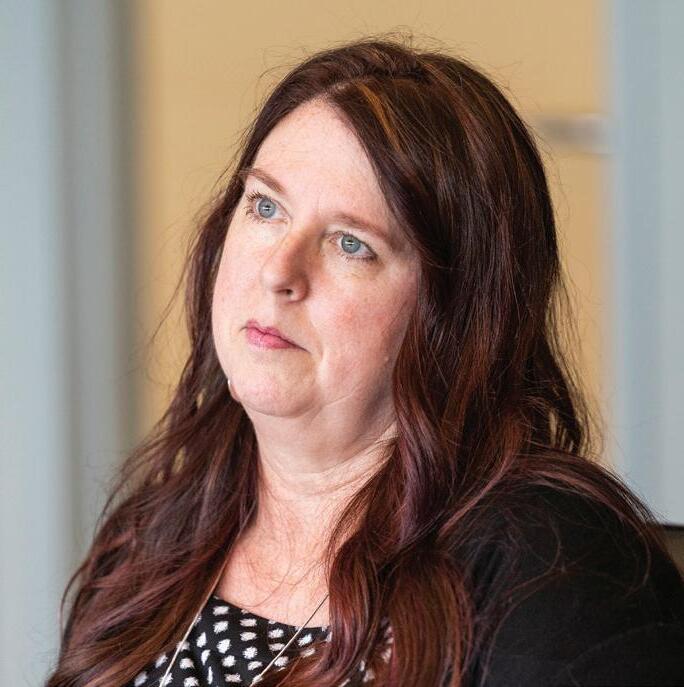
age 16. You might have noticed that from how I speak, I’m not from North Carolina. I was an apprentice for four years, because in the old days, apprenticeship programs lasted a long time. I’ve been a big fan of getting young people exposed to manufacturing opportunities. We’ve got a relatively young workforce, so it’s easy for us to engage the younger workforce or apprentices. It’s not like they can’t learn the roles and be very successful, if they have the aptitude, they can be successful.
BALDWIN: A key thing we find at Malone, is that businesses realize early on how important it is to build a relationship with the school and
PANELISTS
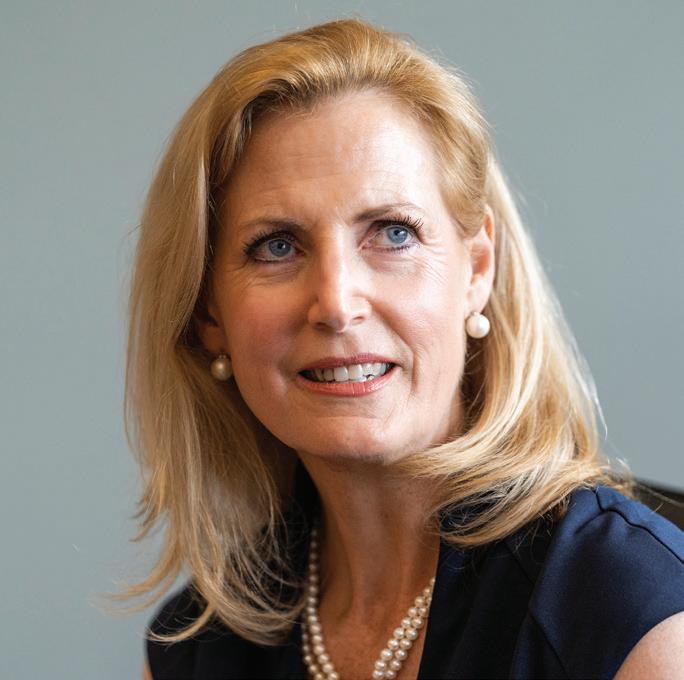
29 JUNE 2023
Patrick Cronin assistant director, Institute for Emerging Issues, North Carolina State University
Caroline Sullivan (moderator) executive director, North Carolina Business Committee for Education
Rusty Baldwin career development coordinator, Vernon Malone College and Career Academy
Julie Pack executive director, career and technical education and magnet programs, Durham Public Schools
David Emonson, vice president & general manager, Caterpillar
the students. This is about the time of year that some organizations suddenly show up with a stack of business cards, and they’ll say: “I heard you have some HVAC technicians graduating, will you pass out my business cards?” And it’s too late because the students have already been building relationships with other business partners who connected with them one or two years before they graduated.
PAT, HOW IMPORTANT IS IT FOR EMPLOYERS TO GET INVOLVED IN SCHOOLS TO GROW THEIR WORKFORCE?
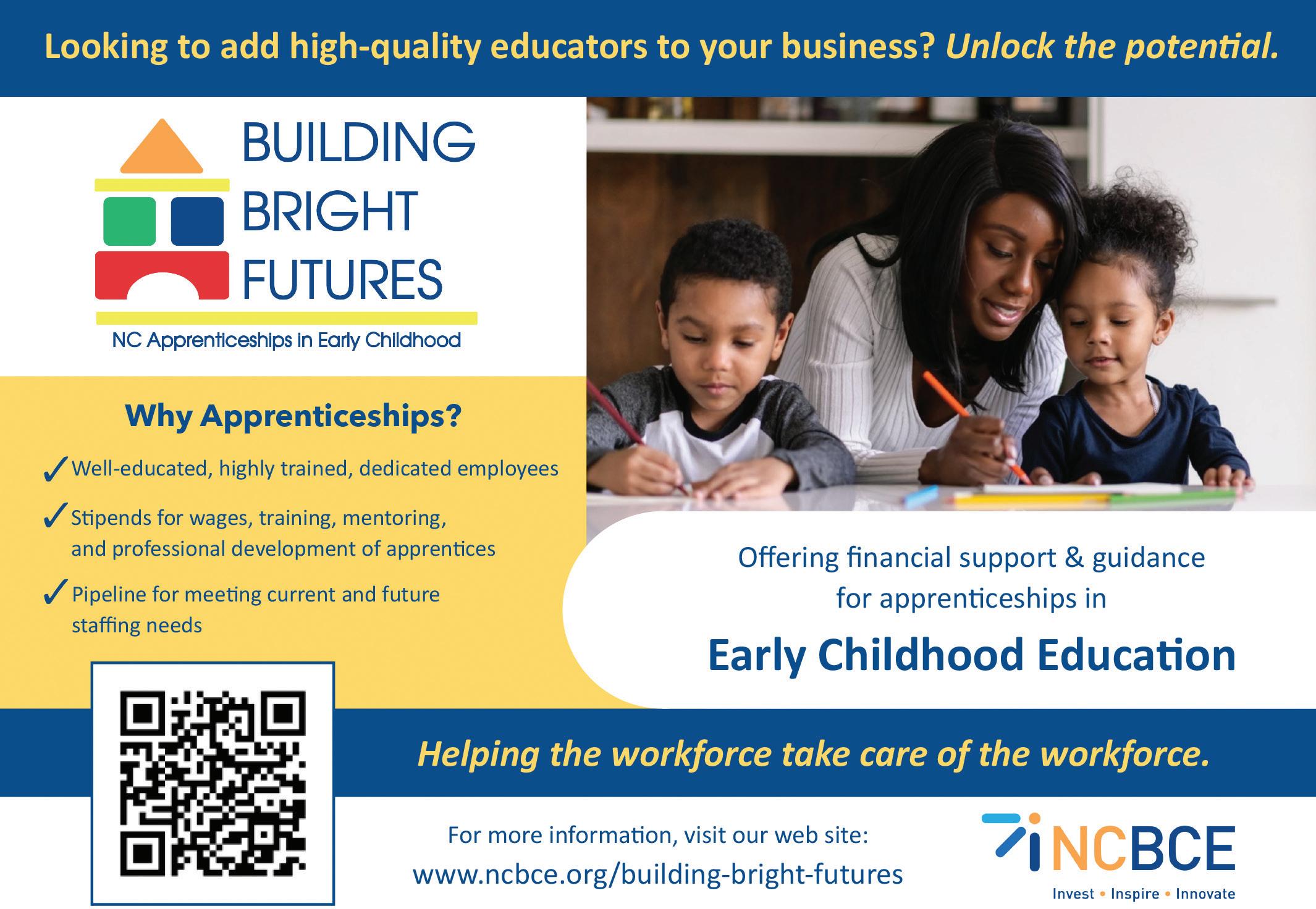
CRONIN: I think the conversation that we’ve had to this point really underscores the need for more employer engagement. And if I had to single out a reason for that it’s self-interest, right. The only thing that we’ve consistently heard over the last several years from employers is their inability to find the workers that
they need. And I think it’s incumbent upon the employers to participate and help generate that pipeline. And so we got some great examples of how employers are doing that here in the room. But too many employers don’t do it for whatever reason. I think it’s important to understand that the demographic headwinds are significant. I don’t think even with a recession, this challenge of finding workers is going to go away. We’ve got an aging workforce, the baby boomers are retiring every year. And so Dave, I don’t know what the age profile of your workforce looks like, but I know from talking to others in manufacturing, it’s old. And so you have to worry about where replacements are coming from. We also have fewer kids coming through the pipeline. I saw a UNC study that suggested that the number of kids graduating from high school in North Carolina in 2029 to 2039 is going to be flat or declining. So there’s going
to be a limited pool going forward. And of course, there’s the added challenge, that demographically in terms of race, ethnicity, in terms of income, the profile of your average North Carolina K-12 student is shifting toward groups that traditionally have had lower levels of educational attainment. As the workplace gets more sophisticated, as you’ve got million-dollar machines that you need workers to run through computers, you need workers with more skills, not fewer. So that’s the challenge. We have been working with multisector groups to really get the word out that something needs to be done. The state has set its goal of 2 million North Carolinians with a high quality credential or post secondary degree by 2030 to meet our workforce needs. Well, we’re behind where we need to be. Obviously, the pandemic did
SPONSORED SECTION 30 BUSINESS NORTH CAROLINA ROUND TABLE BUSINESS & EDUCATION
us no favors in that respect. But, you know, one of the messages we’re trying to get across is that if we’re going to meet these goals, everyone has a role to play. And it has to be locally owned and driven. And in that sense, I would single out two groups that need to be front and center: employers, and students and their families. It’s about meeting the needs of both of those groups.
EMONSON: For us, we have two real challenges in manufacturing: getting the word out and getting people exposed to opportunities. This means teachers like yourselves and parents who don’t work in a manufacturing environment, knowing that there’s a good career for people in manufacturing. If we can do that, it would go a long way. And then we’ve got to be there to give people the exposure and opportunity to experience what manufacturing is really about. It’s very complicated
but also very rewarding. Everything that we sit in today would not have been created without manufacturing, without engineering. And the more we can get students to pursue STEM related subjects, the better we’re going to be. Also, we need to focus on the fact that too many females are leaving STEM related subjects way to early whilst at school, before they know what they’ve missed out on. So how can we change that?
WELL, SOME OF THE WAYS YOU CAN CHANGE THAT IS THROUGH THINGS LIKE WORK-BASED LEARNING. I DON’T HAVE TO NAG CATERPILLAR ABOUT THIS, BUT FOR OTHER EMPLOYERS OUT THERE, YOU HAVE TO TELL YOUR STORY. YOU HAVE TO TELL OUR K-12 TEACHERS AND STUDENTS THAT IN ADDITION TO A GOOD CAREER PATH OR INCOME, THE JOBS

ARE MEANINGFUL. WE HAVE A PLATFORM CALLED THE WORKPLACE LEARNING NAVIGATOR THAT IS FREE TO ALL COMPANIES AND AVAILABLE TO EVERY TEACHER IN THE STATE. THE EASIEST THING YOU CAN DO IS GET ON THE PLATFORM AND TELL YOUR STORY. CAN YOU TALK ABOUT HOW EMPLOYERS ARE REACHING FOLKS WHO TRADITIONALLY ARE NOT IN ADVANCED MANUFACTURING?
EMONSON: Over the last year or so, we’ve had the opportunity to work with a neurodiverse group. The organization came to help us learn how we could change the way in which we train, how we adjust our operations, how we develop the work practices, so that they can benefit neurodiverse employees. We have changed our training program for the better. We got some great tips on
31 JUNE 2023
how to make it more visual, how to speak differently, how to create the standard presentations in a way in which everyone can understand. And that has helped us with our training program for everyone. So we’ve made multiple changes to the way in which we onboard all employees, which will help us with neurodiversity. This is an untapped opportunity that we are really grateful we were able to do something about in the last twelve months.
MOST OF OUR EMPLOYERS THAT WE WORK WITH THROUGH OUR PROGRAM FOR AUTISTIC PROFESSIONALS ARE MORE FOR FOLKS THAT HAVE FOUR-YEAR DEGREES. CATERPILLAR REALLY IS PAVING THE WAY TO BE ABLE TO SUPPORT INDIVIDUALS WHO EITHER HAVE A COMMUNITY COLLEGE DEGREE OR DON’T HAVE A FOUR-YEAR DEGREE AND CAN STILL HAVE A CAREER LIKE ADVANCED MANUFACTURING.
EMONSON: We’re really excited to see how that works out. It’s been a great positive experience for us as well.
CRONIN: If there’s a silver lining to the situation of not finding enough talent is that employers are finally paying attention to groups that have traditionally struggled to get into and stay in the workforce. So the neurodiverse community is a good example of that.
JULIE, CTE IS ALL ABOUT RELEVANCE TO THE CURRICULUM AND WORKBASED LEARNING. HOW DO SOME STUDENTS DO BETTER IN CTE PROGRAMS THAN THEY MIGHT DO IN TRADITIONAL PROGRAMS?
PACK: One of the things about career technical education is that
it’s immersive. They don’t just learn about manufacturing, they actually do the activities in the classroom. Where students sometimes struggle is in taking a math, or science or English class where it’s theoretical, and these classes don’t seem practical to the real world. CTE does that. They’re learning the why, but they’re also learning the how. So we have students who persist in career technical education. Our data in Durham public schools, for example, shows an 85% graduation rate for the entire district. But when you look at students who are in those (CTE) concentrations, graduation rates were at 99%. I was appreciating what you were saying about really providing opportunity to underrepresented students, because that is one of the impetus and focuses of career education, because we pay attention to those subgroups, and students that we say are in special populations. These are students who typically don’t have the advantages that other students have. It’s encouraging to hear talk about changing your practices to engage more students. Other students who have challenges are students who speak primarily another language, students who have transportation issues or are experiencing economic issues. We’re trying to find ways to remove those barriers and get them into those work based learning experiences. We also need the businesses to help us remove those barriers.
BALDWIN: The statistics Julie gives are pretty common across the state. We’ve got students at Vernon Malone who may be on the verge of failing and we try to decide if this student should even go out and do an internship. Are they going to be able to handle that life experience? A month into their internship, I’ll get a phone call and it’s as if this is a whole different student. The worksite is saying he’s doing a great job. We’ve got success story after success story
of business partners that see the kids thrive, when they are in the real work experience and not sitting in a math class or a typical classroom. It’s so important sometimes to make sure that we give those kids those opportunities and remember that everybody thrives in different ways. CTE does that.
EMONSON: If you go through high school and you’re told that the only aspiration is a four-year degree, then you’re inherently disappointed if you don’t get to do it. But if we can engage people so that they realize there’s a career in manufacturing, if you come and work for companies like us and many others, your education doesn’t end when you start work, it’s just the start. We offer education assistance for community college, or you can get a two-year degree or a four-year degree.
PACK: Well, I think that that’s a great point, one that we struggle with in CTE because there’s a community perspective, that a four year degree is the ticket to get into the next level. And we’re not saying that it’s not. We want our students graduating with purpose. What are you going to accomplish? What are you doing in the next step? Because it may be the next step that you’re looking for is going straight to an employer and letting them pay for the college. Or it might be that you just need a certain certification and you can make a lot more than your doctor or your dentist.
EMONSON: I think that getting exposure to parents and students that the career opportunity is real is key. And then it also opens up lots more doors. It’s not the end, because you didn’t get a four-year degree, it can easily be the beginning.
BALDWIN: We fight the stereotypes sometimes. At Vernon Malone,
SPONSORED SECTION 32 BUSINESS NORTH CAROLINA ROUND TABLE BUSINESS & EDUCATION
one of our programs is facilities maintenance and electrical. We’re asking our eighth grade students to make those decisions with their moms and dads. We have to break that stereotype of what it means to be in facilities maintenance, technology or welding. And sometimes we do that by talking about the salaries, and then all of a sudden mom and dad see that Johnny’s gonna come out making more money as an HVAC technician than the occupation that they currently have in mind.
CRONIN: I would like to echo and expand on what you were just saying. We’re currently working with five community based organizations across the state four of whom are exclusively focused on helping kids get through high school and hopefully on to something after that. Certainly one of the challenges you’ve named is the parents who have it in their mind that their child is going on to a four-year college and maybe one specific four-year college. So trying to get them to consider, for instance, a community college is a challenge. It’s also important to understand there are parents out there who also don’t have any aspirations for their children after high school and are not encouraging their children to do any more education. So I think that’s part of the challenge as well is helping parents and other career influencers open the eyes of their kids to consider something after high school. Because increasingly, it’s really, really hard, if not impossible, to earn a family



sustaining wage if you don’t go on after high school, and get some sort of credential or degree.
PACK: One of the things we’re working on is really making that connection for students in middle school. I know Dawson County does this by exposing different kinds of work. This is where we need a lot of partnerships with employers so that you can have side by side, the educational programs that you have in high school with the careers that align with that education. And then as a student is going into ninth grade, they’ve already done a lot of career activities and learned career inventories. Then they have an idea of what they’re really good at. We’re helping people connect the dots. They’re making those choices, not so much because mom wants me to go to early college, but because this is the work they want to do. ■
33 JUNE 2023
WOMEN WHO WOW
by Alyssa Pressler
This year’s Women In Business section profiles four highly accomplished professionals involved in the state’s financial services and healthcare sectors. Each woman prioritizes strong relationships with colleagues and community members, characteristics that have helped them achieve impressive career and personal milestones. Each leader has blazed a path in traditionally male-dominated industries. Each has a compelling story that is instructive for others aiming to make a valuable mark.

SPONSORED SECTION N.C. PORTRAITS WOMEN IN BUSINESS 34 BUSINESS NORTH CAROLINA

35 JUNE 2023 36 MELISSA NELSON | Marsh McLennan Agency 37 RUBY JONES-DEANS | Davenport & Company 38 LAURA HAMMOND | First Carolina Bank 39 ANITA HUGHES BACHMANN | United Healthcare
MELISSA NELSON vice president, employee health and benefits
Greensboro
336-346-1353
marshmma.com

As Melissa Nelson, vice president of employee health and bene ts at Marsh McLennan Agency, likes to joke, health insurance was an unexpected destination for her career. e road to that industry o en has a few stops along the way.
For Nelson, this meant an undergraduate degree in biochemistry from N.C. State University where she learned more about what she didn’t want to do than what she did. As a student athlete, she always had a passion for health and wellness. is led her to a master’s program in public health at UNC Chapel Hill, where she found a world of folks who help employers with their insurance bene ts.
e rest, they say, is history. Nelson found something that kept her in health and wellness, and allowed her to make an impact by helping employers manage their bene ts o erings and connecting them with the right health programs for their employees. In doing so, she helps employers attract the best talent and employees by increasing access to bene ts that help them maintain healthy lifestyles.
“ ey’re putting a lot of dollars [into their bene ts o erings], so it’s our job to make sure they are good stewards of the money they’re spending, but also make sure their employees understand that investment and how they can interact with the programs,” Nelson says.
Her days at Marsh McLennan Agency are always di erent - another reason she loves her job and has been with the company for 14 years. O en, she’s meeting with insurance carriers to learn about new programs, meeting with clients to explain these new programs or consult with them on their existing bene ts packages, or meeting with her team for analysis.
“It’s people focused, and there’s certainly elements of data,” Nelson remarks.
When asked why she’s passionate about her work, she mentions her employer’s commitment to being one of the best places to work. She touted the strong culture Marsh McLennan Agency has fostered and the example they want to set for other companies.
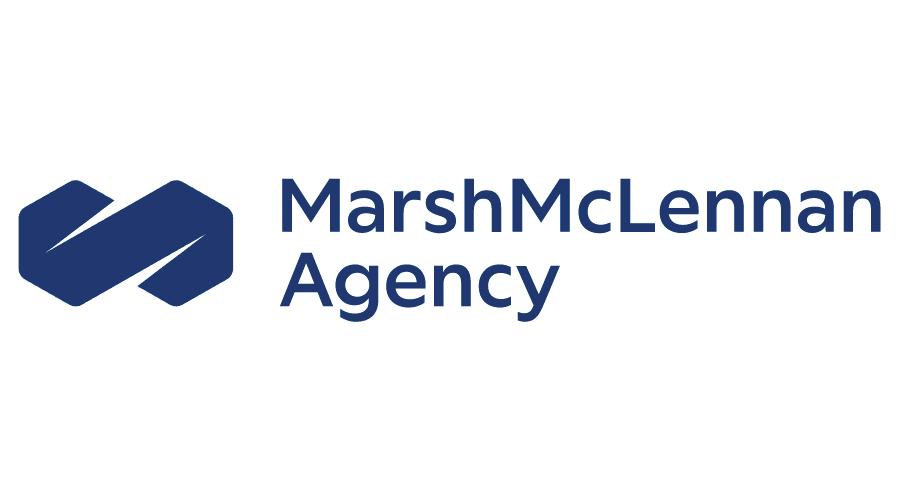
“A lot of clients look at us to ask what we are doing [when it comes to bene ts o ered to our own employees],” she says. “We are practicing what we’re preaching.”

SPONSORED SECTION 36 BUSINESS NORTH CAROLINA
RUBY JONESDEANS vice president, branch operations administrator, registered client service associate


Some might get into the wealth management and nancial services industry mainly due to their love of numbers, but not Ruby Jones-Deans. For her, it was also the people, and the connections she built with them, that made her passionate about working in nance.


Jones-Deans’ professional career began with the N.C. Department of Social Services, but a er several years she found a job with a stock brokerage rm which allowed her even more interaction with people. She joined Davenport & Company in 2000.

Over the past 23 years she’s continued to grow in the company and now serves as the branch operations administrator, a registered client service associate and a vice president in Raleigh.


“I nd that I am at my best when I am helping others,” Jones-Deans says. “In all the jobs I have worked in, I have always been around and involved with people helping people.”
Jones-Deans has over 43 years of experience in the nance industry, and is most proud of the fact that she has no professional regrets. Outside of work, she is passionate about her involvement with her church, with the Children’s Hunger Elimination of Wilson (CHEW) program and with the N.C. Order of the Eastern Star (OES), which raises money for various charities year-round.
When Jones-Deans rst got her start in nance, she found herself in a male-dominated industry. She wasn’t daunted, though, and instead went the extra mile to ensure all of her work was top-notch and done on time. It’s an approach she continues to use today, and one she’s passing on to her children and grandchildren.
“I learned at an early age to multi-task and make sure that when tasks were given and completed, they were my best,” she says. “A motto I tell my children and grandchildren today to always follow is, ‘Good, better, best: Never let it rest until your good is better and better is your best.”
37 JUNE 2023
Davenport & Company LLC Member: NYSE | FINRA | SIPC Raleigh 800-846-6666 investdavenport.com
LAURA HAMMOND managing director, commercial real estate banking
Raleigh
919-809-7869
firstcarolinabank.com


Laura Hammond loves a good story.
Whether it’s a novel that her book club is currently reading, the topic of the Sunday school lesson she’s teaching, or the documentation for a new commercial loan, Hammond, First Carolina Bank’s managing director – Commercial Real Estate Banking, enjoys it all.
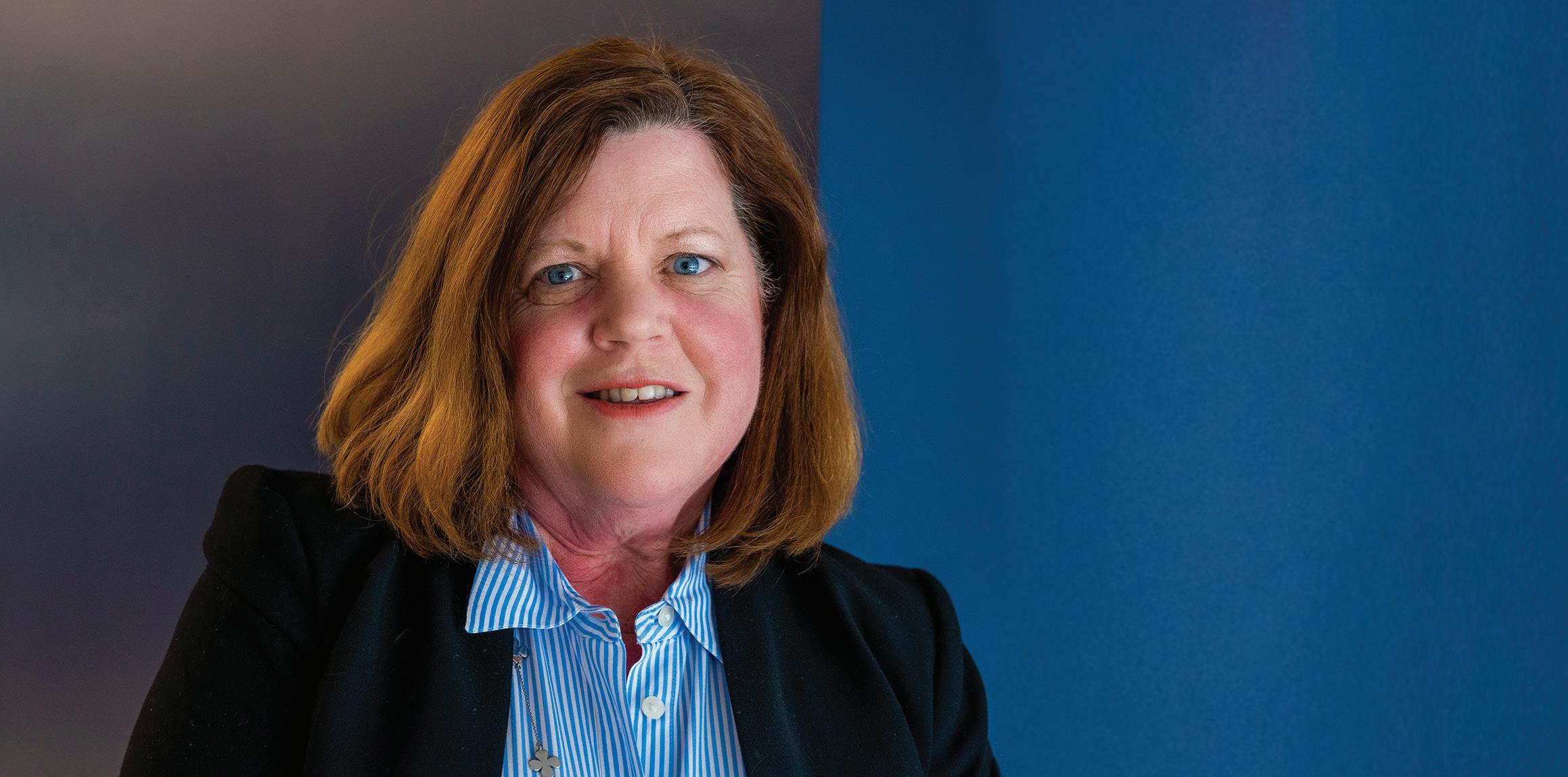
“When you look at a new loan request, it’s somebody’s story,” Hammond says when asked what makes her passionate about the work that she does. “You look at what makes the nancing work for that asset at that location, and it’s fascinating. And here, with our four-state market footprint, getting to look at projects in Virginia, Georgia, and North and South Carolina is just fun.”
A native Midwesterner, Hammond got her start in banking during college as a teller and worked her way into the account and lending side over the next few years, ultimately landing a position as a commercial lender for the Small Business Administration following graduation.
A er a stint in New Jersey, she moved to North Carolina for a change of pace in 2000 and took about a decade away from banking while her children were young. Once she became the proud matriarch of a divided house—her children are now students at or graduates of UNC Chapel Hill, N.C. State and East Carolina University—she made her way back into the eld and reconnected with Gregg Ferrell, First Carolina Bank’s executive managing director – Commercial Real Estate Banking.
With Hammond on board, the Bank’s CRE portfolio only grew, as did their team to include a balance of seasoned lenders and younger underwriters learning the banking industry—and Hammond loves to share her experience with them. It’s the dynamic and performance of that team that Hammond is most proud of, and a plaque listing the team members and commemorating the $1 billion in business that they did in 2022 has a spot of honor among the les on her desk.
“You always want to see people take on roles and positions that you’ve had in the past and do a better job,” she says of her team. “ at’s leadership.”
SPONSORED SECTION 38 BUSINESS NORTH CAROLINA
uhccommunityplan.com/northcarolina
ANITA HUGHES BACHMANN chief executive officer

Anita Hughes Bachmann sums up her leadership philosophy as a senior healthcare executive with a quote from another native Tar Heel, Michael Jordan: “Some people want it to happen; some wish it would happen; others make it happen.”

Bachmann has been making things happen for nearly 30 years in high-pro le roles with UnitedHeathcare Group, including the past six as CEO of the insurance company’s North Carolina Community Plan market. She brings a focus on ensuring strong operational and nancial results, while maintaining a trusted market presence and brand reputation.

Healthcare is more than just overseeing a 500-plus workforce, the recruitment of physicians or pro ts and losses, says the Oxford native who now resides in Greensboro.
“Health is impacted by more than what happens in the doctor’s o ce,” she says. “Our real focus is on the health of the community. Yes, including medical health, but also the growth and vitality of the community from an economic, environmental and social perspective.”
Bachmann’s dream of working in healthcare began in middle school when she volunteered as a “candy-striper” in her local hospital. She earned a master of health services administration degree from the Medical University of South Carolina in Charleston and graduated from the Executive Leadership Program at the University of Pennsylvania’s Wharton School in Philadelphia.
Her rst job in health care was in health information management for the Greenville Hospital System in South Carolina. She joined UnitedHealthcare in September 1993, and received numerous promotions, becoming CEO of the North Carolina Community Plan market in June 2017. “I have been with one company for almost 30 years, which is not traditional in today’s society,” she says.
Bachmann is entrenched in the community as a member of the board of trustees at UNC Greensboro, board member of GMA/FirstPoint and past chair and current board member of the Greensboro Chamber of Commerce. Gov. Roy Cooper appointed her as a board member of the N.C. Institute of Medicine and to the N.C. Works Commission.
UnitedHealthcare is committed to developing innovative partnerships with stakeholders that transform care, with an emphasis on social determinants of health and behavioral health integration. Bachmann spends most of her time with health care providers and those receiving services.
“We achieve better health through building relationships,” says Bachmann. “And that happens by building trust to create a high-performing healthcare ecosystem.”
39 JUNE 2023
Greensboro 800-349-1855
SMOKY MOUNTAIN HIGH

As restrictions on marijuana use fade, the Cherokees are poised to light a thriving business.
By Edward Martin
40 BUSINESS NORTH CAROLINA
West of Birdtown, Coopers Creek tumbles out of the dark coves of the Smoky Mountains, luring fly-fishing buffs with plump trout. Near Cherokee, in recent years, the fish themselves have become a crop, in stocked ponds where anglers pay to tempt them with exotic flies of elk hair and such.
Eighteen months ago, another crop sprouted here, little noticed by few outside the tightly knit Eastern Band of the Cherokee Indians. Its spiky leaves are now flourishing in two-dozen hoopdomed, climate-controlled greenhouses.
This is North Carolina’s first industrial-scale, medical marijuana project. If successful, its economic impact on western North

peak, he says, it could employ 400, on top of the 7,000 jobs tied to the Eastern Band’s casinos, resorts and other enterprises. About 60 people now work on the project.
Cannabis experts say the Cherokee undertaking could serve as a model for an influx of similar businesses in North Carolina. Clampitt and other Tar Heel legislators who’ve visited the budding project in recent months says its rigid controls aimed at preventing diversion of the psychoactive cannabis for nonmedical purposes has influenced the debate over medical marijuana legalization at the N.C. General Assembly. While Cherokees and others expect a bill to pass during the current session that ends this summer, the measure was stalled at press time.
Non-psychoactive industrial hemp has been legal in North Carolina since 2017, though it is now regulated by the U.S. Department of Agriculture. Some industry experts say hemp holds potential cautions for the Cherokees. Tar Heel farmers rushed into producing it, creating surpluses, some of which rotted in storage. For now, only products with a tiny amount — less than 0.9% — of the psychoactive component THC are legal in North Carolina.
Carolina could complement the gambling industry that has become an economic bulwark since 1997. After an investment topping $50 million, it stalled in early May after internal dissent over its financing.
Today, two Harrah’s casinos, four hotel towers with 1,800 rooms, restaurants and other developments generate more than $600 million a year. The complex has transformed the once-poor Qualla Boundary, home of the Eastern Band, into a regional dynamo.
Approval of the gambling operations in the 1990s also stalled along similar lines to those recently muddying the future of the marijuana project. Within the tribe, there were concerns over ownership of the casinos — resolved in a deal in which the Eastern Band owns them, and Harrah’s manages them — and squeamishness about the morality of gambling. Today’s stumbling blocks for the marijuana project include similar concerns.
“They’re already the largest employer in western North Carolina and the economic engine of this area,” says Mike Clampitt, the N.C. House member for Swain, Jackson and Transylvania counties, which include the Cherokees. “This will have a tremendous impact.”
Under best-case scenarios, the tribe’s planned medical-cannabis operations could generate $350 million a year in sales of more than 1,000 pounds a week produced and sold at its own dispensary, says Forrest Parker, manager of Qualla Enterprises, created by the Eastern Band to launch the project. It would be “the largest retail center in the world” for medicinal marijuana.
The Eastern Band has already developed two proprietary strains of the plant, adapted specially for the cooler, mountain climate. At
If projections are accurate, the Cherokee could produce nearly 1 million ounces a year. A fraction of that would go to the tribe’s 15,000-some members, who are limited to 6 ounces per month under tentative tribe rules. They have to apply, with a physician’s recommendation, to the band’s Cannabis Control Board, which would issue cards, initially for tribe members. Later, plans call for allowing the general public to buy an ounce a day, no more than six times a month.
They would have to prove they suffer from illnesses that could benefit from cannabis, according to researchers at the Mayo Clinic and elsewhere. That includes AIDS, autism, autoimmune diseases, muscle spasms, chronic pain and cancer.
Other groups familiar with cannabis are preparing to operate in North Carolina, including Mockingbird Cannabis, which operates in Mississippi, Missouri and Oklahoma. CEO Marcy Croft says the Raymond, Mississippi-based company is “excited and optimistic about North Carolina.” It is backing a Cullowheebased startup SkyRidge Unlimited, which was chartered in April. “Each state is individually passed, but yes, some of the founders of Mockingbird are working with the North Carolina hemp industry,” she says. “We’re looking at the law proposed up there, and hoping to apply for a license and to open a facility there.”

41 JUNE 2023
Annual revenue of $350 million is possiible, creating opportunities to boost tribal member's economic mobility, officials say..
The Cherokee operation will be similar to this Mississippi cannabis site.
It’s unclear whether SkyRidge would compete with or complement the Cherokee project. “We’re certainly interested in talking with and working with them,” Cro says, “but we haven’t yet.” e Eastern Band’s Parker also stresses growth potential for the industry. More than three-dozen states have legalized medical cannabis in various iterations, he says. Twenty-one others, including Virginia, have legalized recreational use of small quantities, indicating a so ening of attitudes about what in the 1930s was branded the precursor to “reefer madness.”
North Carolina state law lays out misdemeanor nes for possession of small amounts of marijuana, but classi es any amount of 1.5 ounces or more as a felony. e state is one of 10 yet to legalize medical marijuana, though the Cherokees and potential competitors think it will.
Meanwhile, adding to the project’s uncertainty, medical marijuana remains illegal under federal law. e Haywood County Sheri ’s O ce, which has authority in areas around tribal land, has indicated no desire to strictly enforce the marijuana laws except in unusual circumstances.
Nationwide, industry experts say the cannabis market will hit $35 billion this year, then double by 2030. ough Cherokee leaders stress that the tribe is a sovereign nation under federal law, Chief Richard Sneed has raised red ags, causing their cannabis project to tiptoe ahead, pending actions in Raleigh and Washington, D.C. ey are being deliberate, watching how state lawmakers rule on medical marijuana.
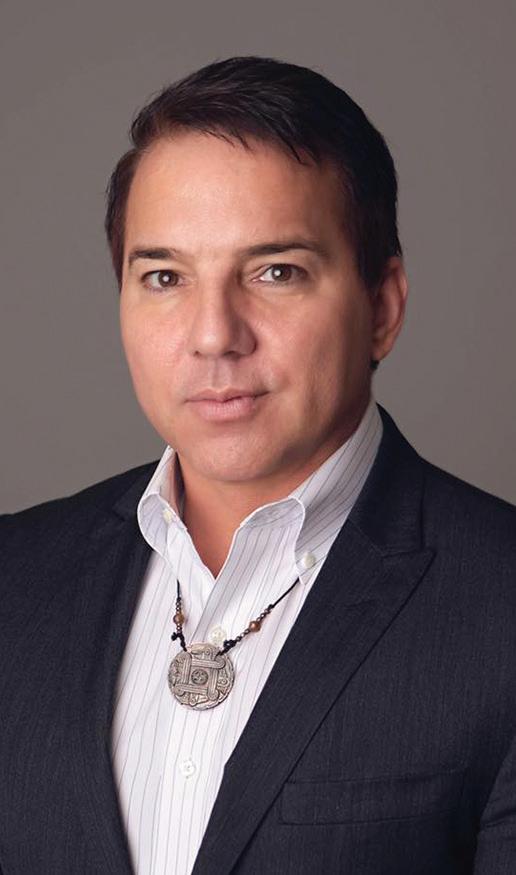
N.C. Gov. Roy Cooper and Attorney General Josh Stein, a Democratic candidate hoping to succeed Cooper in 2024, favor decriminalizing possession of small amounts of the drug. Lt. Gov. Mark Robinson, who is the leading Republican candidate for governor, opposes legalization of recreational marijuana.
Rep. John Autry, a Charlotte Democrat, is promoting an e ort to allocate $4.5 million to state research universities to study psychedelic drugs derived from certain mushrooms and other sources for treatment of post-traumatic stress disorder, anxiety by cancer patients and other illnesses.
Parker, Sneed and other Eastern Band marijuana proponents agree that the state’s approach to medical marijuana could be important to their success. ey note that North Carolinians’ use of illegal marijuana ranks second in the nation according to FBI statistics, indicating signi cant demand. eir best-case scenario depends heavily on outside sales.
CHIEF PUMPS THE BRAKES
Regardless, 500 miles away in Raymond, a Natchez Trace town in central Mississippi, medical marijuana is no longer just an alliterative topic of conservation. Its widespread acceptance could come to North Carolina, say proponents.
Already, in the muted light of greenhouses, more than 50 mostly Cherokee workers recently were primping lush, chest-high plants, prior to harvesting and drying the leaves, and carefully grading them for drying.
Dried marijuana

waiting nal processing for medical use was recently being stockpiled in sub-zero storage, awaiting processing for sale in a retail dispensary on the reservation.
Based on tribal council proceedings and other sources, the Eastern Band voted in 2021 to make medical marijuana sales legal on the sprawling, 50,000-acre Qualla Boundary. In April, it approved a $64 million loan to Qualla Enterprises, bringing the tribe’s commitment to the N.C. project to nearly $100 million.
en Chief Sneed got cold feet. In early May, he vetoed the council’s April decision to pump more money into medical marijuana, concerned that it could damage the tribe’s lucrative gambling operations. About half of the tribe’s annual $732 million annual budget comes from gambling. He also demanded a full accounting of about $30 million spent on the project, raising questions about Qualla Enterprises.
Project supporters say the extra $64 million, which would bring total funding to $100 million, can be raised from non-gambling sources. Sneed is doubtful.
In Washington, a spokesman for the National Indian Gaming Commission, says its rules are clear: Because possession of marijuana remains illegal under federal law, gambling funds “should not be used to nance such an operation.”
e future of Cherokee marijuana? Some council sources say it will happen, though likely at a more cautious pace. Parker and Qualla Enterprises had hoped to begin sales this summer.
e tribe, they say, could provide a smaller amount — possibly $10 million to start — from revenue streams clearly not associated with gambling.
e money will, among other things, convert a former bingo hall building at the base of a hill to a retail dispensary. During tribal-council hearings, Parker, who heads the project, told members they could expect returns as high as 60% on the tribe’s investment. At minimum, he anticipates $50 million a year in sales. at could soar to $350 million if North Carolina law frees up sales to the general public.
Not everyone is on board, of course, just as some Cherokees raised concerns about gambling nearly three decades ago.
Here, in the deep hollows in isolated communities such as





42 BUSINESS NORTH CAROLINA
Chief Richard Sneed
Wol own and Snowbird, political and moral beliefs run the same spectrum as in the outside world. Some see gambling and marijuana as sin enterprises, while Sneed, a native Cherokee and former U.S. Marine, view them as economic bootstraps for the Eastern Band. He says gambling has funded the tribe’s modern hospital, healthcare programs, school and other amenities.
Some families still refuse on moral grounds to accept per capita payments from casinos that go to each tribal member. Payouts totaled about $12,000 per member last year, split half to the tribe and half to individuals.
Parker shrugs o such concerns. “Everybody has to come to cannabis in their own way,” he says.

More than moral queasiness is at stake. Despite Eastern Band sovereignty, Sneed and others are wary of the North Carolina legislature’s slowness in legalizing medical marijuana versus most other states. e tribe is banking on public sales to meet its high-end revenue estimates and avoid the reservation wallowing in unsold crop.

In Mississippi, Cro says Mockingbird Cannabis faced similar hurdles. Last year it was forced to destroy about $1 million worth of its crop — about 5,000 plants — when the Mississippi Department of Health, which regulates medical marijuana production, concluded a greenhouse didn’t meet state requirements. e state, which has a third of the population of North Carolina, licenses nearly 50 production plants and about 90 dispensaries.
Cherokee leaders hope to avoid such pitfalls, but otherwise, the Qualla Enterprises project could be similar to Mockingbird’s. Cro says Mockingbird expects to ultimately employ about 200 people.
“We pay a minimum of $18 an hour, and I would expect it would be similar in North Carolina.” If the company builds a North Carolina plant, she adds, it would be in one of the 40 Tier 1 counties, which have the weakest economic prowess. “You can expect millions of dollars in operating fees, licensing and tax and other revenue. Not to mention our electric bill. It’s enormous, because we grow inside.”
Already, the edgling Cherokee project resembles Mockingbird’s. A prime reason is that the potential for medical marijuana being diverted to a thriving recreational market dictates high security. Mockingbird has guards, guard dogs, cameras and other measures.


In Cherokee, Parker and others say similar steps are underway, “from seed to sales.” Outsiders are impressed by the project’s sophistication. “Everything is tracked and monitored,” says an eastern North Carolina legislator who visited in February. “A lot of people think it’s just produced in a eld and farmers grow it. at’s just not how it’s done.”
N.C. Rep. Clampitt has met with Chief Sneed and tribal council members a couple of times this year. “It’s an upscale operation, with a lot of checks and balances and tracking of every plant.” Meanwhile, the Cherokees are receiving encouragement from others in the industry.

“We’ve been watching the North Carolina legislature, and we’re optimistic about the outlook there,” says Cro , the Mississippi co-founder of Mockingbird Cannabis. “ is is my home state — I grew up in Mississippi — and I’ve seen the changes we’ve brought about here. It’ll happen in North Carolina too.” ■

43 JUNE 2023
As N.C. lawmakers mull legalization of medical marijuana, the Cherokees expect to be market leaders once officials agree on fiscal management issues.
SCRAPPING AWAY
MARKET CONDITIONS MAKE FOR A ROUGHER RIDE FOR THE STATE’S HOMETOWN BANKS AND CREDIT UNIONS.
North Carolina’s financial institutions were challenged in the past year by escalating interest rates that slowed home loans and boosted the cost of funds. Stlll, more than half of the institutions on Business North Carolina’s annual list of the state’s 50 biggest banks and credit unions based in the state reported a return on assets of more than 1%, which is a traditional industry benchmark.
Revenue also increased at most institutions, boosted by higher rates charged on loans amid the increased inflation. The gains were more modest than in 2021, when many banks
benefited from record activity in home loan originations and refinancings, along with robust fee income from Payment Protection Program lending. In 2022, and early this year, the housing market has lost much of its luster, while memories of the PPP are fading.
Only one N.C.-based left the list in the last year because of a takeover: Greenville-based Union Bank was bought by Pittsburgh-based FNB Corp. for $117 million.
The rankings are based on information supplied by New Yorkbased S&P Global Market Intelligence.
10 INSTITUTIONS THAT MADE NEWS IN THE LAST YEAR
Truist Financial
Being a big super-regional bank with branches in 17 states has its upsides. But Truist faced major pressure this spring amid the collapses of Silicon Valley Bank and First Republic Bank. Investors feared that deposits of big regionals would move to the megabanks because of unrealized losses in Truist’s bond portfolio, along with concerns over real estate credit quality. The company raised about $3 billion by selling a minority stake in its insurance brokerage. Its dividend yield was 7.7% in mid-May.
First Citizens BancShares
It occurred this year, not in 2022, but Deal of the Year honors go to the Holding family-controlled bank after it bought the failed Silicon Valley Bank in a negotiated deal with the Federal Deposit Insurance Corp. The company’s market value increased 70% to $14 billion following the deal’s closing in March. Investors believe that First Citizens can profit handsomely from the California-based company’s operations. The move followed a solid 2022 in which the bank’s revenue and profit doubled after the purchase of specialty lender CIT Group.
State Employees’ Credit Union
It’s not your grandfather’s SECU. The second-largest U.S. credit union is undergoing major changes in policies and corporate culture, two years after the board hired Jim Hayes as CEO. SECU now uses credit scoring to boost loans from more affluent members; launched its first major ad campaign; nearly doubled spending on outside consultants; hired a facilitator for director elections; and stopped requiring male branch office staffers to wear ties. The credit union also reported its first annual decline in assets in decades, reflecting a decision not to be as aggressive as many rivals in offering higher interest rates on customer deposits.

First Bancorp
The state’s biggest community bank added $1.2 billion in assets and eight branches in South Carolina with the Jan. 1 purchase of GrandSouth Bancorp. Its ability to increase earnings per share annually over the past decade ranked in the top 4% of U.S. banks, according to the KBW investment firm.
Local Government Federal Credit Union
Started in 1983 as an offshoot of the State Employees’ Credit Union, the Raleigh-based institution plans to unhook that relationship
starting next March. The group’s board and CEO Dwayne Naylor, who succeeded longtime leader Maurice Smith, plan a digital-first emphasis without operating credit union branches. Since inception, LGFCU has paid SECU for members to access the bigger credit union’s 250-plus offices. Naylor says the credit union is better off relying on ATM, digital and telephone services.
Coastal Federal Credit Union
Tyler Grodi became CEO and president on April 1, succeeding Chuck Purvis, who held the job since 2012. Grodi had been CEO of EFCU Financial in Baton Rouge, Louisiana for 11 years. Asset growth was flat last year after increasing 46% between 2018-21. Net income plunged as housing-related revenue dried up.
Self-Help Credit Union
The Durham-based credit union focuses on lending to small businesses that struggle to find financing elsewhere. That’s proved to be a solid business for many years, but especially last year as it recorded the most rapid revenue growth of N.C. institutions, excluding First Citizens. The credit union cited significant increases in loan and investments.
First Carolina Bank
Rapid growth continues at the closely held Rocky Mount-based company, which ranked 25th two years ago. CEO Ron Day opened its first office in Greenville, South Carolina in April, a year after it opened its first Palmetto State office in Columbia. It also has offices in five N.C. cities and in Atlanta. Greenville real estate developer John “Jett” Ferebee is board chair.
Uwharrie Bank
In its 39th year, the Albemarle-based bank topped $1 billion in assets, serving more than 23,000 households. Founders including CEO Roger Dick remain committed to local ownership with no single person having outsized control. The company’s shares have had an annual return of 7.5% since inception in 1984.
Lumbee Guaranty Bank
One of the 19 Native American-owned banks in the U.S. was founded in 1971 after raising $667,000 in capital. Nearly 98% of subscribers were Native Americans. Lumbee interests remain in control with the bank now reporting nearly $500 million in assets and 14 branches in three southeastern N.C. counties. Kyle Chavis has been CEO since 1999.
44 BUSINESS NORTH CAROLINA
2 3 4 6 8 9 16 17 24 38
FINANCIAL 50


LARGEST BANKS AND CREDIT UNIONS BASED IN NORTH CAROLINA
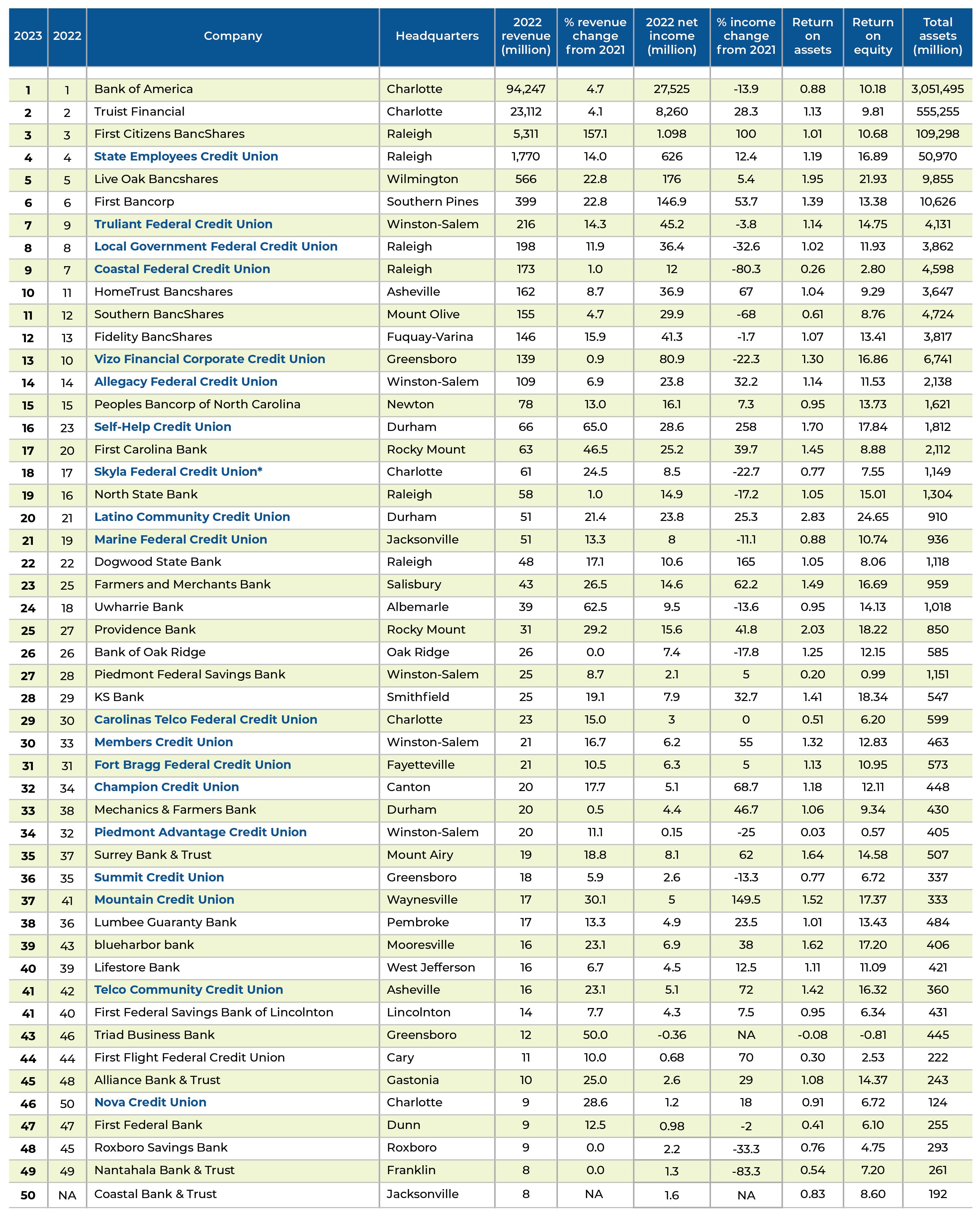



* Formerly Charlotte Metro Federal | Blue = Credit union | Data compiled April 11, 2023. Includes banks, thrifts and credit unions that filed regulatory reports for the year ended Dec. 31, 2022. | Total revenue equals the sum of net interest income, noninterest income and gains on sales of securities. | Net income equals the sum of net interest income after provision, noninterest income, gain on securities, extraordinary items less noninterest expense and taxes. | source: S&P Global Market Intelligence

45 JUNE 2023
BILLIONAIRE’SCLUB
Weak stock and bond markets caused a di cult year for North Carolina’s major money managers in 2022, following several years of consistent gains.
Only four of the 29 institutions with more than $1 billion of assets under management reported increases from the previous year. at was a major change from 2021, when more than 75% of the managers recorded double-digit increases in assets.
e S&P 500 Index declined 19.6% in 2022, while the Barclays U.S. Aggregate Bond Index dipped 13%, its worst performance since the index’s inception in 1976.
No. 1-ranked Raleigh-based CapFinancial Partners, which does business as Captrust Financial Advisors, showed growth by buying smaller U.S. wealth management groups. It has done
NORTH CAROLINABASED INVESTMENT ADVISERS WITH MORE THAN $1 BILLION UNDER MANAGEMENT.
65 deals since 2006, including acquisitions of managers in Minnesota and Texas this year.
e data is based on the companies’ most recent annual lings with the U.S. Securities and Exchange Commission, which describes the number of employees, assets and key owners. Private equity groups and asset managers based outside of North Carolina, such as Vanguard and Fidelity, are not included.
Asheville-based Parsec Financial Management, which ranked 12th last year, dropped o a er it was acquired by Westwood, New Jersey-based Modera Wealth Management. DHG Wealth Advisors, which was No. 22 last year, is now part of Spring eld, Missouri-based Forvis Wealth a er the merger of Charlotte-based parent DHG and Missouri-based BKD, two large CPA rms.
ASSETS UNDER MANAGEMENT (BILLION); CHANGE FROM 2021
1. CAPFINANCIAL PARTNERS
Raleigh
$715 +$60 9.2%
Owns Captrust, which has more than 1,300 employees at 75 U.S. locations.
2. BARINGS
Charlotte
$273 -$34 -11.1%
Investment manager operates globally and is a subsidiary of MassMutual.
3. STERLING CAPITAL MANAGEMENT
Charlotte
$62 -$13 -17.3%
Scott Haenni became CEO in March, succeeding Alex McAlister. It’s a subsidiary of Truist.
4. WELLS FARGO INVESTMENT INSTITUTE
Raleigh
$38 -$13.2 -25.8%
Most executives of the Wells Fargo unit work in St. Louis.
5. ALIGHT FINANCIAL ADVISORS
Charlotte
$30.8 -$1.3 -4%
Acts as a recordkeeper for retirement plans. Unit of publicly traded Alight.
6. ALUMINA INVESTMENT MANAGEMENT

Charlotte
$10.8 $0.1 0.9%
Former Carlyle Group executive Greg Kares started the firm in 2012.
7. GLOBAL ENDOWMENT MANAGEMENT
Charlotte
$10.6 -$2.4 -19.7%
Most clients are universities and foundations. Porter Durham is managing partner. Co-founder Stephanie Lynch is former CIO at The Duke Endowment.
8. INDEPENDENT ADVISOR ALLIANCE
Charlotte
$10.1 $0.3 3.1%
Robert Russo founded the company in 2014. It nearly doubled assets in 2020-21.
9. ATRIA INVESTMENTS
FORMERLY ADHESION WEALTH ADVISOR SOLUTIONS
Charlotte
$8.3 -$2.2 -12.6%
Provides technology, reporting and other services to wealth advisers. Parent company is Concord, Calif.-based AssetMark, which is controlled by China’s Huatai Securities.
10. WEDGE CAPITAL MANAGEMENT
Charlotte
$8.1 -$2.1 -20.6%
Mutual-fund adviser, formed in ‘84, is 90% owned by five partners.
11. HORIZON INVESTMENTS
Charlotte
$3.8 -$0.2 -5%
Palo Alto, California-based Altamont Capital owns the mutual-fund adviser led by CEO John Drahazal.
46 BUSINESS NORTH CAROLINA
12. FORTIGENT
Fort Mill, S.C.
$3.4 -$0.4 -10.5%
The investment platform-reporting company is a subsidiary of LPL, which has a big suburban Charlotte office.
13. FRANKLIN STREET ADVISORS
Chapel Hill
$3 -$0.5 -14.3%
Robert Eubanks founded the business in 1990. It’s now led by CEO Robert Newell. Fifth Third Bancorp is owner.
14. SALEM INVESTMENT COUNSELORS
Winston-Salem
$3 -$0.5 -14.3%
David Rea leads the company founded in 1979. CNBC has ranked it as a top financial advisory firm several times.
15. BRAGG FINANCIAL ADVISORS
Charlotte
$2.8 -$0.2 -6.7%
The family-owned business added $1.2 billion in assets under management in 2020-21.
16. SMITH, SALLEY & ASSOCIATES
Greensboro
$2.7 $0 0%
Gregory Smith and Mackay Salley founded the firm in 2003. It grew rapidly from 2019 to 2021.
17. CAPITAL INVESTMENT COUNSEL, CAPITAL INVESTMENT ADVISORY
Raleigh
$2.4 $0.6 33%
Richard Bryant and Bobby Edgerton founded their multi-faceted business in 1984.
18. BILTMORE FAMILY OFFICE
Charlotte
$2.3 -$0.3 -11.5%
CEO Chris Cecil founded the 21-employee firm in 2008. Other owners include Nicole Gokey, Michael Farrell and Israel Gorelick.
19. VERGER CAPITAL MANAGEMENT
Winston-Salem
$2.3 -$0.1 -4.2%
Wake Forest University owns the firm formed in 2014. Jim Dunn is CEO.
20. COLONY FAMILY OFFICES
Charlotte
$2.2 -$0.2 -8.3%
Managing Director Eric Dean Ridenour leads the 13-person wealthmanagement business.
21. CORNERSTONE ADVISORS
Asheville
$2 $0.1 5.3%
Owner Ralph Bradshaw is president of the publicly traded Cornerstone Strategic Value Fund.
22. COMPERIO RETIREMENT CONSULTING
Cary
$1.7 -$0.3 -15%
President James Richard Sotell owns 91%.
23. MORGAN CREEK CAPITAL MANAGEMENT
Chapel Hill
$1.6 -$0.5 -23.8%
Mark Yusko, former chief investment officer at UNC Chapel Hill, started the firm in 2004. He reports 36 employees and 47 accounts.
24. ETON ADVISORS GROUP
Chapel Hill
$1.6 -$0.2 -11.1%
Former UBS executive Robert Mallernee is CEO. He also leads wealthmanagement platform operator Eton Solutions, which raised $38 million in 2022.
25. NEW REPUBLIC PARTNERS
Raleigh
$1.6 -$0.1 -5.9%
Wealth manager is affiliated with New Republic Bank and backed by the Belk and Close families. Tom Hoops is CEO.
26. CAROLINAS WEALTH CONSULTING
Charlotte
$1.5 -$0.1 -6.3%
George Edmiston is CEO of the 21-employee firm, which has more than 2,500 accounts.
27. NOVARE CAPITAL MANAGEMENT
Charlotte
$1.3 -$0.1 -7.1%
Don Olmstead and Bill Baynard started the business in 1999, mainly serving high net-worth individuals.
28. CORRUM CAPITAL MANAGEMENT
Charlotte
$1.3 -$0.1 -7.1%
Former Bank of America executives Jason Cipriani and Jonathan Mandle are co-managing partners.
29. LINDEN THOMAS
Charlotte
$1.1 -$0.2 -15.4%
Owner Stephen Thomas formed his 11-employee company in 2005. He has more than 700 clients in 35 states.
47 JUNE 2023
MEDICINE MEN
A Raleigh private-equity group eyes opportunities in financing innovation in drug discovery and healthcare services.

 By David Mildenberg
By David Mildenberg
48 BUSINESS NORTH CAROLINA
PHOTO CREDIT: AUDREY KNAACK
It’s been half a century since London native Dennis Gillings took a job as a biostatistics professor at UNC Chapel Hill, and more than 40 since he launched a five-employee company that became Quintiles and later, Iqvia, which is now valued at $35 billion.
While no longer active in North Carolina, Gillings’ vision of making drug development a more statistics-oriented and efficient process keeps paying big dividends for the state. That includes a burgeoning private-equity investment company, of which he remains an investor.
QHP Capital’s roots date to 2015 when Jeff Edwards joined NovaQuest, the Raleigh-based company spun out of Quintiles in 2010 by Gillings and other former Quintiles managers. NovaQuest’s main focus is providing financing for late-stage clinical research trials, a sometimes complex process that didn’t fit conventional bank lending strategies. NovaQuest has raised $2.5 billion and managed $3.6 billion in assets.
Beyond project financing, Gillings also saw an opportunity to tap his team’s industry expertise and contacts to start a privateequity business. To lead the charge, he tapped Edwards, a PE executive at the Texas Teacher Retirement System in Austin, who joined in August 2015. A year later, Michael Sorensen joined from PE giant BlackRock.
Eight years since inception, QHP Capital has about $2.5 billion of assets under management after making 10 investments in “picks and shovels” companies that are part of the medical services and technology. It has made 12 add-on acquisitions. The firm has raised $875 million in two funds.
The PE firm targets companies with values of $50 million to several hundred million dollars. Its most recent purchase, which occurred last year, was Maitland, Florida-based Copilot, which sells technology related to medical payments, patient assistance and education programs and other services.
QHP appears poised for further growth in a fairly recessionresistant business, given that demand for treatments of chronic disease doesn’t fade during downturns. Bringing a new drug to market in the United States costs an average of more than $2.5 billion over many years. That frustrates many consumers and policymakers looking for quicker fixes.
The process, though, creates countless opportunities for entrepreneurs that assist the large pharmaceutical companies launching those drugs, QHP officials note.
Added resources enabled QHP to add three partners with lengthy experience in the Triangle business community:
Vern Davenport in 2017, Ashton Poole in 2019 and Matt Jenkins, last year.
“The Research Triangle area is one of the top five biotech hubs in the United States and we’re not aware of any PE firm in North Carolina that is purposely built around life sciences,” says Poole, a former Wall Street executive and ex-CEO of Raleighbased Triangle Capital. “We’re working hard as a partnership with a goal of building the best private-equity healthcare firm in the world.”
Steve Malik, a veteran Triangle tech executive, expects QHP Capital to thrive. “What they are good at is being operationally oriented. I’ve lived it with Vern, driving (key performance indicators) and dashboards and knowing what to focus on. The whole deal is trying to grow some good companies.” Davenport was CEO at Medfusion, a Carybased company founded by Malik and acquired by NextGen Healthcare for $43 million in 2019.
The region’s draw as an attractive, livable location is an asset, Poole and others say. Davenport worked in several major markets before returning in 2007. After 13 career moves, “I’m done moving,” he says.
Befitting North Carolina’s strong economy, private equity is an expanding business in the state. The largest firms include Charlotte’s Ridgemont Equity Partners and Pamlico Capital, which were spun off in 2010 from Bank of America and Wachovia amid changing regulations of bank ownership of PE groups. Ridgemont raised a record $2.3 billion last October and manages assets topping $8.5 billion spanning a variety of industries.
Charlotte-based Falfurrias Capital Partners has also attracted much attention, raising $850 million in 2021, marking its fifth fund. It manages $1.9 billion in several different sectors. In Raleigh, Plexus Capital has made more than 140 investments and has raised $1.7 billion, focusing on deals with middlemarket companies.
QHP is taking a more surgical approach by acquiring majority stakes in specialty healthcare companies led by founders. In most cases, the companies have reached inflection points where they need more money or new strategies, says Davenport. While many PE companies can provide capital, the QHP partners say few have comparable experience of operating and investing in healthcare technology businesses. The goal is to boost growth rates and expand employment at the companies, a contrast to the popular image of private-equity investments that lead to downsizing and executive-level turnover.
49 JUNE 2023
A success story is Boston-based Azurity Pharmaceuticals, which adapts medicines to make them easier to consume by patients who struggle with conventional dosages. Since QHP invested in 2018, Azurity's sta has grown from 50 to about 325. In 2021, it bought a related company from PE giant KKR. Azurity is QHP’s only investment in a business that sells directly to consumers; the others are business-to-business enterprises.
QHP partners’ “deep knowledge of the healthcare system, resources and operational knowledge have been invaluable to us over the past several years,” says Azurity CEO Richard Blackburn.
Another winner has been Wilmington’s Catalyst Clinical Research, which provides tests for oncology drugs. Since QHP bought a majority stake in Catalyst in 2018, sta ng has jumped from zero to more than 50, says Chief Financial O cer Patti McNamara.
“QHP gets involved when they need to be involved, but they stay home when they should,” she says on a video on the rm's website. “ ey give us the tools and the intent and then we gure out what to do with it.”
Four QHP portfolio companies are based in North Carolina, including one that moved here a er the group took majority control.
Building the right culture at QHP, which employs 22, is a priority, Poole says. “We have a lot of pride in this organization, but there are no egos. We always work as a team.” ■
VERN DAVENPORT
After working for healthcare technology companies for more than 30 years, Davenport joined NovaQuest Capital Management in 2017. His early career involved working for global operators IBM, Siemens and Eastman Kodak before he returned to Raleigh in 2007 as CEO of Misys Healthcare Solutions. St. Louis-based Allscripts bought the company a year later and Davenport stayed on a couple of years, then led Triangle-based healthcare companies M*Modal and Medfusion before moving to NovaQuest.

A key part of Davenport’s role is helping QHP’s portfolio companies establish clear operating procedures to track performance and promote accountability. The systemsoriented approach that he developed through his CEO experience has repeatedly paid off in accelerating revenue and profits, he says. It’s also a differentiator from other PE groups competing for acquisitions, he adds.
Davenport is a former varsity football player at East Carolina University, where he is a former chair of the board of trustees. He’s now on the board of ECU Health, which oversees the largest hospital network based in eastern North Carolina. Understanding the perspective of hospitals is helpful for his QHP work, particularly given financial struggles facing many providers, he says.
QHP PORTFOLIO COMPANIES
AutoCruitment online patient screening
Atlanta
Azurity Pharmaceuticals dosage modifications
Boston
Catalyst Clinical Research clinical trials
Wilmington
Clinical Ink patient engagement software

Winston-Salem
Copilot medical payment reimbursement software
Maitland, Florida
CoreRX contract development & management organization
Clearwater, Florida
InformedDNA
tech-enabled advisory & benefits management
St. Petersburg, Florida
Lexitas clinical research for the ophthalmology industry


Durham
Pro-effiency training and compliance for clinical trials
Raleigh
Spectra drug delivery services
Wilmington, Massachusetts
50
BUSINESS NORTH CAROLINA
JEFF EDWARDS
The first QHP partner worked for hospital systems HCA Healthcare and Carolinas Healthcare (now Atrium) before moving into the finance sector in 2008. He worked for Raymond James Capital Markets and State Street Global Advisors before moving to Teacher Retirement System of Texas, one of the largest U.S. endowments with more than $180 billion in assets. His healthcare investing experience there from 2012-15 led to contact with Quintiles founder Dennis Gillings. He joined affiliate NovaQuest in 2015 and helped build the foundation of the private-equity group, which renamed itself QHP in 2021.
Edwards earned a bachelor’s degree at the University of Tennessee and has an MBA from UNC Chapel Hill.
After working as a consultant in Washington, D.C., Jenkins returned to North Carolina 20 years ago to focus on health care investing. From 2005-11, he worked at healthrecords company Misys and its acquirer, Allscripts, taking part in growth of revenue from $350 million to $1.3 billion. He then spent four years at health information services vendor M*Modal before joining RTI International as head of corporate development and private equity investments.
The not-for-profit, Durham-based RTI is one of the largest U.S. research organizations with nearly 5,900 employees and annual revenue of $1 billion. It was started by the Triangle universities, who wanted to promote research.
Jenkins helped start a private-equity unit that coinvested with QHP in Winston-Salem-based Clinical Ink, which supports clinical-research trial organizations.
He’s a big believer in QHP’s role in expanding the Triangle’s life sciences industry. “Many Raleigh-Durham businesses would like to do more business with local firms. There are lots of entrepreneurs trying to bring new drugs to market.”
Jenkins has bachelor’s and MBA degrees from UNC Chapel Hill.
Poole joined in December 2019, bringing 19 years of experience as an investment banker at Morgan Stanley in New York. He advised companies in many industries, including the power and utility sectors. He returned to Raleigh in 2013 to become president and a director at Triangle Capital, and later succeeded founder Garland Tucker as CEO in 2017.
A year later, Triangle Capital sold its assets to a New York investment firm with management oversight shifting to Charlotte’s Barings.
Poole’s interactions with Vern Davenport, a veteran Triangle tech executive, led to his move to QHP. “I was intrigued by the market for pharma services and I was surprised by what an opportunity existed in Raleigh.” He notes the area is No. 3 nationally in funding from the National Institutes of Health, reflecting the Triangle’s strong university research base.
Helping the region build on its strengths in life sciences, electronic medical records and other healthcare sectors is a key QHP goal. “We’ve shown we can be a really good partner and help founders grow and scale their businesses and create a lot of value.”
Poole is the son of the late Gregory Poole Jr., one of Raleigh’s most successful business leaders. He has a bachelor’s from UNC Chapel Hill and an MBA from Northwestern University.
The Seattle native joined Edwards at NovaQuest Capital in 2016 after six years in private-equity investing with BlackRock, the giant New York investment firm that manages $10 trillion. NovaQuest’s leadership had strong statistics and drug industry experience, but hadn’t directly invested in the equity of middle-market companies.
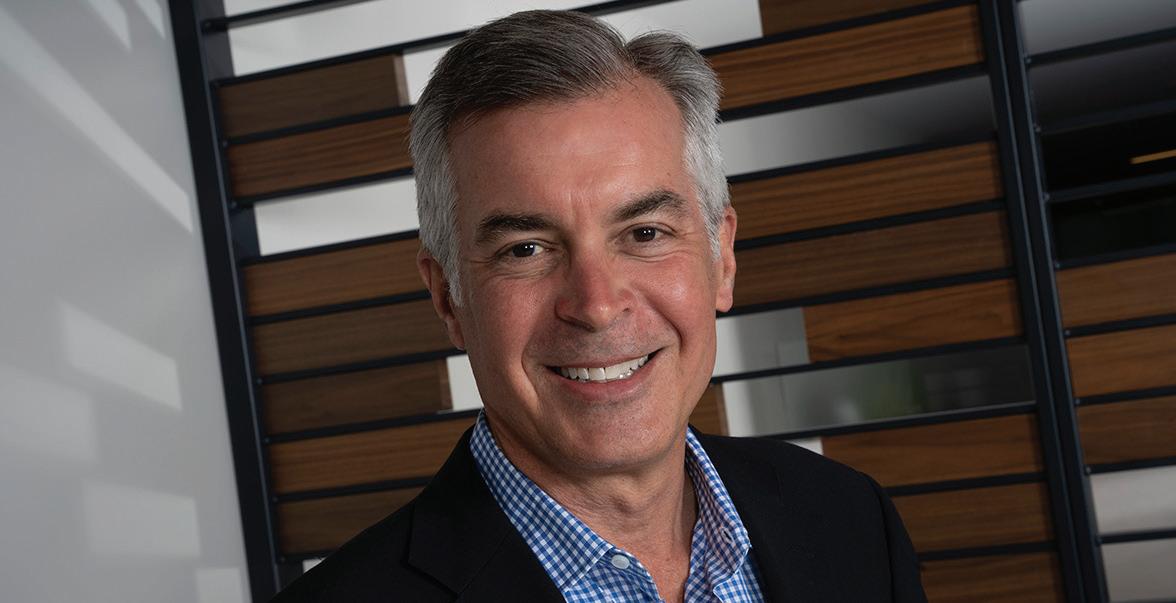



Edwards and Sorensen had known each other previously. “Jeff told me it would be a great place to raise a family, and he’s been absolutely right,” says Sorensen, who was working near Philadelphia at the time. For his wife and five children, “it’s a much better place.”
QHP’s focus on healthcare companies also provides a sense of mission that differs from traditional private-equity investing by a giant institution like BlackRock, he says. “Everyone likes helping patients.”
Sorensen has a bachelor’s degree from Brigham Young University, along with master’s degrees from Harvard University and the Wharton School.
51 JUNE 2023
PHOTO CREDIT: BRYAN REGAN
MICHAEL SORENSEN
ASHTON POOLE
MATT JENKINS
By Kevin Ellis
Business North Carolina collaborated with NC TECH to create the Next Tech Award to recognize North Carolina’s rising stars in our state’s tech and tech-enabled companies. The award is meant to spotlight those individuals who often work in the trenches of an organization, and who keep pushing projects and objectives forward.

Supervisors and colleagues submitted nominations for the inaugural awards and a selection committee picked 10 winners in one of three categories: tech and innovation, tech professional and sales and marketing. The winners solve problems at work, make teams better and contribute in ways that are not a formal part of the job description.
These 30 profiles of the winners share typically what these individuals do at their jobs, their motivations, those who inspire them, advice on how to succeed in tech as well as their passions outside the office. In many cases, those efforts outside work help others or advance a worthy cause, such as encouraging more women to seek job opportunities in technology.
TECH + INNOVATION
JAMES ALBERQUE
GIS, emerging technologies manager | City of Raleigh Raleigh
Alberque’s involvement in geographic information system (GIS) technology dates back to working with the city of Boston while a student at Framingham State University, where he earned a degree in geography. He joined the city of Raleigh 10 years ago and continued his work in the online mapping and property data field. He has created strong relationships across city departments and other local governments, while driving access to technology to help manage economic growth and provide better customer service.
Influence: My team is exceptionally talented and always willing to share knowledge and enthusiasm.
Success in tech: Curiosity and passion
What others say: “(Jim’s) expertise in technology has helped position the city as a technology leader. I often joke about his tendency to ‘nerd out’ on technology, but it really isn’t the technology that excites him, but the technology’s potential to impact the city’s work to make staff more efficient and ultimately provide better services to residents,” says Beth Stagner, assistant director of IT.


Outside work: My wife and I enjoy watching our three children participate in sports and other activities.
MIKE ALBRITTON
senior vice president, cloud | CData Software Durham
Albritton executes CData’s cloud application and product strategy, which provides self-service data connectivity solutions for access to live data from hundreds of on-premises and cloud applications. Users rely on the Chapel Hillbased company to enable advanced analytics, boost cloud adoption, streamline operations, and create a more connected business. Albritton has a computer science degree from UNC Chapel Hill and an MBA from Duke University.
Influence: Gent Hito taught me a lot about building customer-focused products. He taught me how to make a product successful in the marketplace through careful attention to detail, explaining the value to customers, and how to price and sell the product.
Success in tech: Tech is an industry that changes rapidly, and in order to stay current, you must strive to be a lifelong learner and really enjoy what you’re doing. I learn something new every day, which is part of what makes this job very exciting.
What others say: “Mike is responsible for driving our cloud strategy and vision. Mike’s expertise in data technology made him central to the development of our latest product, which impressed our clients with its innovative features and functionality,” says Manish Patel, chief product officer at CData.
Outside work: Events like Spartan races and GoRuck challenges as well as golf, wakeboarding and spending time with my family. GoRuck challenges are team events based on military Special Forces training.


52 BUSINESS NORTH CAROLINA
JAMIE HOWARD VP engineering | Allstacks Raleigh
Howard spent four years in the Army before finishing his computer science degree at N.C. State University. He shifted from wanting to make video games to helping businesses and people achieve goals. “I’ve yet to find anything more professionally satisfying than helping a team come together to be more than the sum of its parts, and seeing how that experience changes people forever,” says Howard. Allstacks uses machine learning and AI models across data to improve software development outcomes.
Influence: “My experience leading soldiers in combat taught me more about the value and mechanics of teams than I thought possible to know. As a result, everything I do is centered around building trust to enable great teams,” says Howard.
Success in tech: The most important character trait is curiosity. Whether it’s about people or tools or business, a desire to know more is eternally valuable. What others say: “From Jamie’s career in the military through his leadership roles at software companies, his career is marked by learning and practicing leadership. After he left the service, he developed his technical skills, and has been combining those with a desire to build and lead great teams to this day,” says Allstacks founder Jeremy Freeman.
Outside work: Playing board games with my family, disc golf and video games.
MANNY LANDRON
VP cloud security | Aligned Technology Group Raleigh

Landron is his company’s information security leader and adviser with expertise in building, securing and monitoring applications and platforms. He has a business administration degree from Campbell University and a master of information technology with a concentration in cyber security from Virginia Tech.

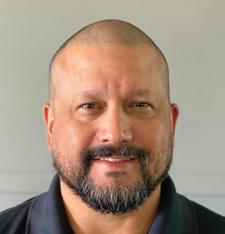

Influence: John Zemonek, managing director of Raleigh-based Aligned Technology Group, has been instrumental in creating an environment that fosters innovation and autonomy, allowing me the freedom to explore new ideas and take risks. His openness to honest communication creates a sense of trust, and I feel comfortable sharing my thoughts and concerns without fear of repercussions. John’s unwavering support for both me and the entire team is truly commendable, as he always has our best interests at heart.
Success in tech: The ability to think rationally, organize people, and communicate up, down, left, and right will always set you apart.
What others say: “Manny’s commitment to the technology community and our clients has made him a critical piece of the success of our team. His lead from the front mentality and focus has enabled our organization,” says Zemonek.
Outside work: Spend time with family, play the violin and hike local trails.
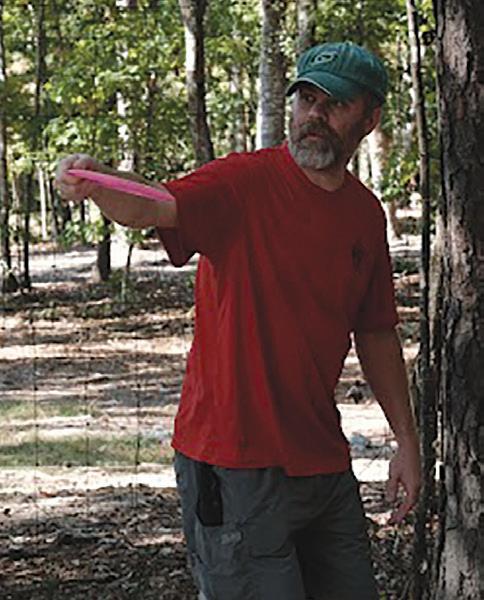
MARTIN KEEN
master inventor | IBM Cary

With more than 350 issued patents, Keen is a co-recipient of the 2023 IBM Carolinas Inventor of the Year award. He is a regular presenter on the IBM Technology YouTube channel, covering topics like AI and data science, amassing more than 1.5 million views. His engaging approach transforms complex IT topics into digestible content. He manages the technical training team, creating digital and classroom courses that support IBM systems. He has a computer studies degree from Southampton Solent University in the United Kingdom.
Influence: Anybody who can take complex technical topics and explain them simply and clearly. To me, that is true mastery in understanding.
Success in tech: Engage with people through your deliverables and communications, and collaborate with domain experts.
What others say: “Our RTP site, while not an IBM Research center, has historically contributed around 12% of those patents each year. Consistently, Martin has been our most prolific producer of those patents coming out of RTP, serving as an inspiration to young inventors at our site. Martin is a joy to work with, always willing to help with tasks above and beyond his job role, especially within our IBM RTP community,” says Tim Humphrey, chief analytics officer, RTP site and N.C. state executive.
Outside work: Keen homebrewed 99 different beer styles in 99 weeks, and documented his products in a weekly YouTube series.
ADA LOPEZ
software development, engineering, security, product management, user experience | Lenovo Durham
A former middle and high school science teacher, Lopez has been with Lenovo since 2021. She previously worked for Cisco and SAS Institute. She is responsible for the daily operations of Lenovo’s Diversity by Design Process, which aims to make products more inclusive, including for the disabled. “By including individuals from different backgrounds, varying abilities, and unique minds in decision-making, we accelerate human advancement,” says Lopez. She serves on the advisory commission of the N.C. State Museum of Natural Science, as a board member of the Hispanics of Lenovo Associations and on the board for Dress for Success. She has degrees in biology and education from Florida International University.

Influence: Lenovo Executive Director Christopher Osborne has invested in my education, promoted my career growth, valued my ideas, and advocated for human-centric innovation.

Success in tech: Technology is constantly changing and evolving. Your future job may not yet exist. It’s essential to continually grow and learn.
What others say: “Ada is impacting our company, but even more importantly, she is impacting the communities we serve,” says Osborne. Outside work: Spending time with my husband, son, daughter and our miniature schnauzers. Also visiting museums, zoos, aquariums and national parks; hiking, bicycling and cooking.
53 JUNE 2023
CRUZ NUÑEZ
senior developer | Code the Dream Chapel Hill
Nunez was brought to the U.S. from Mexico at age 4, and went from English as a Second Language classes to advanced placement. At Durham Tech, he finished Code the Dream’s first round of classes. He eventually led a team of eight software developers. His job helps him promote racial diversity by helping train others.


Influence: “As a kid I heard the hate toward immigrants. Comments like ‘Go back to where you belong,’ and ‘they’re lazy.’ I refuse to let anything hold me back. They didn’t want me. They thought I would fail. I’ll be a winner, a leader, and a role model in society. I’ll kill them with success.”
What others say: “As an undocumented student, he understood his unique struggles and was an activist for immigrant rights. While attending community college, he discovered Code the Dream and completed its inaugural class, despite no prior experience with programming,” says Pamela Bash, director of development for Code the Dream.
Outside work: Strives to hit the gym and lift more weights than the last time. Music, traveling, photography, anime and movies.
JULIA WARD
digital architect | GNC Charlotte
Ward has degrees in chemistry and Hispanic studies from Carnegie Mellon University in her native Pittsburgh. While at school, she did research at the Human Computer Interaction Institute in tech education and learning science, which ultimately propelled her into the technology field. She has been with the health products and supplements company since 2019.
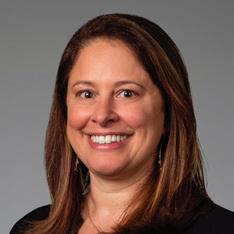
Influence: The opportunity to stay connected to innovation, creative solutions, and cross-disciplinary collaboration has kept me engaged and invested.
Success in tech: The landscape is constantly shifting, at an increasing rate, so it’s essential to show up prepared to listen, learn, and grow.
What others say: “Julia is truly a force-multiplier. Any team automatically doubles in effectiveness, delivers an order of magnitude more quickly and learns a new level of camaraderie from Julia,” says Kevin Fiedler, vice president of infrastructure and operations at GNC.
Outside work: Knitting, crochet, any fiber arts. Guild member of CRAFT, which stands for Charlotte Region Arts Fibers and Textiles, a fiber-arts focused group.
JENNIFER SHEVACH
senior director, engineering | Pendo Raleigh
Shevach helps build highperforming teams to solve complex customer problems. She started at the Raleigh company in 2017 as a backend engineer. Shevach has a bachelor’s degree in computer science from N.C. State University and a master’s in computer science from Columbia University.
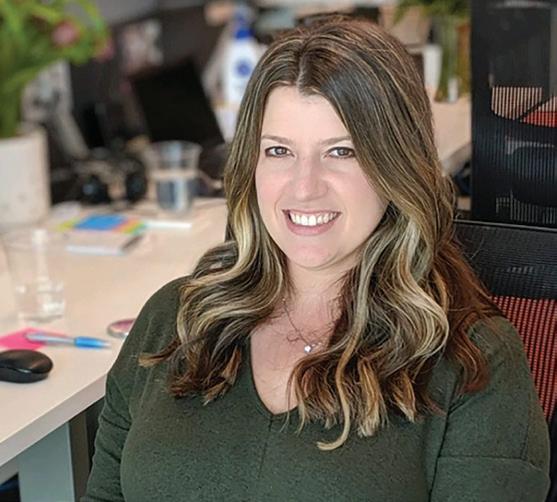


Influence: My husband encouraged me to return to the industry after spending 12 years raising our daughters. He is also in the computer industry and has been a great mentor for me as I have grown into a manager and director.
Success in tech: Teamwork is so important, as is diversity on a technical team. No one person can solve any problem, and you often need to lean on others.
What others say: “Jennifer re-entered the software industry after 12 years as a full-time mom to two special needs daughters and fitness business owner. Her diverse life experiences have inspired a passion for results and constant improvement, whether it be self, product, team, home, or community,” says Alivia Kasumov, a Pendo communications specialist.
Outside work: Visiting North Carolina mountains and using Peloton to stay in shape.

KRISTEN WINTERHALTER
director commercial software | Align Technology
Cary
Winterhalter earned a business degree from N.C. State University, and went to work as a business analyst. When she joined a marketing agency interested in digital marketing, it took her career in a different direction. She joined Align Technology, an orthodontics products company, in 2018, and shifted to the full commercial software stack. “My passion lies in challenging the status quo and continuous improvement,” says Winterhalter. She also has an MBA from the University of Wisconsin Whitewater.
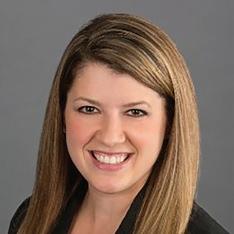
Influence: Whether it’s my family, friends, business partners, or our customers, I am driven by making a meaningful impact.
Success in tech: Tech moves fast. If you aren’t willing to continuously learn and adapt, you will quickly be behind or even obsolete.
What others say: “What really sets Kristin apart is her leadership style. She connects with her team, earning their trust and respect. She inspires her team to work together, communicate effectively, and strive for excellence,” says Eric Brown, vice president of technology, regional chief information officer.
Outside work: Spending time with my husband, kids, two dogs, boating and soaking in the sun. Supporting N.C. State athletics, cheering for my two kids in their sports activities.
54 BUSINESS NORTH CAROLINA
TECH + INNOVATION
ASHLEIGH ANDERSON
Santa steered Anderson toward technology when the jolly elf left her a computer in 1981. She started at Microsoft on the college recruiting team after graduating from Clemson University. “Helping someone find their dream job was such a rush — that’s when I fell in love with recruiting,” says Anderson. Since starting with Credit Karma in 2018, she has helped expand the East Coast headquarters from 50 employees to more than 600. By retooling recruitment, she has doubled the number of historically excluded employees, and within the last 18 months, 25% of Charlotte hires identify as Black.
Influence: My mother was a computer programmer in the 70s and 80s and set an example for what is possible for women when they aren’t afraid to use their voices in spaces where they are underrepresented.
Success in tech: Innovative thinking starts with being critical of your own work and not being afraid to take risks to make things better.
What others say: “Ashleigh’s been especially influential in diversity, equity and inclusion and a key voice of influence as I changed the composition of my leadership team to make sure we had more gender representation across our general managers,” says Credit Karma President Joe Kauffman.


Outside work: Cooking and traveling
JENNY MCLEAN
managing partner | Clarkston Consulting Raleigh
McLean leverages business skills with engineering to transform the operations of global retailers and help them meet strategic goals from organization, to merger and acquisitions, to technology. The Asheville native has helped grow the retail industry into a core service for the Durham-based consultancy. She has electrical and computer engineering degrees from N.C. State University, and a Duke MBA. Her heart remains with the Wolfpack, she says.
Influence: Helping build a community of women at the highest levels of technology leads McLean to focus on mentorship, apprenticeship, and coaching.

Success in tech: Build your skills and expertise — you cannot let yourself get stale in tech. At the same time, be wary of getting distracted by trendy topics. Find the right balance between staying on top of innovation, while also understanding what is needed and what that organization can sustain.
What others say: “Jenny was instrumental in guiding our firm to grow into new service areas, further penetrating Clarkston’s industry expertise in the retail industry, while developing and mentoring new talent,” says CEO Tom Finegan. Outside work: Music festivals, traveling, good wine, and spending quality time with my husband, Tim, and Rose, our rescue pittie.
LIV EVANS project coordinator | Ablr Durham
Evans uses her bachelor’s degree in public health from Tulane University and her master’s in higher education administration from N.C. State University to run administrative, logistics and development programs at Ablr, which aims to place individuals with blindness into high-paying tech jobs. Evans says her job helps bring systemic changes through inclusion.
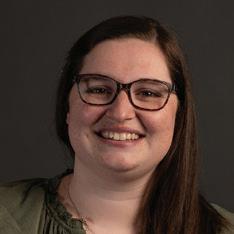
Influence: Ablr’s co-founder and CEO John Samuel pushes us to build toward a more inclusive and accessible world every day.
Success in tech: Embrace that there is always something new to learn and take every opportunity you can to gain more knowledge and experience.
What others say:
“While learning the scope of digital accessibility, she focuses on making the world and workforce a more inclusive place for the disability community. She uses frameworks from both public health and education to drive her work to be human-centered and processfocused,” says Samuel. Outside work: Raising puppies for Canine Companions, a national nonprofit providing service dogs to people with disabilities.
CARRIE MURPHY
director, solutions management | Veradigm
Raleigh
Born and raised in Northern California, Murphy migrated east to attend Florida State University, where she has a degree in information technology. She has been with the Chicago-based company for 20 years, and now manages a portfolio of revenue cycle solutions for healthcare provider clients.

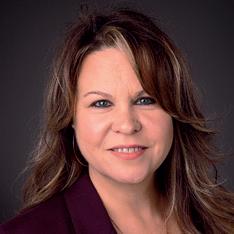
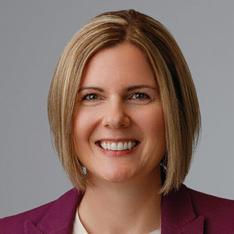
Influence: Witnessing family members face health challenges has instilled in me a passion to leverage technology in order to enhance the quality of patient care and streamline healthcare operations.
Success in tech: Achieving success hinges upon possessing a fervent drive. This fuels the desire to learn and experiment with novel technologies and tools.
What others say: “Her dedication to driving the success of our company and the broader tech ecosystem is truly exceptional,” says Steve Mueller, vice president of solutions management at Veradigm.
Outside work: Visiting Disneyland with my family and watching Florida State football.

55 JUNE 2023
VP, head of global talent acquisition | Credit Karma Charlotte
TECH PROFESSIONAL
TRICIA ORY
senior vice president, finance | Flexential Charlotte
While earning bachelor’s and master’s degrees in accounting at the College of Charleston, Ory found a way to connect the technical and people aspects of the business world. That has helped her, she says, to solve organizations’ complex account challenges. “It’s not just about the numbers,” Ory says. She joined the company in 2010 after previous positions with Continental Tire North America, Arthur Andersen and Deloitte.
Influence: Dave Jones, founder of Peak 10 / Flexential. He accomplished with an empathetic leadership style and inspired me with his entrepreneurial spirit and commitment to building something better.
Success in tech: Focus in Tech — might be redundant, but I think the importance of translational leadership from the technical to every day is critical to help stakeholders understand the underlying challenges and larger picture.
What others say: “Ory is also instrumental in managing strategic M&A motions. All of these activities fortify our positive financial position which is foundational to achieving our goal to double in growth over the next five years,” says Flexential CFO Garth Williams.
Outside work: Spending time in Charleston, South Carolina, embracing the natural wonders of the Carolina Coast, boating, beach and oyster roasts.
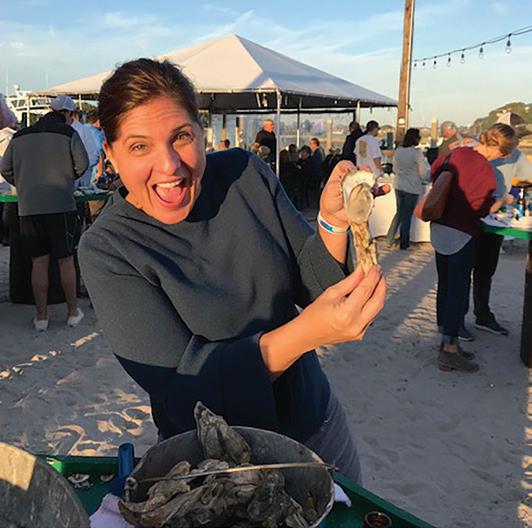
KAUTILY VATS
Delivery director | Benekiva Bermuda Run
The native of India has called North Carolina home for 20 years. Before joining Benekiva in 2021, Vats held leadership positions with Lincoln Financial Group, IBM and Blue Cross Blue Shield. He has led several large-scale digital transformation initiatives to success, and is passionate about digital, cloud and AI technologies. Vats, who works remotely, has an MBA from UNC Greensboro. Iowa-based Benekia helps insurance companies manage claims.

Influence: Adam Grant’s work-life podcast is a must-listen for everyone working in the corporate space.
Success in tech: Focus on problem-solving. There are simple solutions for complex problems.
What others say: “He shares knowledge and best practices with the product team and mentors his team members to help them grow and develop their skills. He demonstrates a strong commitment to continuous learning and process improvements,” says Amanda Kennedy, Benekiva’s human resources and project manager.
Outside work: Avid runner, spending time at his farm in the Appalachian Mountains and F1 racing.
RANDY
SMITH
financial specialist | Office of State Controller Bear Creek
Smith has 34 years experience in state government, starting his career with the Department of Commerce. He also worked for the state Wildlife Commission before starting his second stint in 2015 with the State Controller. The CPA has an accounting degree from UNC Greensboro. His role now involves replacing two 30-plus year mainframe applications with a modern cloud financial system. “I want to help create the future of accounting for the state of North Carolina,” says Smith. Influence: Smith’s late father, Heiskell (pronounced like high school), owned Randy’s Grill, which was named after him, in Siler City. The bookkeeper for the restaurant made a difference in the business, and Smith said working with numbers came naturally to him.
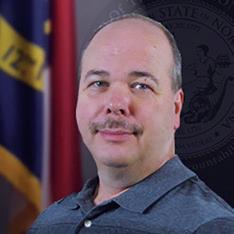
Success in tech: You don’t need technology for technology’s sake; it needs to allow the user to do their task more efficiently and more accurately. You also need a great team to work with and share the common goal of success.
What others say: “Randy is a well‐respected leader who is critical to the success of the (financial services) project,” says John Doyle, managing director of Deloitte Transactions and Business Analytics.
Outside work: Smith and his wife, Lisa, love to travel. He has a goal of visiting all 50 states, and has been to 34. He is music director and treasurer of Faith Baptist Church in Siler City.


CHI VO
diversity, equity, and inclusion manager | CarGurus Durham
Vo came to Durham as an immigrant from Vietnam, which influenced her decision to work in her current role for the Cambridge, Mass.-based automotive research company. “Focusing on diversity, equity, inclusion and belonging in the tech industry allows for that creativity and innovation to flourish and, most importantly, uplifts our people to change the world,” she says. She has a psychology degree from N.C. State University.

Influence: My family came to N.C. when I was young. I missed my parents when they were working 12-hour shifts and overtime to pay the bills. It was never easy for them to be immigrants in this country, but I don’t take for granted that they brought me here and supported me all these years. Their strength, resilience, and generosity are what I hope to bring forth in this world.
Success in tech: A culture of belonging is the key to success in tech. When an organization cherishes and cares for its employees, people can be successful.
What others say: “Her unwavering integrity, dedication to social justice, her communities, and the employees she supports are unsurpassed,” says Ciara Grogan, the company’s senior manager, diversity, equity, inclusion and belonging.

Outside work: Teaching arts and crafts, 3D printing and planting trees.
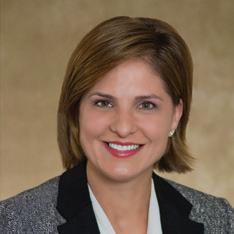
56 BUSINESS NORTH CAROLINA
TECH PROFESSIONAL
CAITLIN WALSH director | KPMG Raleigh
Walsh started her own company after earning a bachelor’s degree in political science and business from Siena College in New York, which paved her path to consulting. She joined KPMG in 2013, and now supports its hiring and business development, while also working with public sector clients. “Supporting the public sector gives my work purpose and meaning. Working in consulting always challenges me to continuously learn to solve complex problems.”
Influence: Adam Grant, an organizational psychologist and bestselling author. His books and podcast changed my view on work life and how to build and lead teams.
Success in tech: Working in tech is about enabling others. A client may come to you for a specific tool or an application, but the problem they are really trying to solve is resolved in a better way. Great communication and understanding the problem you’re being asked to solve will help you be successful.
What others say: “She is passionate about great team culture, which requires building diverse teams that leverage each other’s strengths directed toward a collective goal,” says Young Kim, a KPMG principal in Raleigh.
Outside work: Gardening, beekeeping and traveling around the U.S. in a converted sprinter van with my partner and our dog.
SALES + MARKETING
AMBER COBB
VP Business Development | OnLogic Cary
The East Stroudsburg University graduate leads South Burlington, Vermont-based OnLogic’s efforts to boost revenue and growth for customers. “What I love most about technology is that technology, innovation and invention will always be present but the how and why changes, sometimes daily.” says Cobb.

Influence: “Eight years ago, I was asked a question about being a ‘woman in tech’ on a podcast. It was the first time that I ever thought of myself that way. From that moment on, I looked at myself, my career path, and accomplishments differently. Recognizing myself as a ‘woman in tech’ despite not having a technical education background has made me work harder, become more innovative, and challenged me to make my voice heard,” says Cobb.
Success in tech: Be willing to adapt to that environment. Technological discoveries and new innovations sometimes happen before you fully understand what came before it.
What others say: “Amber is a firm believer in technology being the great equalizer and a champion of emerging and disruptive technology. She is passionate about supporting women and minorities in technology,” says Bryan Zorn, OnLogic’s director of business development.


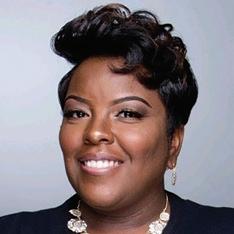

Outside Work: A mom to two beautiful, crazy smart kids, Sophia, 5, and Benjamin, 7, and wife to a supportive husband, Eddie. We are avid board game players, amateur chefs and hockey fans.
 SHARI WHITAKER director of the cloud business office | LexisNexis Raleigh
SHARI WHITAKER director of the cloud business office | LexisNexis Raleigh
Whitaker scored high on her entrance exams while joining the Air Force at age 17, decided to give IT a try, and now has more than 30 years experience in technology. She provides cloud governance and process improvement across finance, security and cloud operations, while also designing, implementing and managing cloud-based solutions. She has bachelor’s and master’s degrees from Strayer University in computer networking and communication technology, respectively.
Influence: “I love solving problems, setting strategy, and developing people passionate about solving problems using technology. I want other women to see someone they can identify with and who looks like them in key or leadership roles. I am passionate about not only increasing the number of women (especially of color) who enter into technology, but also who remain.” Success in tech: Just being tech savvy will not be enough. You will need to complement your tech skills with soft skills like effective communication, leadership, teamwork, problem solving, collaboration, etc.
What others say: “Shari continues to expand her impact within the company, by taking on more and more responsibilities. Shari successfully engages with senior stakeholders and drives the organization to significant cost savings and compliant practices,” says Matthew McKeever, head of cloud engineering at New York-based LexisNexis.
Outside work: Spending time with my family, coaching/mentoring women, traveling, trying new restaurants, and participating in ministry activities.
MICHELLE COVIELLO
VP
of Client Development | Dualboot Partners Charlotte
Coviello joined the Raleigh-basd software and business development company in 2018, and has more than 20 years experience in IT. She is an adviser for NC Tech Association and its ambassador of the year. She’s also a board member of SIM Charlotte, a group of IT professionals who share ideas, philanthropy and leadership development. She graduated from Boston College with a degree in economics.

Influence: My father taught me to aim high, work hard and value your relationships.
Success in tech: Developing soft skills like problem-solving and communicating effectively can help set you apart.
What others say: “Michelle joined our company very early and has helped us grow into a team of over 400 people in five years. I am even more proud of her community involvement. She serves on several non-profit boards and volunteers at many local nonprofits,” says Todd Buelow, principal at Dualboot Partners.
Outside work: Hiking and being outdoors with my family.
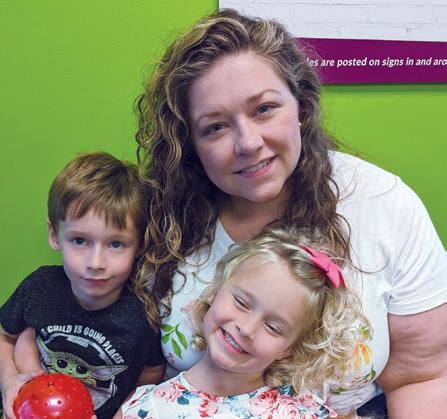
57 JUNE 2023
SAM ELLIS senior sales executive | Slalom Raleigh


Ellis credits his time playing football for the Tar Heels with teaching him teamwork. He has economics and sports administration degrees from UNC Chapel Hill, and also coached college football one year. He started with IBM and has been with Slalom, a Seattle-based tech consulting firm, since 2016.

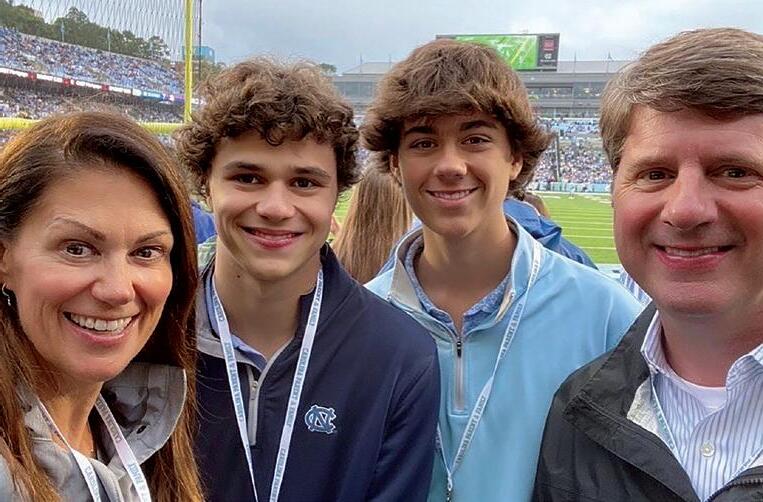
Influences: My family and professional mentors who have invested endless amounts of time in me.
Success in tech: Technology evolves so rapidly, every project and conversation is an opportunity for your next career break. Apply tenacity toward everything you do so you are able to capitalize when opportunity arises.
What others say: “Sam’s passionate about utilizing modern technologies to fuel innovation for his clients. Sam is adept at cultivating relationships and is coveted as a trusted adviser among his clients,” says Todd Christy, general manager at Slalom.
Outside work: Exploring new areas and establishments, watching and playing sports, spoiling my dog, traveling with my wife, live comedy.
JACOB GRAY
systems architect | Cisco Raleigh
Gray joined Cisco in 2013 right after graduating from N.C. State University with a degree in technology, engineering and design education. A part-time job as a technology assistant for a K-8 school while in college fueled his interest in IT/networking. He now works directly with N.C. state agencies to find technical solutions.
Influence: Working for a company like Cisco that is deeply committed to social justice and powering an inclusive future for all.
Success in tech: If you are comfortable with embracing change, you will have a much higher chance of being successful.
What others say: “Jacob is a brilliant technologist, staunch customer advocate and is always willing to go above and beyond,” says Liz McCormick, sales regional manager.
Outside work: Spending time with my wife, Kaitlyn, and our beautiful baby boy, Aaron, born in September. I also race cars at local asphalt short tracks such as Wake County Speedway and Orange County Speedway.

LISA MARIE FERRELL communications officer, North America | Lenovo Raleigh
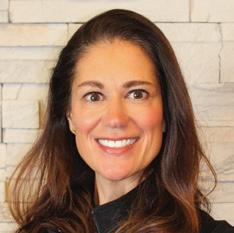
An early adopter of technology, Ferrell started out in sales, but found behindthe-scenes communication and marketing more rewarding. She’s board chair of the March of Dimes and president of the Junior League of Raleigh. Before joining Lenovo in 2019, she was marketing head at UNC Chapel Hill. She has a marketing degree from Roanoke College.
Influence: My team influences me every day. They inspire me, they work tirelessly and they make work fun. I enjoy watching them successfully navigate programs and initiatives that drive Lenovo’s business to new levels.
Success in tech: Dream big and always innovate.
What others say: “Lisa Marie has long applied the genuine caring and concern she has for her family to her colleagues and the greater good of the community. She has elevated how our company engages and connects with customers, tells its story to the world, and works with partners to encourage inclusivity and diversity in our company and the community,” says Gerald Youngblood, Lenovo’s chief marketing officer.
Outside work: Needlepointing, yogi, dog lover and global traveler
VEQUAIN JOYNER
director of business development | CliniSpan Health Durham
Before joining CliniSpan in 2021, Joyner was the youngest-ever unit director for the New Bern Boys and Girls Club. He moved to health care during COVID, and started with Charlotte-based CliniSpan Health because of its mission to expand diversity and equity in clinical studies. Joyner, who holds kinesiology and exercise science degrees from UNC Chapel Hill, oversees CliniSpan’s business development and manages the company’s community initiatives and partnerships.

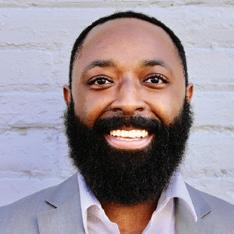
Influence: Seeing my mother work as hard as she did for my sister and me to have a better life without ever complaining encouraged and motivated me to work just as hard as her. She is my superhero!
Success in tech: You have to be willing to fail and not be discouraged. There will be many ideas that you have that you try and may not work out. Never give up after those failures because your next success is only one attempt away.
What others say: “Although this is VeQuain’s first position in the healthcare field, he has been able to effortlessly transition due to his strong leadership and management skills which have transformed our organization,” says Michael Galloway, the company’s chief operating officer.
Outside work: Spending time with my family and participating in adult basketball leagues, also hiking and fishing.
58 BUSINESS NORTH CAROLINA
SALES + MARKETING
MARY JUDGE
director of demand generation | Intelerad Medical Systems Durham
Judge has 12 years experience in sales and marketing, and has been with the Raleigh-based healthcare software company since 2021. Originally from Virginia Beach, she led sales teams before moving to North Carolina in 2015 and joining the UNC School of Government to help generate revenue through sales and product marketing. She has environmental policy and sociology degrees from College of William and Mary and an MBA from N.C. State University.
Influence: Chief Marketing Officer Marissa Carlson taught me what it means to lead a team consistently focused on moving the needle.
Success in tech: Communicate openly and often about every step you’re taking, share each number of progress and each milestone, even the ones you miss. Your peers will respect the transparency, your team will rally behind the goal, and you will learn more about your potential as you push yourself to achieve it.
What others say: “Those that work for Mary appreciate her supportive leadership style, and her peers recognize her for always being willing to jump in to get the job done,” says Marissa Carlson, chief marketing officer.
Outside work: I love living in Durham with my dog, Mango. Huge fan of baseball’s Washington Nationals and Durham Bulls, and a lot of the spring and summer involves enjoying baseball with family and friends.

BECKY SCOTT
total community manager | JumpCloud Morrisville
Scott is a regular speaker to groups on women in tech, innovation and community. She also sits on two tech nonprofit boards, Association of IT Professionals RTP and Carolina Women in Tech Raleigh. Scott has an English degree from San Diego State University, and an MBA from Pfeiffer University. She manages Louisville, Colorado-based JumpCloud’s community outreach. Influence: Former Cisco colleague Ken Russell nudged me to speak in front of ever bigger audiences about how community can help businesses achieve value and connect with customers.
Success in tech: A lifetime of learning keeps you young at heart and makes you a more interesting — and employable — person.
What others say: “At her core, Becky is a community builder, connector of people and resources and an enabler for networking, awareness, outreach, insights, and yes, connections,” says Eric Brown, vice president of corporate marketing at the enterprise software company..


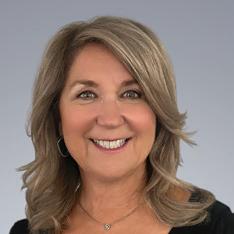
Outside work: Everything from writing to mixed media, a pottery class at Liberty Arts in Durham, reading and hanging out with my 12- and 15-year-old children.
DEBBIE NEAR
enterprise product coach in onboarding team | Jackrabbit Technologies
Charlotte/Myrtle Beach
Jackrabbit provides online class management software to kids’ activity centers on programs ranging from dance to cooking to cheer. Near worked in banking and finance after earning a business degree from UNC Charlotte. She started with Charlotte-based Jackrabbit in 2011.


Influence: The co-founders of Jackrabbit Tech put our core values to work in our company every day.
Success in tech: I am a people person, a not-so-techy person in a tech company. Be able to understand what your client needs. Listen before you talk. Learn how to explain what they need to hear in layman’s terms.
What others say: “Debbie always owns issues yet manages to interject positivity with her team. She has insight into her team and helps team members to see the positive in everything,” says Ray Hayes, sales and onboarding director.
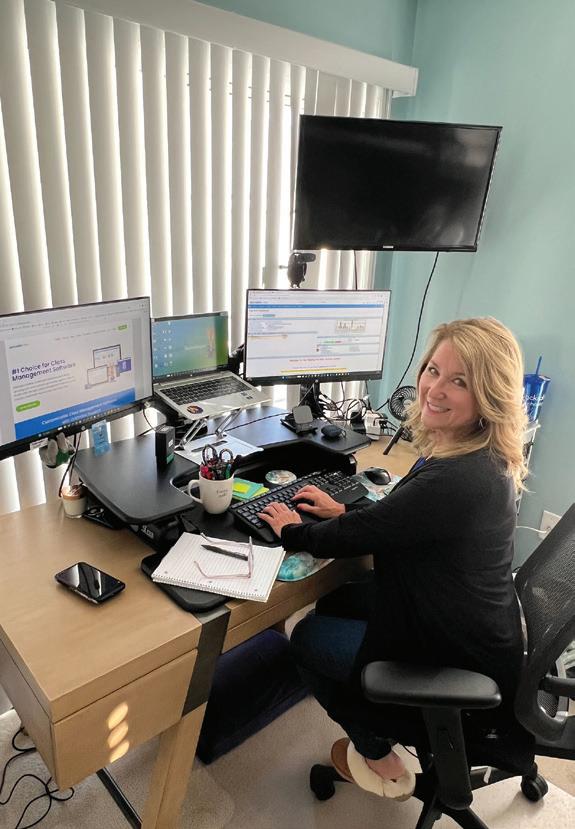
Outside work: I love the beach. I live a half-mile walk away, and this is often my lunch break exercise.
MANNY VELOZA
account executive for the state of N.C. | Dell Raleigh
Veloza is responsible for Dell’s overall relationship with the state and Duke University. He has been with Dell since 2018 and his focus has been on helping the state find better ways of providing service to residents. He has a business management degree from Albertus Magnus College in Connecticut.
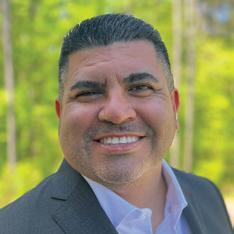
Influences: I have the incredible honor and privilege to have two leaders throughout my career that believed in me, and it helped me redefine what I was capable of.
What others say: “Experienced technologist with a demonstrated history of success. Critical thinker, proactive leader, and blazer of new paths,” says Jeff Fleetwood, Dell regional director for North Carolina.
Success in tech: Everything we do is with the customer’s best interest in mind; then trust is earned. Trust is everything.
59 JUNE 2023
Attracting and retaining employees has never been more challenging, prompting companies to make unusual efforts to build strong workforces. Business North Carolina’s annual list of Best Employers highlights companies that rank highly in their efforts to motivate teammates and draw strong employees.
The program recognizes the state’s best places to work with a unique awards program for small, medium and large companies that are taking steps to build positive, enduring cultures. These companies will be honored during a June 22 dinner and awards ceremony at the Grandover Resort in Greensboro.
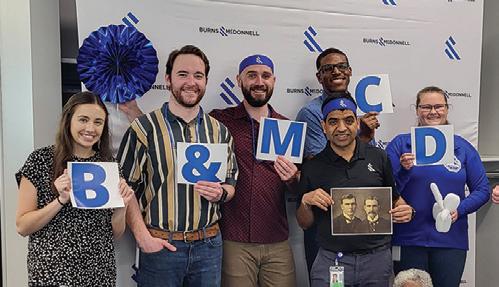
We partnered with the DataJoe market research company to create and implement a survey that polled employers and their employees. The survey covers essential workplace topics, including organizational health, leadership, engagement, work-life balance, pay, training, benefits and corporate social responsibility. Employment numbers are as of Jan. 1, 2023.
First Bank
Southern Pines
EXTRA LARGE EMPLOYERS (300+)

financial services | 1,470 employees
Mike Mayer, CEO
The biggest North Carolinabased community bank operates 118 offices across the Carolinas. During its “Good Deeds Week,” First Bank gives $20 to each employee and asks them to use the money to perform a good deed in the community. First Bank also matches employee donations to nonprofits and offers employees flexible work-from-home practices.
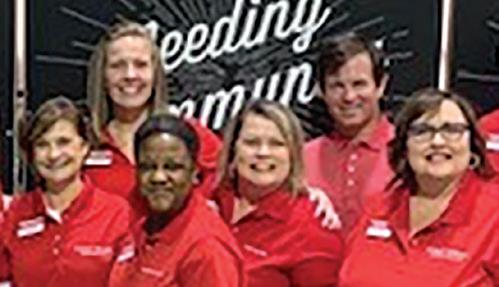
Furnitureland South
Jamestown

retail furniture store | 600 employees

Jeffery Harris, president and CEO
Billed as the world’s largest furniture store, Furnitureland South partners with more than 1,000 manufacturers to sell products from a 1.3 million-square-foot showroom, which includes 300,000 square feet of outlet space. The company has an on-site fitness center.
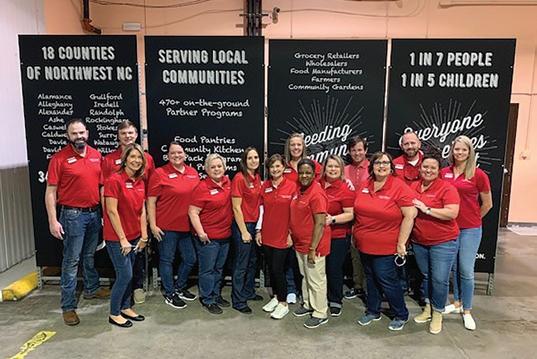
Workplace Options
Raleigh workplace consultant | 366 employees



Alan King, president and CEO
In more than 40 years of business, consultants at Workplace Options have worked with 116,000 organizations to help more than 79 million employees find solutions to workplace stresses. Programs support physical and emotional needs. Employees consult with businesses over corporate mindfulness, tobacco cessation and other issues.
Wilmington Health
Wilmington medical practice | 1,000 employees
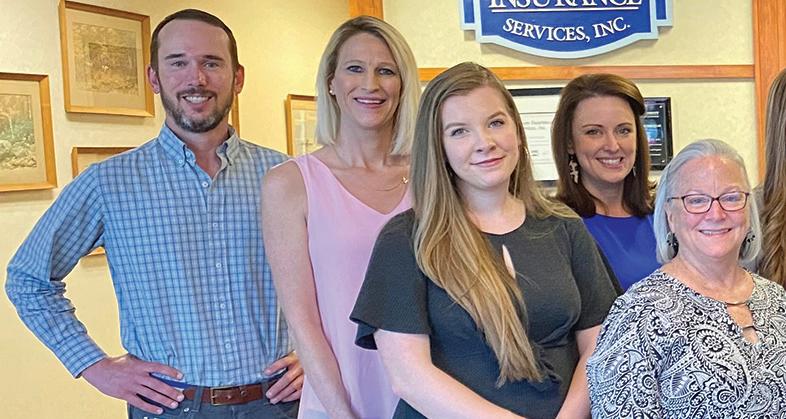
Jeff James, CEO

The largest physician-owned and multi-specialty practice in southeastern North Carolina helps develop new treatments and medications for patients with more than 50 clinical trials underway. The company’s vision is to develop collaborative solutions that demonstrate quality, reduce the cost of care and improve the patient experience.

60 BUSINESS NORTH CAROLINA
Aspida
Durham insurance company | 130 employees
Lou Hensley, CEO and president
LARGE EMPLOYERS (76-299)
Jackrabbit Technologies
Huntersville

workforce to: “Get $#!+ Done, Do It with Moxie, and Have Fun.” Employees committed to building a future together is part of the story of Aspida. With offices in Durham and Bermuda, the insurer gives its employees datadriven tech solutions to help customers while applying an entrepreneurial spirit.
Bobbitt Construction
Raleigh general contractor | 104 employees
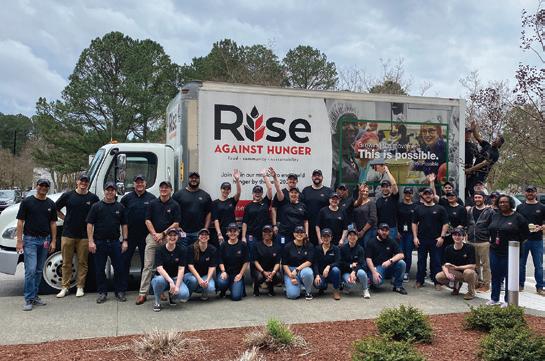
Brian Denisar, president and CEO
The general contracting business offers its employees flexibility, inclusivity and security. In 2000, Bobbitt became 100% employee owned after creating an employee stock ownership plan 20 years ago. When Bobbitt partnered with former N.C. State quarterback Devin Leary and linebacker Drake Thomas in a name, image and likeness deal last year, employees got in on the fun with a video. The company helps sponsor golf tournaments and food banks and teaches high school students about construction at various events. Female employees were treated to a wine tasting night in support of Women in Construction.
Smith Anderson Law Firm
Raleigh law firm | 250 employees
Bill Wiggins, executive director
The full-service business and litigation firm provides legal services to both start-up companies and those considering billion-dollar IPOs. Founded in 1912, it has clients in 45 states and 26 countries, and about one-third of its approximate 150 attorneys have experience with either national or international firms, allowing them collectively to punch above their weight. The Wake County Bar Association named Smith Anderson its 2021 Equity Champion.
software solutions | 110 employees
Mark Mahoney, CEO and co-founder
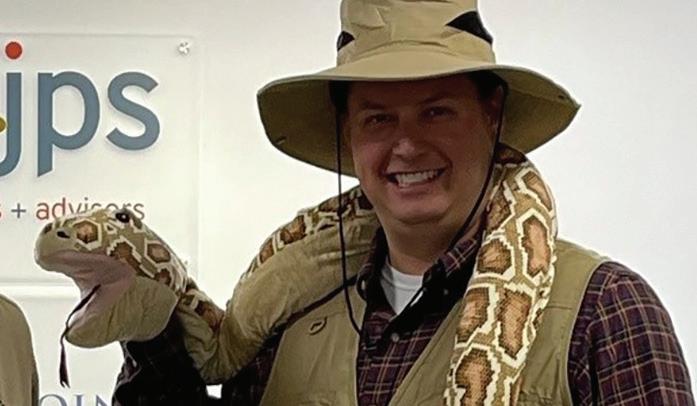
Mike Carper, CTO and co-founder
A love of sports coupled with technology skills helped the founders create an online classroom management program that now reaches 15,000 schools in 36 countries. Youth activity centers can access programs in gymnastics, swimming, music and more, while helping them with billing, immunization management, and registration. A parent portal gives notice of new skills learned and payment options. Jackrabbit has a 100% remote workforce.
Summit Credit Union
Greensboro
financial services | 112 employees
Sam Whitehurst, CEO
The credit union has eight full-service financial locations and serves 37,000 individual members and 300 business partners. It started as Tri-City Telco Credit Union in 1935. Community events include a “Taste of Reality Fair” where members can bring their children for a financial “adulting” class. Each Friday, the credit union spotlights a scholar in college on its Facebook pages to build camaraderie.
North State Bank
Raleigh community bank | 181 employees
Larry D. Barbour, founder, president and CEO
The community bank that opened in 2000 is passionate about community and has sponsored Summer Salute, which allows its team to raise funds for a cause while having a good time. Since 2004, more than $1.9 million has been donated to Transitions LifeCare.
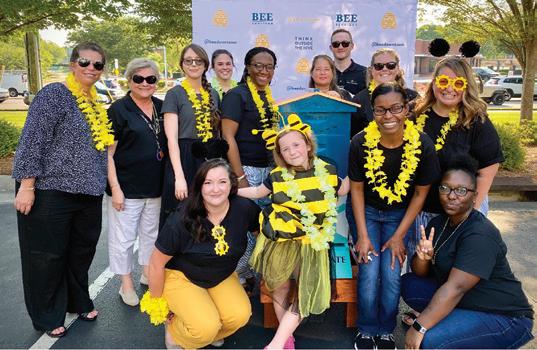
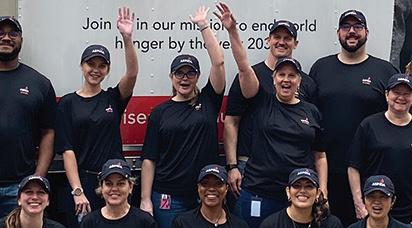

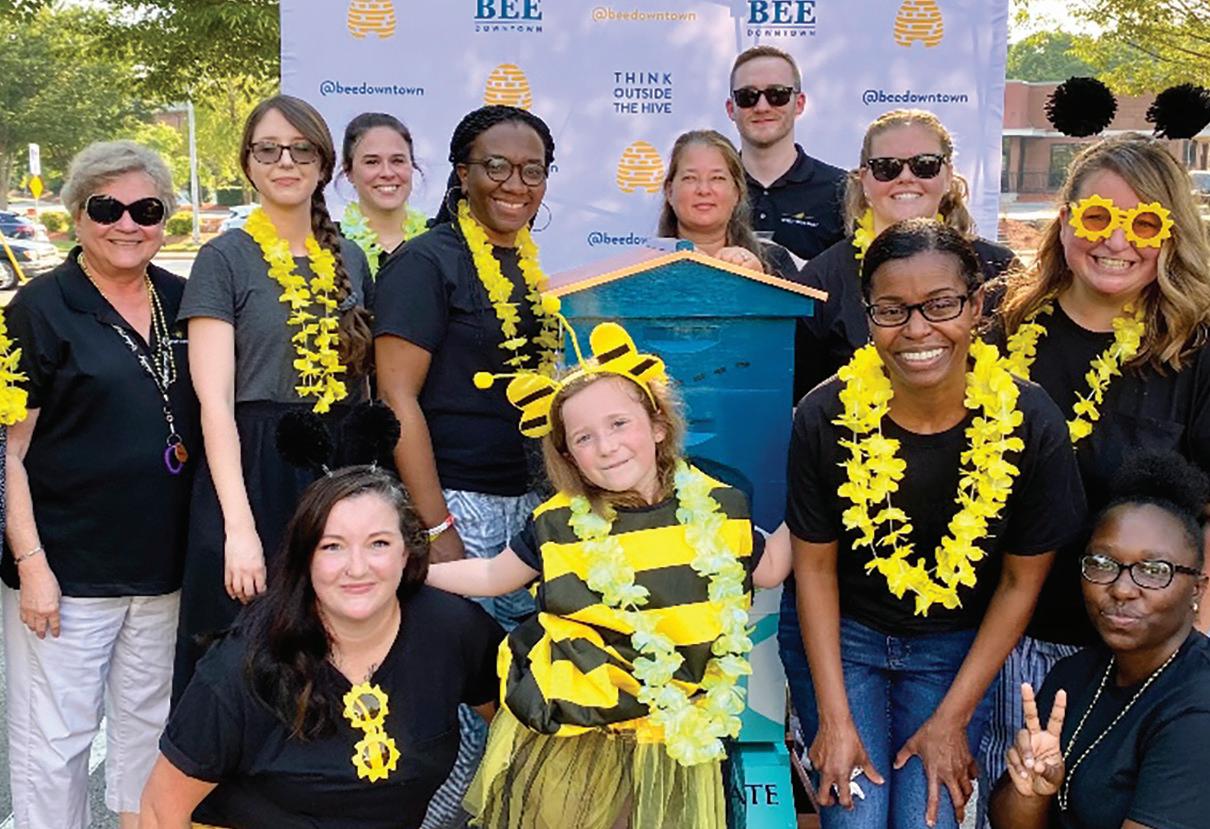
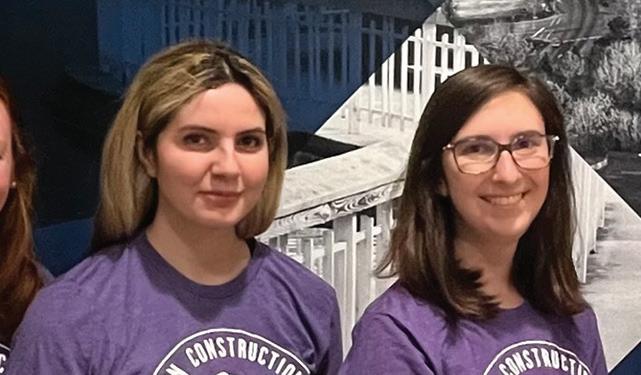
BEST EMPLOYERS 2023 61 JUNE 2023
Burns & McDonnell
Raleigh construction and design | 94 employees

Ray Kowalick, CEO
As an employee-owned firm, Burns & McDonnell provides generous year-end, performance-based incentives during profitable years. Performance appraisals form the basis for salary adjustments, incentive bonuses, career planning and development, promotions, transfers and training. The company offers a choice of three medical plans.
Brunswick Electric Membership Corp.
Supply
electric cooperative | 200 employees
Josh Winslow, general manager and CEO
The enterprise, which was started in 1939, has 85,000 members and serves Brunswick, Columbus, Bladen and Robeson counties. The utility provides two $5,000 college scholarships each year and matches up to $50,000 in donations to help those facing difficult financial times to pay their utility bills. It operates two community solar farms and leases panels to its members who want to go green.
Bernard Robinson & Co.
Greensboro
accounting firm | 200 employees
Alisa Moody, CEO
The company notes that descendants of the firm’s first three clients in 1947 remain customers. The late Bernie Robinson started the company in a one-room office in downtown Greensboro, and it now has offices in Greensboro, Charlotte, Dunn, Raleigh, Wilmington and Winston-Salem. The founder’s son, Freddy Robinson, is a partner, while Moody became CEO in 2018.
Dogwood State Bank
Raleigh financial institution | 112 employees

Steven W. Jones, CEO
Between its board and executive management team, Dogwood’s leadership has more than 200 years of combined banking experience. The state-chartered community bank has about $1 billion in assets. In 2019, Dogwood completed a $100 million recapitalization in a push toward growth. Its seven branches stretch from Morehead City to Charlotte.
Schunk
Morrisville
tools and automation technology | 130 employees
Milton Guerry, president
The family-owned company recently celebrated 30 years of operating in the U.S., initially opening an office in 1992. In 1996, the company added its first plant outside of Germany in Morrisville. Chairman Henrik Schunk ran the company’s Intec unit there for many years. It makes equipment used by manufacturers in many industries. Flexible working hours are offered.
TransImpact
Emerald Isle business intelligence solutions | 78 employees
Berkley Stafford, CEO
Using the motto that happy employees make good customers, the supply chain consultants stage quarterly outings that include fishing trips, islandwide scavenger hunts and bowling. The headquarters has cornhole boards and bicycles available for nearby rides. Gym membership reimbursements are offered. Employees spent 1,378 hours on community projects in 2022, most of it on paid time off. The company’s benefits include pet insurance.
HonorBridge
Winston-Salem
nonprofit organ donation and tissue recovery | 180 employees
 Danielle Niedfeldt, CEO and president
Danielle Niedfeldt, CEO and president
The state’s largest organ procurement organization provides a benefits plan that includes 100% paid medical benefits, paid holidays, a professional development program that promotes growth and a life balance account that funds employee spending for wellness activities. A new Donor Care Center was recently constructed.
BEST EMPLOYERS 2023 62 BUSINESS NORTH CAROLINA
Tencarva Machinery
Greensboro
industrial equipment supplier | 124 employees
Ed Pearce, president
The industrial pump equipment distributor has provided solutions throughout the Southeast region since 1978. Tencarva, which started with 19 founding members, gives its team members opportunities for growth and performance-based bonuses.
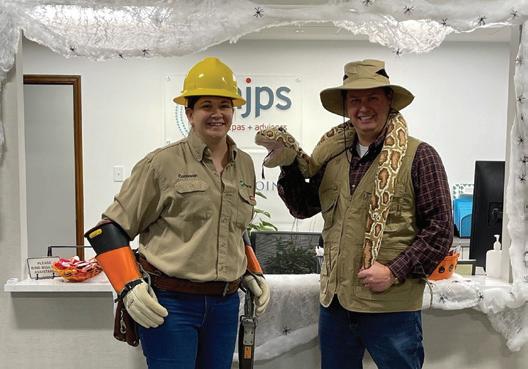


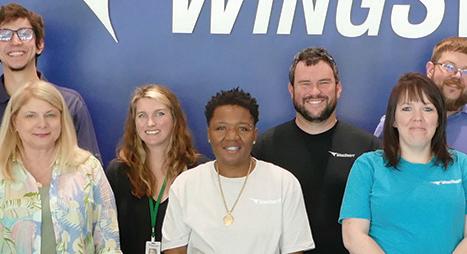
Barringer Construction
Charlotte
builder | 171 employees
Glenn Barringer, owner

Through the annual Wake County Connect for Success program, Barringer led an all-female team of high school carpentry students who spent a week learning about construction work. The company fosters a positive work environment by holding bring-your-pet to work days, gingerbread house builds over the holidays and recognizing Women in Construction week. Workplace outings include fitness events, clay target shooting and Bacon and Brews. The company also assists the American Red Cross, Habitat for Humanity and Dress for Success.
DMJPS
Greensboro
tax & accounting firm | 165 employees
Michael Gillis, co-CEO
Ben Hamrick, co-CEO
Morton Motor Express
Greensboro
trucking | 48 employees
David Morton, CEO
The business, which has offices in seven N.C. cities from Wilmington to Asheville, offers activities such as chair massages, catered lunches, omelet stations, contests, team volunteer days and various onsite and virtual gatherings. The team also enjoys reduced work schedules from midApril through December, along with fully remote work flexibility, time and funding for professional development.
Epes Logistics Services
Greensboro
cargo transportation | 177 employees
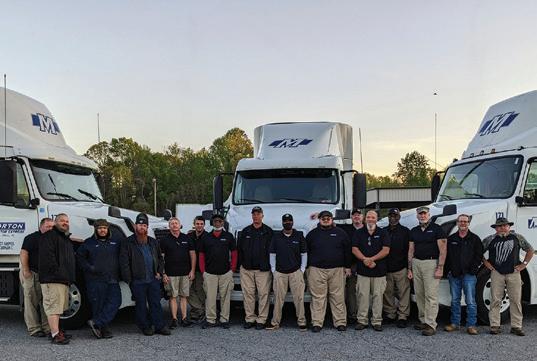
Jason Bodford, CEO
Company culture is values centered and leadership works to ensure that employees fulfill daily goals with integrity, constant improvement, customer satisfaction and financial stability in mind. The cargo transportation company offers flexibility, freedom and work-life balance, upward mobility and a positive workplace culture.
MEDIUM EMPLOYERS (30-75)
Management at the familyowned company has a goal of remaining in constant contact with employees, greeting drivers and others face-to-face at the start and end of shifts. Getting everyone together means trying to hold cookouts at the terminal on a regular basis and annual breakfast meetings. With the risk of COVID decreasing, management is planning a return to outings, including a paintball event to help employees de-stress. The company fosters a culture of one team with a common goal equals success for all. Drivers are eligible for monthly performance bonuses.
Granite Insurance
Granite Falls
insurance company | 31 employees
Cameron Annas, CEO | Chase Keller, president
The company’s primary focus is to empower its clients by offering ongoing risk management advice for individuals and their businesses. Granite uses Officevibe, an online program that measures employee satisfaction and engagement. Fun days are offered twice a year and a coffee and leadership roundtable is held each month.
IIANC
Cary trade association | 35 employees
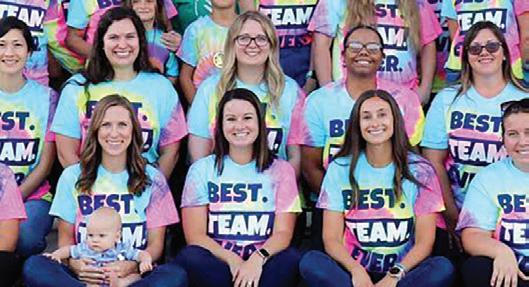
Aubie Knight, CEO
The Independent Insurance Agents of North Carolina provide employees with a work-life balance that includes offering flexible schedules and both remote and in-office work. The Cary office has a gym, while employees take part in regular staff outings. It has a diversity committee and offers a diversity scholarship program.
BEST EMPLOYERS 2023 63 JUNE 2023
Carolina Therapy Connection
Greenville
health and wellness | 73 employees

Cindy Taylor, CEO
The physical and speech therapy group aims to create a fun, fulfilling culture that lets team members have a voice and work flexibility. The company creates “employee roadmaps” that track personal and professional career journeys, aspirations and goals. The Taybuck Program recognizes team members for extraordinary performance. Receiving a Taybuck allows for a spin on a wheel for prizes and a chance for a monthly cash drawing.
Highland Roofing
Wilmington
roofing contractor | 65 employees
Jeanette Omdalen, CEO
A rare female-led roofing company, Highland stresses its commitment to take work seriously while making sure employees can get home in time to watch their kid’s baseball game or other activities. Weekend barbecues build camaraderie and take-home vehicles are included as a benefit. A recently launched master technician program offers higher pay opportunities for skilled workers.
Graham Personnel Services
Greensboro employment agency | 50 employees
Gary Graham Jr., CEO
Cornerstone United
Hickory insurance agency | 55 employees

Donna Weikel, CEO
Since 1973, the warranty solutions company has partnered with agents, dealers, manufacturers, distributors and auctions and served clients in the automotive, marine, HVAC, home electronics industries, among others. The insurance agency provides its employees with the ability to work from home, if needed.
Blackman and Sloop
Chapel Hill accounting firm | 39 employees
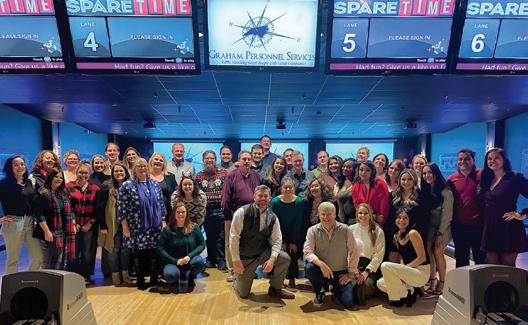
Andrea Woodell Eason, president and managing principal
The CPA firm formed in 1973 aims to mitigate burnout and promote balance for the team by offering half-day Fridays, reduced summer hours, coaching and mentoring programs, a flexible, hybrid work environment and employee events. A wellness committee coordinates walking clubs and cooking and boxing classes. A finder’s fee for bringing in new business is offered.
The Nottingham Company
The company’s mission is to match great people with great companies, which is accomplished by using individualized approaches such as recruitment process outsourcing based on each company’s needs. Graham also offers onsite staffing management to oversee and manage the workforce under its temporary staffing model.
Zoe Dental
Asheville
dentist | 31 employees
Perry Stamatiades, founder and CEO
The dental company, whose name stands for “life” in Greek, wants to change how people view dentistry. The business aims to show compassion for its customers beyond dental care, including sharing life moments together. One client referred to the female staff as “Charlie’s Angels” and noted their “wonderful, cheerful dispositions.” Employees receive free dental care and opportunities for mission trips.
Rocky Mount
financial and administrative operations support | 31 employees
Frank “Kip” Meadows III, CEO
Many employees chose to continue to work from home or have a hybrid schedule after the pandemic, which has been a benefit and expanded the workforce, but also made it harder to continue regular meals together. Employees stay connected through regular check-ins and special events. Management gives employees a half-day off on their birthdays. Employees also formed a Meals on Wheels team to deliver food to the elderly and help ensure Rocky Mount families can provide Christmas gifts for children.
Martin Starnes & Associates, CPAs.
Hickory accounting firm | 70 employees
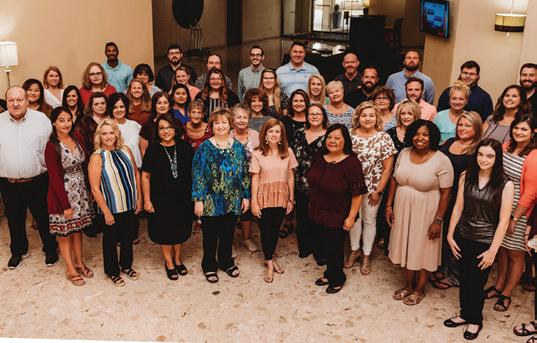
Victoria A. Martin, managing partner and president
Through special hiring initiatives, the accounting firm has adapted to the current labor market by attending events such as HKY4vets’, a career fair for military veterans who are transitioning into civilian life. Attending high school career days promotes accounting to young students. Work-from-home opportunities and flex days May through December are offered.
BEST EMPLOYERS 2023 64 BUSINESS NORTH CAROLINA
Swinerton
Charlotte
construction company | 54 employees
Jared Hoeflich, vice president and division manager
Eric Foster, CEO
The San Francisco-based contractor emphasizes employee ownership, demonstrating its investment in their financial success and well-being. It has received national honors for its employee development programs, leadership coaching, and internal career advancement. Business resource groups ensure that voices of employees are heard by leadership.
Delta Dental of North Carolina
Raleigh
dental benefits | 30 employees
Curt Ladig, president and CEO
WingSwept
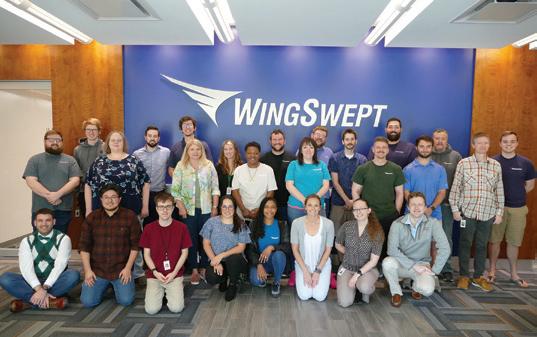
Garner business services | 79 employees
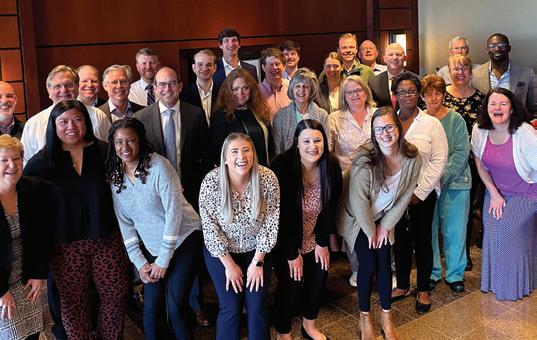
Jay Strickland, founder and CEO
The managed IT and app development company offers a profit-sharing plan to motivate and reward employees’ contributions. A host of events and activities aim to boost connections, including trips to the Kings Dominion amusement park and table tennis and billiards tournaments. Individual team members also plan impromptu game and movie nights.
The organization regularly holds staff events such as all-associate meetings, holiday celebrations, and other training opportunities to build a strong culture. The Culture Club is composed of associates from various departments who work together to provide fun activities and other touchpoints to keep the team communicating. A competitive benefits package is offered.
Heritage Signs & Displays
Charlotte commercial signage | 30 employees
Joe Gass, CEO
The veteran-owned-and-operated corporate interior branding and event signage company seeks to honor God by serving others. Gass is a second-generation family business owner who has led the company since 1988. It has offices in Charlotte, Washington, D.C., and Louisville, Kentucky.
Williams Mullen
Raleigh
law firm | 66 employees
Calvin “Woody” Fowler Jr., president and CEO
David Paulson Jr., managing partner, Carolinas
Golden Corral
Raleigh restaurant | 58 employees
Lance Trenary, CEO
The nation’s largest buffet-style restaurant company is set to celebrate 50 years in the business with two new concepts, a steakhouse and a fast-casual restaurant. Trenary is immediate past chair of the National Restaurant Association. Annual pay increases, work-from-home opportunities and a family-oriented culture are company highlights. The GC Cares nonprofit helps employees facing financial hardships due to illness, natural disasters or unforeseen tragedies.
Wolfe Homes
Greensboro renovation and construction | 54 employees
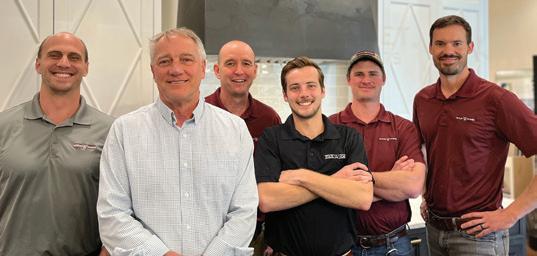
Alex Wolfe, CEO
This family-owned company shows its appreciation with gift cards on employee birthdays and a meal fixed and delivered during a hardship. Every other month outings, from picnics to a Greensboro Grasshoppers baseball game, allow employees to bring their families, too. Quarterly meetings help employees keep up with the business, and

First day employees are asked about the community organizations they feel passionate about, and then told that giving back to those groups helps create a balance between life and work. Team activities include annual firm family engagement outings, on-site weekly yoga classes and Friday breakfast, featuring treats from local restaurants.
Wednesday lunches in the breakroom help employees keep up with the business, and Wednesday lunches in the breakroom help employees visit with one another. Regular food truck visits keep employees in touch with subcontractors and each other. Management feels taking care of employees trickles down to satisfied clients.
National Coatings
Raleigh
commercial and industrial painting | 100 employees
Zeb Hadley, president & CEO
Hadley implemented a $10,000 sign-on bonus to attract new talent and to incentivize employees. When employees submit referrals and the recruit stays for one year, the employee receives $5,000. Instead of paying recruiting firms, the painting contractor takes a family-oriented approach, predicated on investing in employees and building a stronger culture.
BEST EMPLOYERS 2023 65 JUNE 2023
Healthcare Management Consultants
Salisbury
healthcare consultant | 16 employees
Thomas “Tom” Loeblein, president and CEO
SMALL EMPLOYERS (1-29)
A Monday through Thursday work schedule gives every weekend a bonus. Wellness efforts, such as work from home opportunities and flextime, were highlighted when the company received recognition and received the Novant Health Corporate Health Cup in 2022.
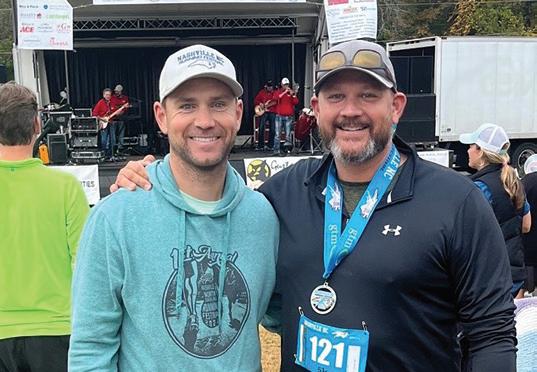

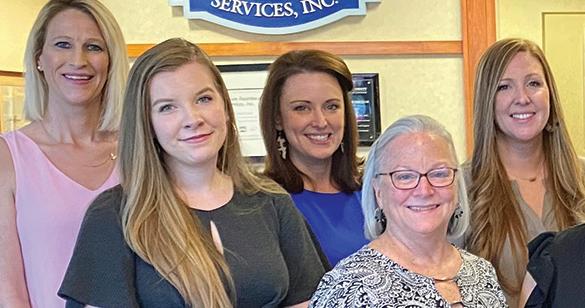
SylvanSport
Brevard
camping gear manufacturer | 27 employees
Tom Dempsey, CEO
With the goal of making outdoor adventures more accessible, the company was created in 2004. The business incorporates its idea of selling fun to customers with its employees by hosting regular events like kayaking and “lake days” in the warmer months. The company partnered with Make-A-Wish in North Carolina after hearing about a 9-year-old girl in Brevard suffering from heart disease who dreamed of a beach camping trip. They build engagement between workers and customers by hosting community movie nights.
Marcellino & Tyson
The Brooks Group
Greensboro
sales training services | 21 employees
Spencer Wixom, president | CEO
The Brooks Team uses facilitators with successful backgrounds in sales to teach others about selling. Employees have unlimited PTO, which helps with creating a work-life balance, and the ability to assume new roles in the organization.
Global Tax Management
Wilmington
corporate tax services firm | 5 employees

David Sekula, CEO and executive director
Tax consulting is a tight labor market, requiring the company to maintain a flexible, hybrid work environment. The company is 100% employee-owned and supports employees by offering policies such as a 12-week parental leave that can be used incrementally over the first year of birth or placement. Giving back to communities is important through events such as a sponsorship of an annual Special Olympics running festival in Nashville, N.C., and annual toy drives for kids at Christmastime.
Charlotte law firm | 21 employees

Matthew Marcellino, Jennifer Moore and Bryan Tyson, equity partners
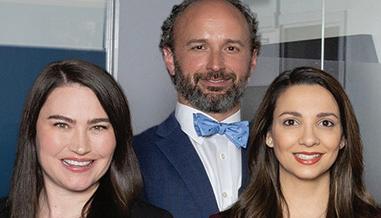
VPC Builders
Banner Elk builder | 27 employees
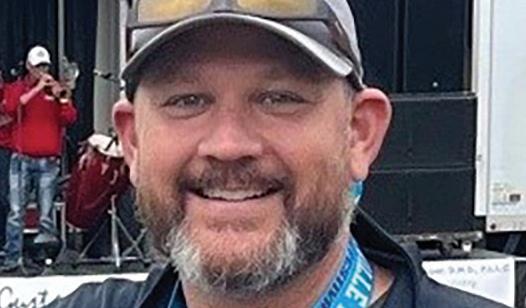

Matt Vincent, manager
Before the pandemic, Marcellino & Tyson permitted employees to work remotely, providing them laptops and cloud-based technology. Some employees can still work remotely. The firm also manages burnout by telling employees they are a 9 a.m. to 5 p.m. office, with no weekend work, and it provides a monthly budget for networking and gym memberships.
Each employee receives 16 hours paid time off annually to volunteer for a nonprofit organization in the community. Many employees are native to the area and they help with organizations like Feeding Avery (County) Families and local schools. Employees donate time to weatherize homes and build them with Habitat for Humanity. Matt Vincent recently won the National Association of Home Builders / Young Professionals Award for the Southeastern United States.
BEST EMPLOYERS 2023 66 BUSINESS NORTH CAROLINA
Johnson Insurance
Mocksville insurance agency | 22 employees
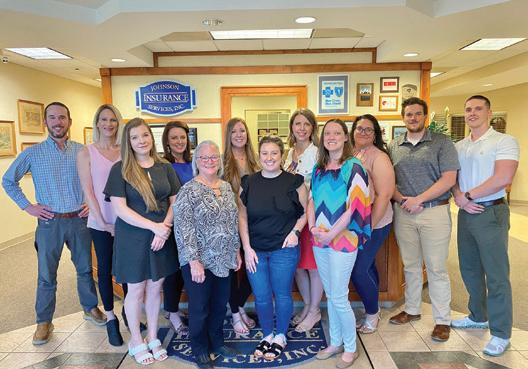
Wes Johnson, CEO and co-owner
Jessica Yarbrough, chief operating officer and co-owner
Parrish & Partners
Charlotte engineering consultants | 23 employees
Jeff Kirby, president
Company leaders build teamwork through company outings to ax-throwing establishments or a bus tour of wineries in the Yadkin Valley. An annual two-day workshop brings all of the employees together each year for training, food and entertainment. Work from home options are available to employees. More than 85% of employees have completed or are enrolled in advanced designation courses to continue their professional development.
Foxquilt Insurance Services
Charlotte
insurance technology | 7 employees
Karim Jamal and Mark Moeissette, co-founders and co-CEOs
The company has offices in Canada and Charlotte. Flexible hours give workers a balance. There’s a respectful workplace environment that allows for its employees to succeed. Flexibility also offers a healthy work-life balance.
Four Saints Brewing Company
Asheboro brewery | 11 employees

Joel McClosky, CEO
The transportation engineering company’s culture emphasizes collaboration, input of others and recognition for good work. The company also encourages an effective work-life balance.

STG Solar

Pisgah Forest
solar energy contractor | 25 employees
Mike Kilpatrick, CEO
New employees get brought onto the team with a “welcome basket” as a token of appreciation for their work installing solar panels and providing maintenance. Employees partner with schools on breakfast and lunch programs for needy children and take part in highway litter pickup campaigns. The dog-friendly workforce works with area shelters to help pets find their forever home, often dressing up the pups in STG Solar swag.
Cube Creative Design
Asheville marketing services | 6 employees
Adam Bennett, founder, CEO
Xtern Software
Greensboro software development | 12 employees
Keir Davis, president
More than work experience, personality, work ethic, and team mentality are key. Those who align with the brewing company’s values and are willing, able, and determined to learn new skills are the best fit. The brewer is a progress partner with the Guilford Green Foundation, a LGBTQ advocacy group. Workers are also trained to respond to sexual harassment through Safe Bars.
Rather than 9 to 5, employees work their own schedules, do it from home and can live anywhere they want. The flexible schedule is a big selling point for this team of graphic designers, web developers and content strategists. The team also has just one team meeting a week via Zoom so they work independently.
The website designers and digital marketing company counts “four dogs” among its staff of humans. The tight-knit group has weekly team lunches or can be caught together tossing a Frisbee at a park or engaging with the community through volunteer and civic organizations, which employees list as part of their online bios. The Better Business Bureau awarded the company its Torch Award for ethics in business.
Tayloe Gray Agency
Wilmington
PR and marketing | 15 employees
Matt Vincent, manager
Two nonprofit organizations per year get pro bono work from the marketing and advertising agency. Organizations helped by the agency include nonprofits helping children dealing with cancer, the homeless, a no-kill dog sanctuary and the local public radio station. The Wilmington office has a game room that includes foosball, a pool table and golf simulator. Online bios of employees lists a “special talent,” such as spreading sunshine, and the types and names of their pets.
BEST EMPLOYERS 2023 67 JUNE 2023
EXPECT NATIONAL EXPERTISE AT LOCAL MARKET VALUE
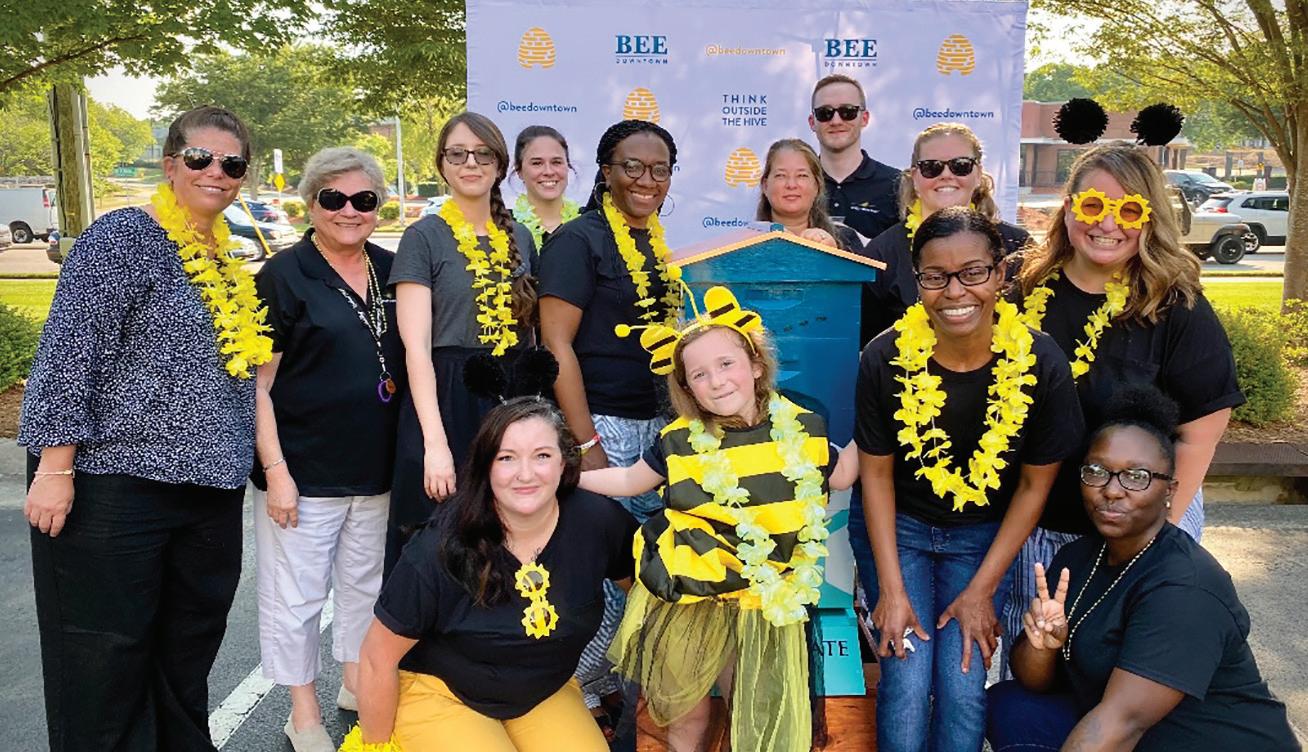

Smith Anderson is a full-service business and litigation law firm serving regional, national and global companies in corporate and transactional; banking and finance; intellectual property; litigation; real estate development; regulatory and public policy; employment; and private client areas. We are the largest law firm headquartered in the Triangle region of North Carolina and one of the largest in the state. More than one-third of our attorneys have joined us from national and international firms, providing businesses with a highly experienced and deep bench of support at favorable local market rates. It’s our client-focused culture and forward-thinking insights that have shaped Smith Anderson for 110 years as we help guide our clients toward success. Learn more at SmithLaw.com.

Those two words begin to tell the story of North State Bank. We believe in hiring the best and empowering those individuals to reach their fullest potential both in and outside the office. We believe in the sustained momentum that is created when team members strive to be their best each day. Our vision is to serve our team members, customers, communities, and shareholders for generations.
To learn more about North State Bank and our career opportunities, visit NorthStateBank.com.
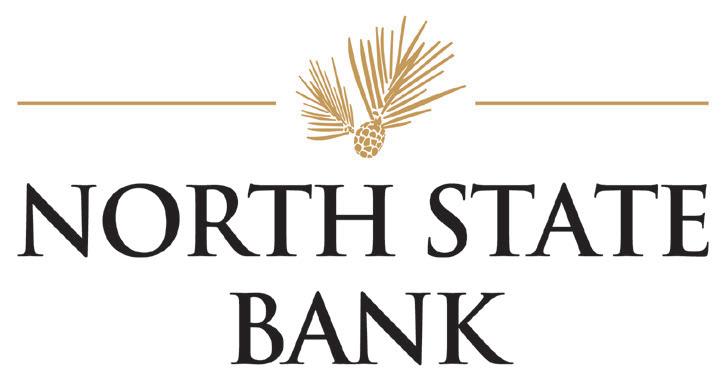
68 SPONSORED SECTION BEST EMPLOYERS 2023
150 FAYETTEVILLE STREET, SUITE 2300 | RALEIGH, NC 27601 | SMITHLAW.COM
6204 FALLS OF NEUSE ROAD | RALEIGH, NC 27609 | 919-855-9925 | NORTHSTATEBANK.COM
BETTER. EVERYDAY.
For more than 50 years, Delta Dental of North Carolina has championed healthy smiles across the state as North Carolina’s leading dental insurer. A member of the Delta Dental Plans Association, we are part of the largest dental insurance network in the nation, covering more than 80 million Americans. Today we are pleased to provide both dental and vision insurance administered by VSP® Vision Care to businesses as part of their employee benefits, and directly to individuals and families.
At Delta Dental of North Carolina, our mission is to improve the oral health and the overall wellbeing of the communities

we serve. As a not-for-profit dental insurer, we fulfill our mission in two ways: first, with the largest network of dentists in North Carolina and throughout the United States, we provide the broadest access to more affordable oral care for employer groups and individuals in North Carolina. Second, we believe that everyone deserves a healthy smile. Through our foundation, we help the underserved in our communities who do not have access to oral care. The Smiles for Kids program was started in 2011 and since that time, the program has awarded more than $758,000 to programs across the state,
ensuring that 467,000+ children and their families receive access to oral health care or education. From the mountains to the coast, we are committed to improving the oral health and overall well-being of all North Carolinians.
Learn more about:
Delta Dental of North Carolina deltadentalnc.com
DeltaVision® deltadentalnc.com/deltavision

69 SPONSORED SECTION BEST EMPLOYERS 2023
3737 GLENWOOD
SUITE 320 | RALEIGH, NC 27612 | DELTADENTALNC.COM
AVENUE,
Wilmington Health is proud to provide TRUE Care in Southeastern North Carolina. Our patients make all the difference. We appreciate the trust they’ve put in us for more than 50 years as their partners in optimal health.
We also value the No. 1 reason for that: our people! Our providers and other compassionate, talented staff have honored us in a big way. Wilmington Health has made Business North Carolina magazine’s Best Employers in North Carolina list.
It’s all because of what our employees revealed in survey responses — and
it means a lot to us. As the largest physician-owned primary care and multispecialty practice in Southeastern North Carolina, we believe that collaboration is essential. Our providers are experts in comprehensive, coordinated health care approaches. Wilmington Health uses evidence-based medicine to achieve the highest quality of care.
And that’s what it means to provide TRUE Care to our patients. We do so with an array of specialists and innovative health care approaches. WH Research, revered for more than 20 years, leads
clinical trials in our region. Wilmington Health offers more than 50 in-progress studies at any time. We strive to support the development of new treatments and medications. The result: better outcomes and excellent value for our patients.
We’re honored to share this Best Employers in North Carolina distinction with many incredible businesses in the state. And we’re committed to providing TRUE Care for our patients — which our employees can be proud of, too.

70 SPONSORED SECTION BEST EMPLOYERS 2023 1202 MEDICAL CENTER DRIVE | WILMINGTON, NC 28401 | 910-341-3300 | WILMINGTONHEALTH.COM
POSITIVE IMPACTS WITH ONE GUIDING PRINCIPLE: BE GREATER
DMJPS PLLC likes to Be Greater. Formed to make a positive impact by one guiding principle Be Greater, this CPA + Advisory rm strives to create greater opportunities for its clients, people and communities. And they do.
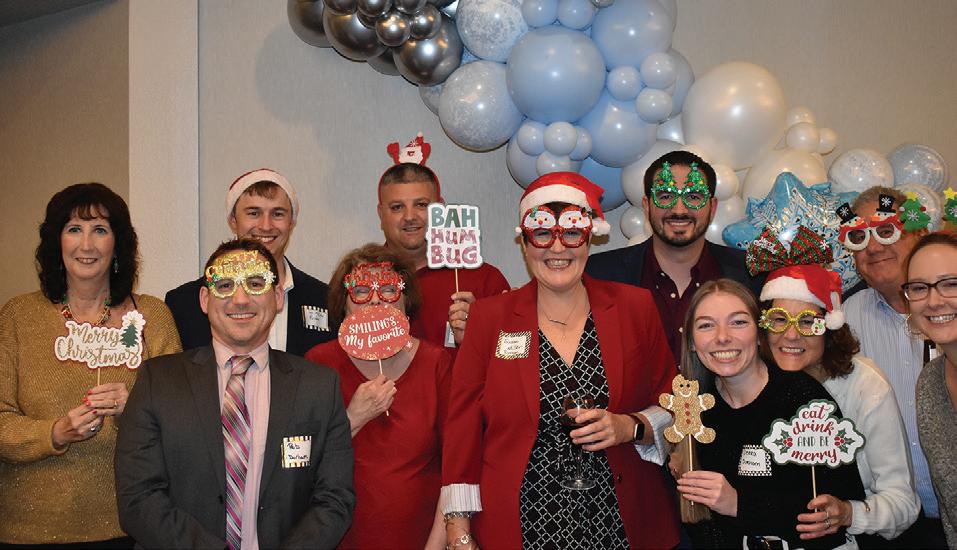
DMJPS is a tax, assurance, and advisory rm that routinely solves complex nancial matters for individuals, privately-held businesses, nonpro ts, and corporations.

e rm has a North Carolina mountains to the coast footprint and serves local, regional, statewide, multistate, and international clients in a wide range of industries.
Using client-speci c tailored solutions, a team of 165+ is taking DMJPS into the future using advanced technologies, specialized industry knowledge, and a strong commitment
to meaningful client relationships.
DMJPS strives to Be Greater by prioritizing its people. e rm provides bene ts such as reduced work schedules from mid-April through December 31; 401k pro t-sharing contributions; ex work scheduling; fully remote work opportunities; time and funding for professional development; as well as generous volunteer, holiday and PTO hours.
Fun rm events range from lively holiday celebrations and seasonal costume contests to competitive chili and soup cook-o s. Employee Appreciation Days are a hit with an assortment of chair massages, omelet stations, ice cream Sunday bars, and catered lunches.
DMJPS has an uncompromising commitment to their clients. Striving to help



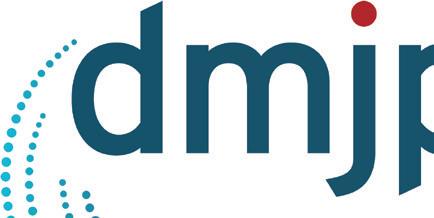
clients Be Greater, the team aims for seamless communication in creating tailored solutions to meet each client’s unique needs. Clients enjoy the bene ts of a personal approach from a team with deep industry knowledge and expertise, advanced technology and proactive communications on in uencing laws and interpretations.
Community engagement is important at DMJPS. Each of the rm’s 7 locations are rmly rooted in their communities –investing time and energy to make each a better place to live, work, and Be Greater. Every team member is encouraged to participate in company-wide volunteer days and utilize their paid personal volunteer time.
DMJPS likes to Be Greater. Learn more at dmjps.com.
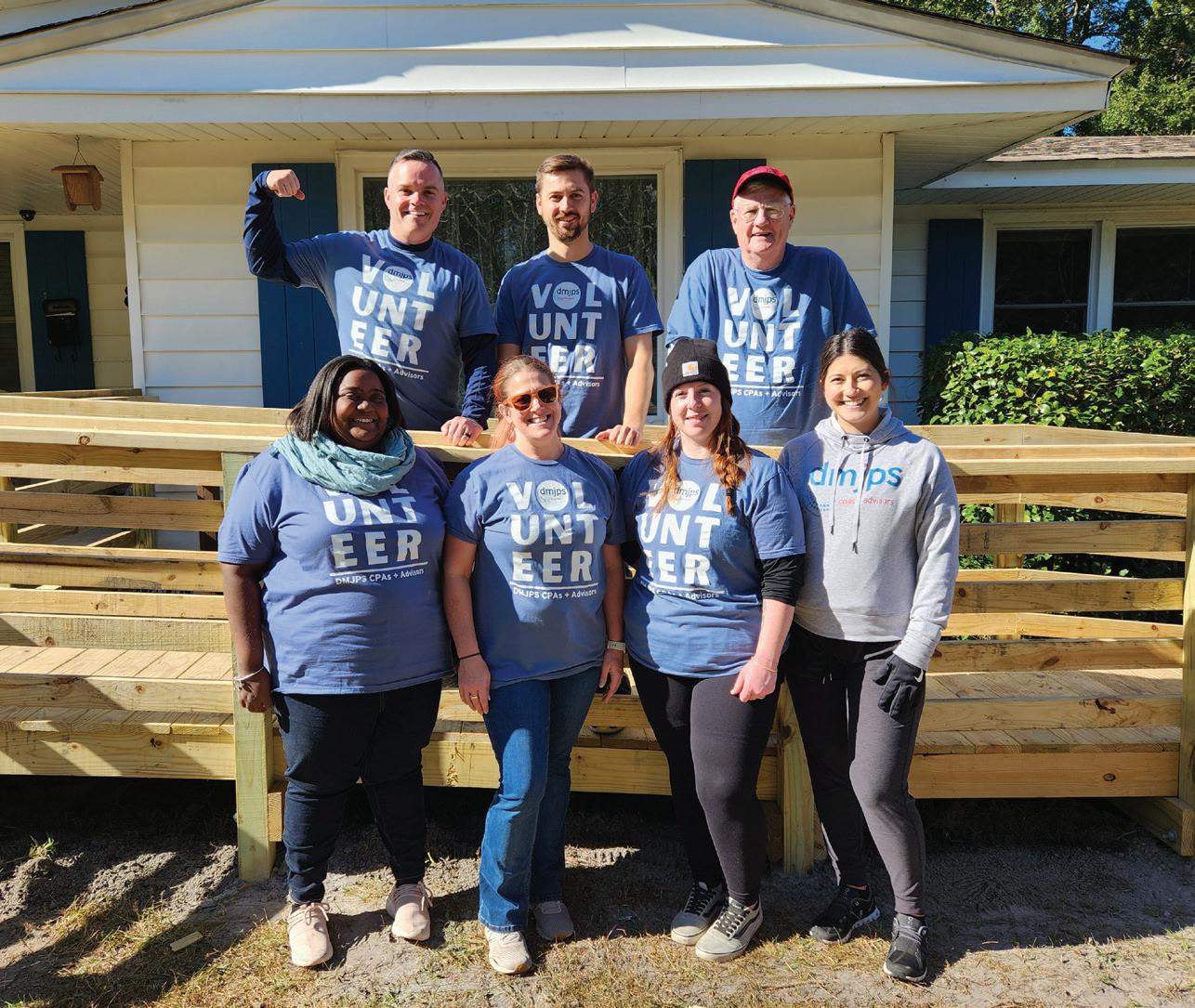
71 SPONSORED SECTION BEST EMPLOYERS 2023
GREENSBORO
| ASHEVILLE | BOONE | MARION | DURHAM | SANFORD | WILMINGTON | DMJPS.COM
THE POWER OF PEOPLE
At First Bank, we believe in the power of people in our community. For nearly 100 years, we’ve been changing lives by giving the communities we serve access to the financial services and education they need in order to thrive. Rooted in the Carolinas, our goal is to help our customers with their financial needs and build relationships with them and our neighbors. We invite you to learn more about us at any of our First Bank branches or localfirstbank.com.

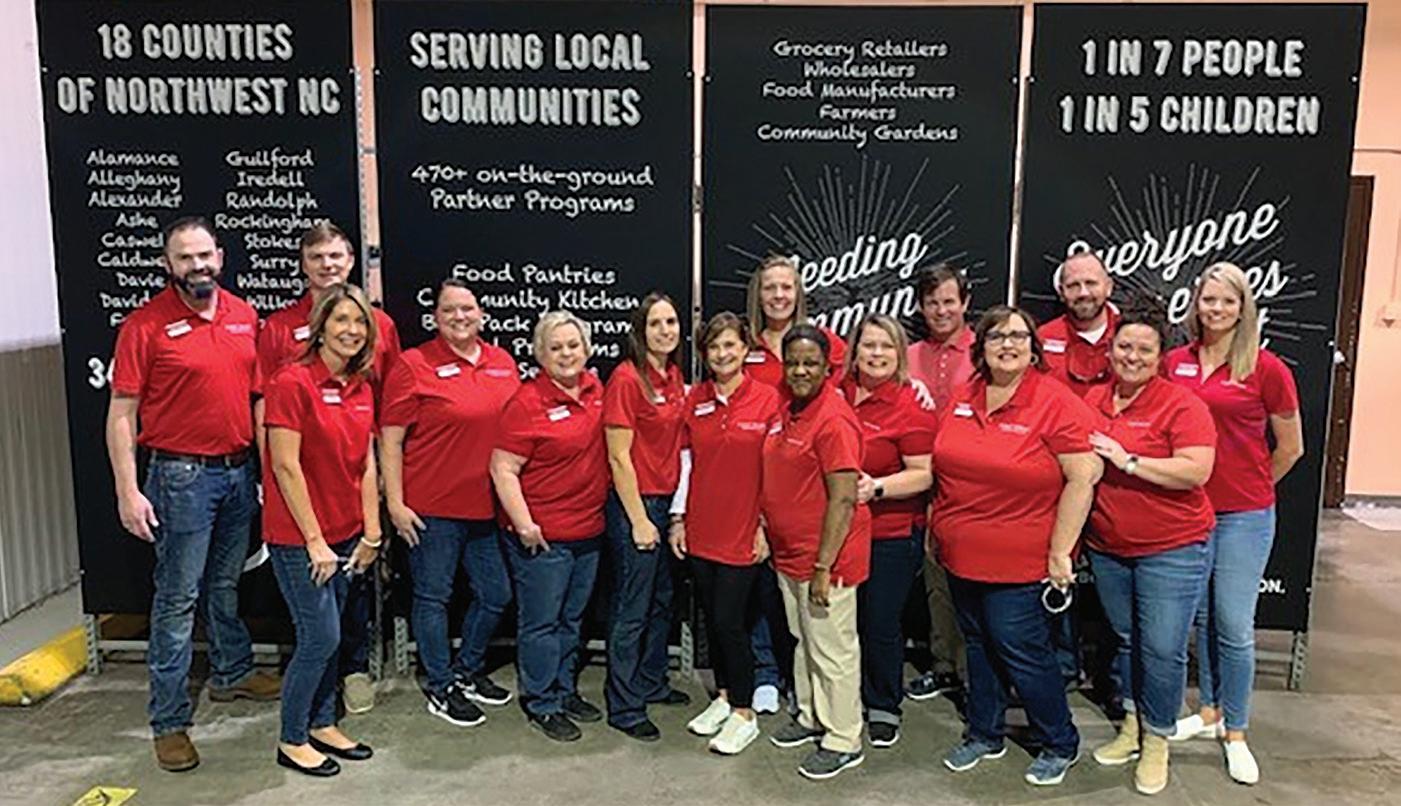
POWERING A BRIGHTER FUTURE
Committed to a brighter energy future, Brunswick Electric provides safe, reliable and affordable energy to the homes, schools, farms and businesses in eastern North Carolina. Since our founding in 1939, we’ve added 110,000 accounts while maintaining our commitment to enrich the lives of those living and working in the community we serve. We are very proud to be selected by our employees as one of The Best Employers in North Carolina.

72 SPONSORED SECTION BEST EMPLOYERS 2023 795 OCEAN HWY W | SUPPLY, NC 28462 | 910-754-4391 | BEMC.ORG
300 SW BROAD STREET | SOUTHERN PINES, NC 28387 | 866-792-4357 | FIRSTBANK.COM
INTEGRITY, EXPERIENCE & QUALITY
While National Coatings’ story began more than two decades ago, each day feels like a new beginning and another opportunity to unite in our e orts to ful ll the company’s vision. It’s an additional day for more than 100 team members to embody our core values, which are dedication, integrity, team player, and pursuit of excellence. Having our core values lay the foundation for the team’s output has enabled us to provide premier, professional painting, wallcovering, sandblasting, and industrial coating services nationwide. With o ces in Boise, Bozeman, Denver, and Raleigh, we successfully completed projects in 32 states in 2022 for clients in various industries, such as retail, government, hospitality, healthcare, and education to name a few.
It’s a success that was made possible thanks to our greatest asset — our team. Our approach to workplace culture builds on our core values, which are also vital for all human beings. is commitment not only ensures alignment with the company’s vision but it also ensures everyone has a similar mindset and it inspires purpose. We’re committed to investing in our people because we know it leads to healthy individuals who will in turn have a vested interest in the growth and sustainability of the company. e goal is to drive the business through the core values, which exist beyond a poster on the wall. is creates long-term value for all stakeholders. We treat our team how we want customers to be treated, they in turn pay it forward to clients. Our value
is in our team, and building community internally, through a host of activities and incentivizing sta , is important.


At National Coatings, we aim to get 1% better each day, which creates a ripple e ect to other stakeholders such as consumers, communities, and partners. To put it simply, impact lies in relationships, and it starts at home with our team and extends to our clients, many of whom have become like family.
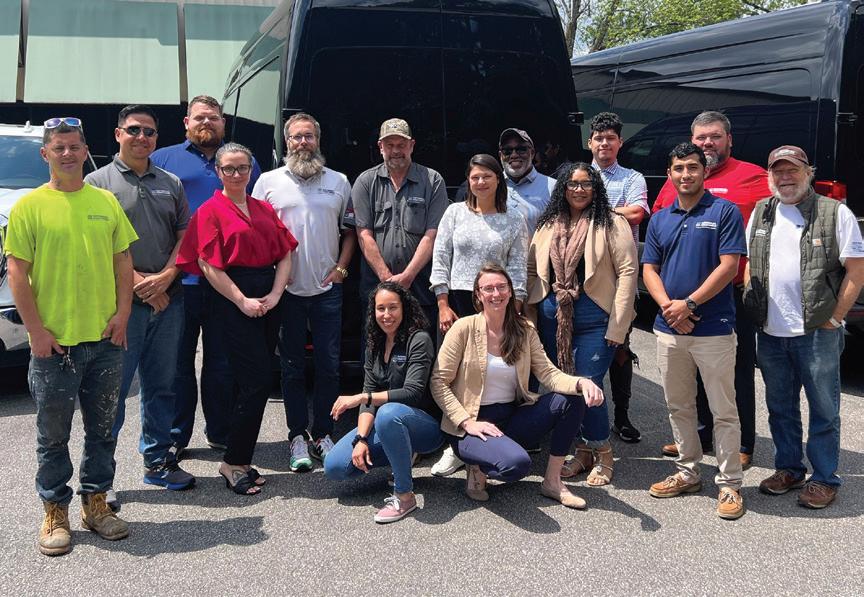





LOCATIONS:
Raleigh – Corporate Office

Raleigh – Operations Office
Denver, Colorado
Boise, Idaho
Bozeman, Montana
73 SPONSORED SECTION BEST EMPLOYERS 2023 5115 NEW BERN AVE, STE 110 | RALEIGH, NC 27610 | 919-755-1400 | NATIONALCOATINGSINC.COM
The New Bern office team (above) and a recent commercial project, Cone Health MedCenter Greensboro at Drawbridge Parkway.
DRIVING GROWTH THROUGH INNOVATION
At IIANC, we are the strategic business partner to our nearly 1,000 Trusted Choice® independent insurance agency member locations around North Carolina. With a large focus on shared company values, office culture and morale, we ensure that our staff can achieve the ultimate work-life balance, including a flexible schedule with both remote and in-office work, excellent benefits, an in-office gym, and fun staff outings, to name a few. This year we launched 101 Weston Labs, an insurtech accelerator focused on innovations specifically for independent insurance agents. Our staff embraces the IIANC vision: to lead our members into a prosperous future by driving change, fostering innovation, and providing them with cutting-edge solutions. Our employees are passionate to help independent agents grow their businesses throughout North Carolina.

Williams Mullen is a business law firm with 440 employees in offices across North Carolina, South Carolina and Virginia. Our clients’ success is at the forefront of what we do, and we are proud to have a strong team of attorneys and staff committed to providing exceptional client service. We know that Williams Mullen only succeeds when we foster an inclusive environment where our team feels supported, can contribute meaningfully and be their authentic selves. We offer our employees opportunities to learn, grow and find their own yes.
We celebrate the inclusion in Business North Carolina’s Best Employers.
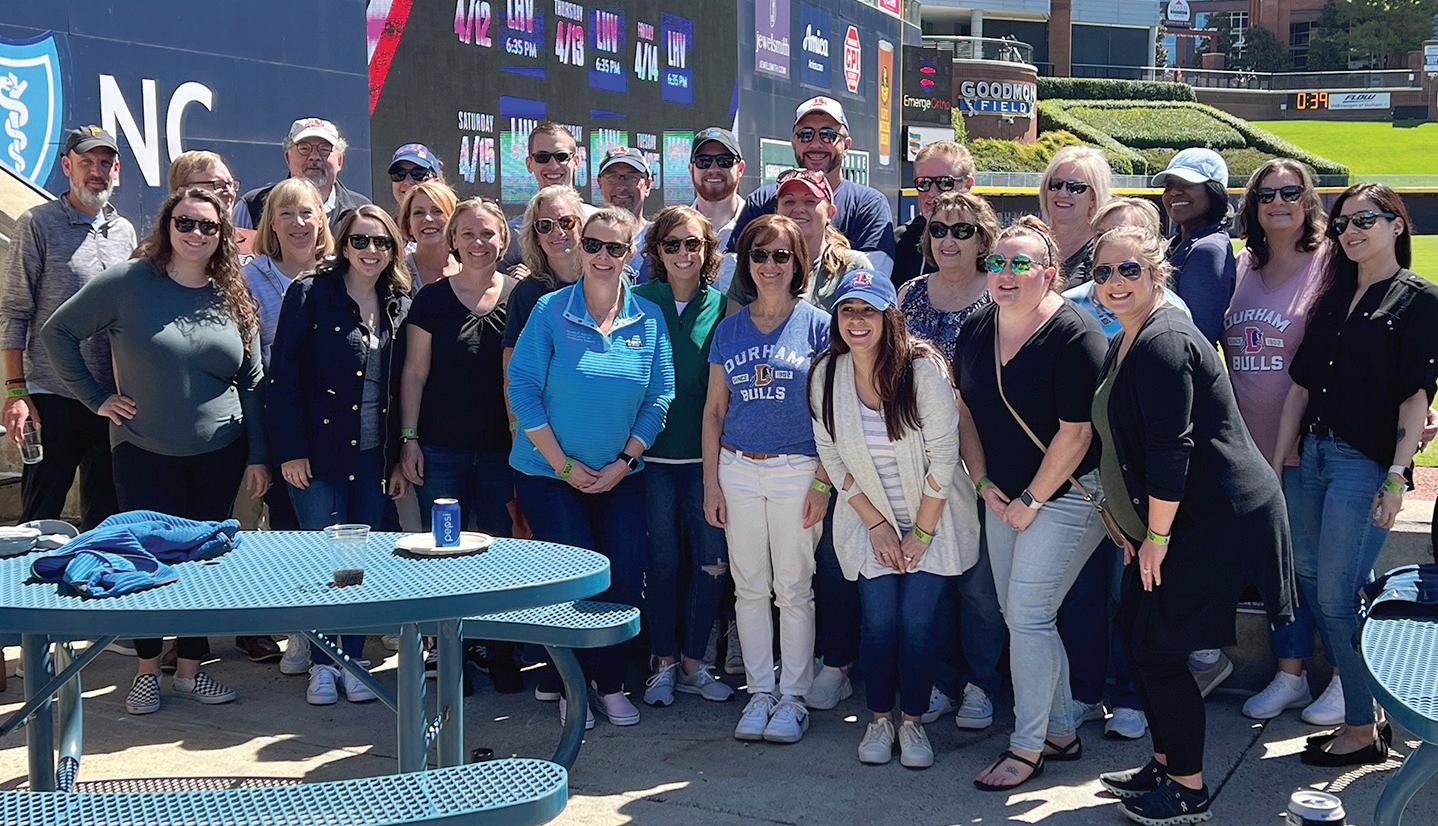
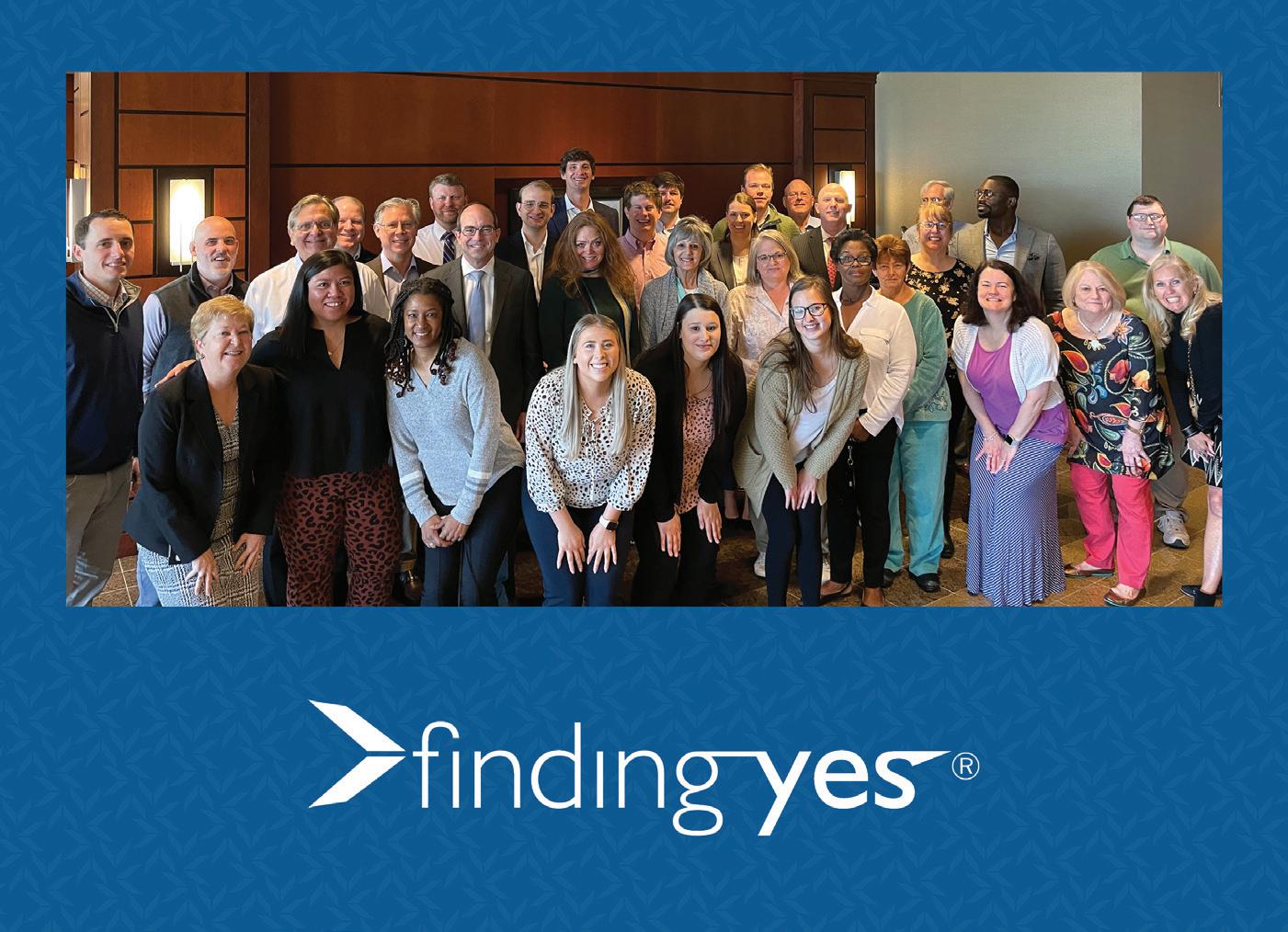
74 SPONSORED SECTION BEST EMPLOYERS 2023 301 FAYETTEVILLE STREET, SUITE 1700 | RALEIGH, NC 27601 | 919-981-4000 | WILLIAMSMULLEN.COM
101
NC 27513 | 919-828-4371 | IIANC.COM
WESTON OAKS COURT | CARY,
INSPIRED TO SERVE YOU
BRC is a Certified Public Accounting and Advisory firm headquartered in Greensboro, NC with offices in Charlotte, Dunn, Raleigh, Wilmington, and Winston-Salem. BRC supports today’s middle market and private companies, not-for-profit organizations, small businesses, government entities, families, and individuals. BRC’s dedicated, industry focused teams bring a unique perspective to your business. We are widely known for our best-in-class service across North Carolina, the Southeast, and nationally.
The firm’s commitment includes: responding to client needs by providing both reliable opinions and realistic options; maintaining a balanced work environment enabling employees to achieve their personal and professional goals; and remaining connected to our communities through professional and civic involvement in local organizations.
Technical knowledge and client service are foremost to BRC. This means the firm has the resources to offer guidance tailored to the specific needs of our clients. We understand that communication is critical. Clients have direct access to not only their partners, but also to all team members assigned to engagements.
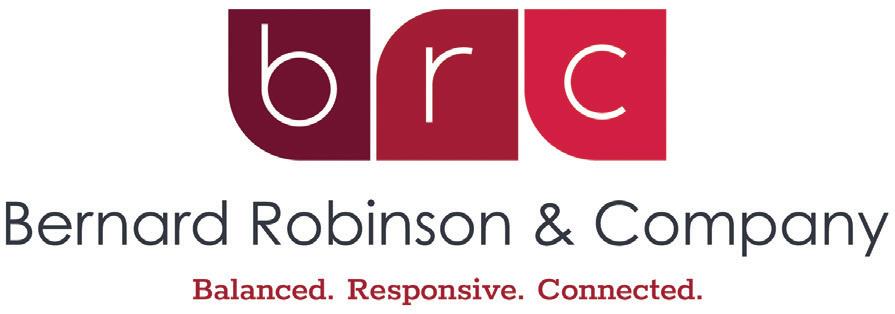
At BRC, we pride ourselves on providing a sustainable career for employees in the public accounting profession. This ensures the most engaged, invigorated, and inspired client service and advisory relationships. With a continuing mission to remain Balanced, Responsive, and Connected, BRC is a firm supporting its people, clients, and community through a culture of trust, compassion, and flexibility. So why not begin the type of accounting relationship that offers fresh ideas that project your business forward... and discover how an interactive advisory partner can accompany you to new heights.
OTHER LOCATIONS:
RALEIGH
4700 Homewood Court, Suite 105 Raleigh, NC 27609 919-862-0004
WINSTON-SALEM

110 Oakwood Drive, Suite 400 Winston-Salem, NC 27103 336-303-0997
DUNN
100 E. Cumberland Street Dunn, NC 28334 910-892-1021
WILMINGTON
1213 Culbreth Drive, Ste 139 Wilmington, NC 28405 910-386-4520
CHARLOTTE
2400 Crownpoint Executive Drive Suite 200 Charlotte, NC 28227 980-296-0676
75 SPONSORED SECTION 1501 HIGHWOODS BLVD, SUITE 300 | GREENSBORO, NC 27410 | 336-294-4494 | BRCCPA.COM
BUILDING RELATIONSHIPS SINCE 1973
For more than 50 years, Blackman & Sloop, CPAs, P.A. has provided exceptional tax, accounting, and consulting services to individuals and businesses throughout North Carolina. The firm strives to cultivate strong relationships with its employees, clients, and community. Our team of qualified professionals, led by seven partners, provides solutions and proactive strategies tailored to your questions. We are committed to building a relationship focused on your growth and long-term success. When you partner with Blackman & Sloop, you can expect a collaborative, team approach.

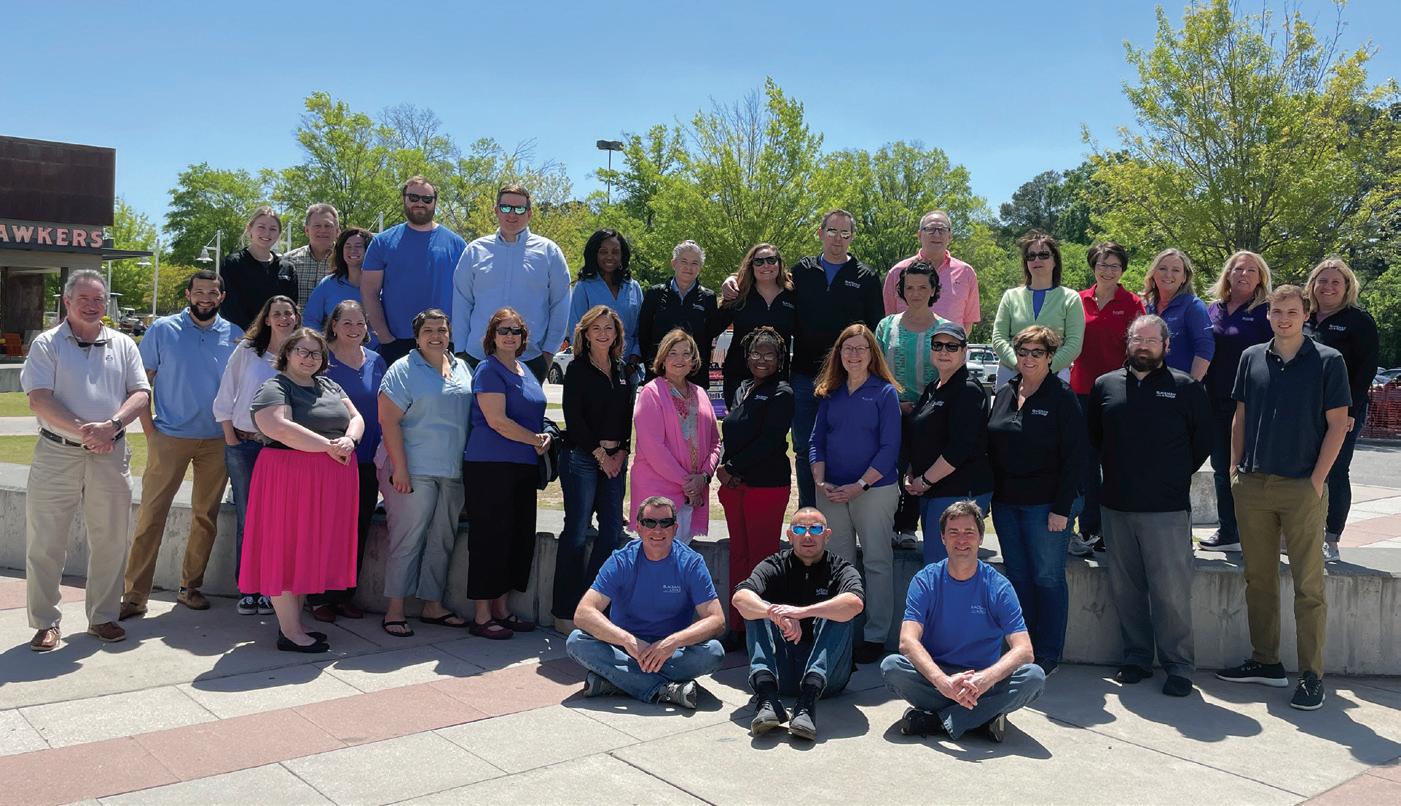

76 SPONSORED SECTION BEST EMPLOYERS 2023
1414 RALEIGH ROAD, SUITE 300 | CHAPEL HILL, NC 27517 | 919-942-9700 | B-SCPA.COM
Since 1992, when SCHUNK opened its doors in North Carolina as the rst SCHUNK manufacturing facility outside of Germany, the company has had a strong presence in the area and become well-known in the local community. e 170,000 sq. . manufacturing facility and o ces in Morrisville is the USA headquarters of the worldwide leader for equipping modern manufacturing and robot systems. e facility has undergone two expansions since 1992 and has consistently increased its manufacturing capacity to produce more tooling and automation components here in the US, servicing US based customers in an everincreasing capacity. Today there are more than 3,500 employees in 9 plants and 34 directly owned subsidiaries globally.
SCHUNK is particularly proud of its focus on developing a skilled workforce of manufacturing and automation professionals. e company is committed to engaging local high school and college students to foster an interest in modern manufacturing. SCHUNK has a strong


involvement in traineeship, mentoring and the apprenticeship of local high school and college students, o ering a 4-year apprenticeship program in cooperation with the North Carolina Triangle Apprenticeship Program (NCTAP); o ering NC State engineering students semester-long Co-op programs, and o ering facility tours and mentoring to high school robotics teams. It is important to the company to give North Carolina’s youth an understanding of what a future career in manufacturing or automation might look like, and to help them see the sometimes unknown opportunities that this career path could a ord them.
e 180+ strong US team bene t from a coveted company culture with values deep rooted in the family-owned origins. is ideology is at the center of the company ethos and is apparent through every aspect of the company; shaping the way the team work together, support each other, and support customers and partners. Even as the team has grown it has always been important
to retain the family-centric roots and celebrating and honoring all successes together. Whether it is a company-wide celebratory party for the anniversary of SCHUNK’s 30 years in the US, or surpassing sales goals; or even wishing colleagues a “happy birthday” or a playing a Saturday round of golf, the SCHUNK team is a strong community who enjoys socializing and commemorating achievements together.
SCHUNK is lucky enough to bene t from a winning combination of experienced and knowledgeable sta with almost 50% of SCHUNK’s US employees having worked at the company for 5 years or longer. e President of SCHUNK USA, Milton Guerry, who recently celebrated his 23rd anniversary at SCHUNK, attributes the company’s success in the USA to its strong, experienced and driven team, saying “the USA team has an unwavering determination to succeed, and together hand-in-hand we will continue to achieve future success in North Carolina.”
77 SPONSORED SECTION BEST EMPLOYERS 2023 211 KITTY
DRIVE | MORRISVILLE, NC 27560 919-572-2705 | SCHUNK.COM
HAWK
GREAT PEOPLE. GREAT COMPANIES.
Graham Personnel Services (GPS) is an award-winning, national, full-service staffing firm that specializes in hiring, retention, and recruiting. For more than 50 years, business leaders across the country have trusted the Graham Team to fulfill their hiring requests. We are highly experienced professionals with an unmatched commitment to customer satisfaction and expertise across diverse industries, so our employment firm is well-suited to provide staffing solutions for Fortune 500 companies as well as small business owners. We understand that true staffing solutions are more than skills and knowledge — matching the right people with the right positions creates productive, positive experiences for everyone. We believe human capital is the greatest competitive advantage to any business and we strive every day to be the leader in recruiting in North

Carolina and throughout the United States. Our areas of expertise include manufacturing, logistics, light industrial, production, professional, accounting & finance, and health care. Our services offered include temporary to direct hire, temporary, direct hire, payroll services, onsite (onpremise) services and recruitment process outsourcing (RPO). Graham Personnel Services can help with all of your recruiting and staffing needs throughout the nation! We have active placements in 19 states and have GPS onsite locations in NC, GA, TX, VA, OR, CA, and MO. For Direct Hire services specifically, we have recruiters positioned in NC, IL, OK, IN, and VA, and they make placements nationwide. Our mission is to match great people with great companies, and it all starts with our internal people. We invest heavily in
our people to set them up for success, and to help them better service our candidates and clients. We are proud to have established such a great work environment and reputation that has led us to earn various awards and recognition. GPS has been awarded Best Staffing Firm by SIA for five consecutive years (2019-2023), Best Places to Work by the Triad Business Journal for seven consecutive years (2017-2023), and most recently, we were named to the NC Best Employer List by the Business North Carolina for 2023 and 2022! We have also consistently made the Triad Business Journal’s Largest Temporary Placement Firms List and the Largest Triad Executive Search Firms List.
Our people make GPS great and we are honored to earn our place in the North Carolina Best Employers list again!
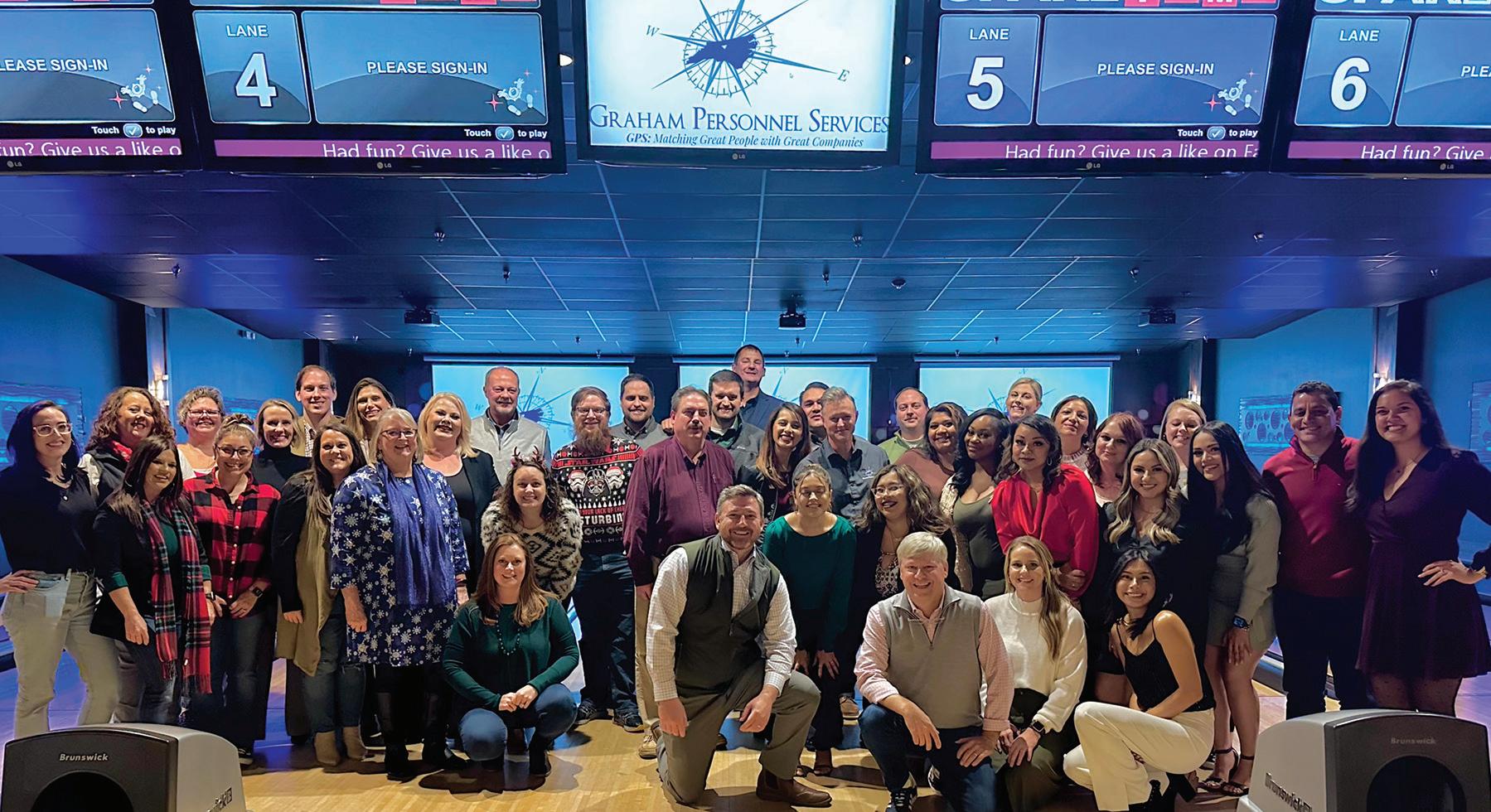
78 SPONSORED SECTION BEST EMPLOYERS 2023 424 GALLIMORE DAIRY RD, SUITE A | GREENSBORO, NC 27409 | 336-288-9330 | GRAHAMJOBS.COM
SUPPORTING WORK-LIFE BALANCE
We are thrilled to announce that we have been chosen as a Best Employer by Business North Carolina magazine. This is a prestigious recognition that reflects our dedication to our values and our people.
We started our firm in 2014 with a vision to provide high-quality legal services to our clients while creating a positive and supportive work environment for our employees. We encourage our employees to pursue their passions and interests inside and outside the office. We believe in honesty, diversity, teamwork, and adaptability as the pillars of our culture. We appreciate the different backgrounds, skills, and perspectives that each of our employees bring to the table. We want our employees to grow with us and thrive in their careers and personal lives. That’s why we offer a variety of benefits and opportunities for professional and personal development. Some of these include:

• Support for individual goals, including monthly budgets for networking engagements and personalized networking plans.
• Remote work options.
• Teambuilding activities within our office and in the community.
• No after-hours work. We are a 9a-5p office and don’t work on the weekends!
• Recognition of our employees’ successes and achievements.
We believe that what sets us apart from other firms is not only our commitment to our clients, but also our commitment to our employees. We care about their well-being, happiness, and satisfaction. We let them choose the areas of law that they are passionate about and we support them in achieving their goals. We keep a close eye on individual workloads because burnout is real and avoidable. Worklife balance is very important to us.
We are honored and grateful that our employees voted for us as a Business NC Best Employer. But our efforts don’t end with this achievement, as we are continuously
looking for ways to improve our working environment. We know that when our employees feel appreciated, they do their best work, and they enjoy what they do.
We are always looking for talented and motivated people to join our team. We practice in various areas of law, including family law, business law, ERISA, employment, and civil litigation. We are also eager to continue and increase our community outreach, which includes hosting 2 free monthly workshops, one for women and one for men who want to learn more about the divorce process from trained professionals.
We celebrate every victory attained by our people, big or small, personal, or professional. We are proud of our achievements, and we look forward to more success in the future.

79 SPONSORED SECTION BEST EMPLOYERS 2023 2200 E 7TH STREET. SUITE 100 | CHARLOTTE, NC 28204 | 704-919-1519 | YOURNCATTORNEY.COM
Celebrating its 50th anniversary this year, Golden Corral is the nation’s largest bu et restaurant chain. With a commitment that begins each day with preparing delicious food, Golden Corral also believes in providing outstanding hospitality and giving back. Service to others is a hallmark of the brand. Golden Corral restaurants have long been strong supporters of Disabled American Veterans. Golden Corral is also the founding sponsor of Camp Corral, a nonpro t corporation, which provides free, one-of-a-kind summer camp experiences for children of wounded, injured, ill, or fallen service members. rough the generosity of guests and employees, Golden Corral restaurants have raised over $30 million for these military causes.



Tencarva Machinery Company stands as a distinguished provider of Industrial and Municipal process equipment solutions. With a longstanding history of over 45 years, Tencarva has been widely recognized as the preferred source for integrated process equipment solutions throughout the Southeastern United States.
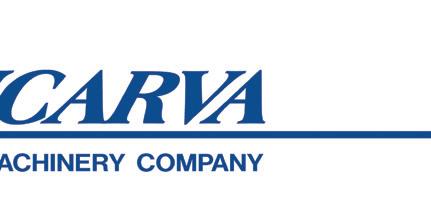

Tencarva sets itself apart with an array of premium chemical process, and industrial water/wastewater treatment solutions. Tencarva o ers a vast range of top-quality equipment, and provides services, such as application engineering, fabrication, and automation. Moreover, Tencarva’s full-service support team for all distributed products is dedicated to delivering the most e cient solutions tailored to the unique needs of each customer.

80 SPONSORED SECTION BEST EMPLOYERS 2023 1115 PLEASANT RIDGE ROAD | GREENSBORO, NC 27409 | 336-665-0250 | TENCARVA.COM
5400 TRINITY ROAD, SUITE 309 | RALEIGH, NC 27607 | 919-781-9310 | GOLDENCORRAL.COM
Installation of a municipal wastewater pumping station.

With a population of more than 536,000, Guilford County has an economy as diverse as its residents. Boom Supersonic’s $500 million “superfactory” at Piedmont Triad International Airport and Toyota North Carolina’s $3.7 billion electric-vehicle battery production plant are just some of the headline-grabbing corporations shaping Guilford County’s rapidly evolving economic landscape. Central to it all is Guilford Technical Community College, leveraging innovative instruction and state-of-the-art facilities to produce a highly skilled workforce.
GTCC is the fourth largest community college in North Carolina, with more than 80 programs of study, including technical and vocational training, continuing education, and college transfer programs, preparing students to enter the workforce or continue their education. The college’s impact on the business community and on Guilford County tax-paying citizens is significant. A 2021 Economic Impact Study shows GTCC added $542.9 million in income to the Guilford County economy during fiscal year 2019-2020, and supported 8,662 jobs, which is one out of every 44 jobs in the county.
As the manufacturing sector of Guilford County continues to expand, GTCC’s programs provide essential training for would-be workers in the field, including mechatronics, robotics, and computer-integrated machining. Additionally, Guilford County’s growing healthcare industry has been supported by a number of GTCC’s programs, including nursing, medical assisting, and surgical technology, and more. The college’s investment in helping students develop the knowledge, skills, and abilities needed for fulfilling and prosperous careers is significant and far-reaching.

Central to the college’s mission are continued partnerships with local businesses, organizations, universities, and schools, where GTCC has developed cutting-edge training programs, expanded continuing education courses, and launched initiatives that meet local business needs. If you’ve ever taken a class at one of GTCC’s conveniently located campuses, or if you’ve engaged with a GTCC student or alumni, this much becomes very clear — Together, we are “making amazing happen” for everyone in our community.
Anthony J. Clarke, Ph.D. president, Guilford Technical Community College
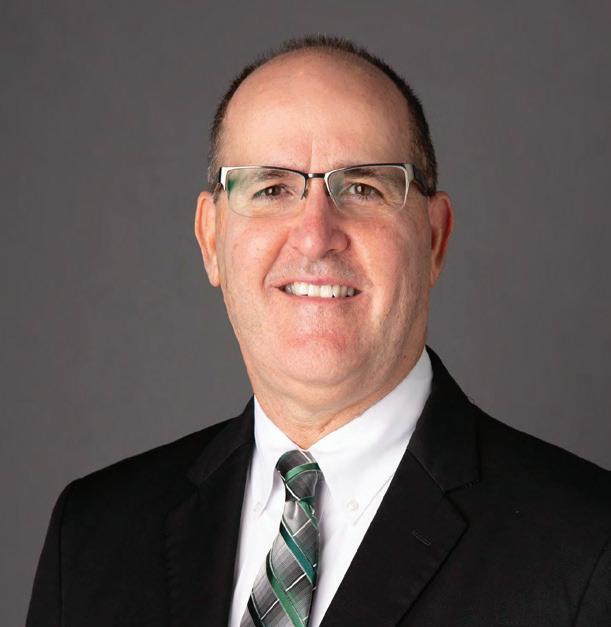






82 BUSINESS NORTH CAROLINA
SPONSORED SECTION COMMUNITY CLOSE-UP GUILFORD COUNTY
MOVING RIGHT ALONG
Guilford County welcomes new transportation projects while its stronghold furniture industry keeps on giving
Guilford County has long been a hub for a variety of businesses, including High Points famed furniture sector. It’s also becoming home to a growing number of transportation businesses. Here’s a look at Guilford’s transportation scorecard.
High Point-based Thomas Built Buses which has a long presence in the county, added close to 300 employees last year to boost production of leading edge vehicles. Its Jouley model can travel 135 miles fully charged, seats 81 passengers and is quieter than gas-powered models.

Toyota plans to invest $5.6 billion for its electric vehicle battery plant at the Greensboro-Randolph Megasite near Liberty. The site is expected to employ about 2,100 at a median salary of $62,234.
Piedmont Triad International Airport, with1,000 acres ready for development, already hosts FedEx, Honda Aircraft, HAECO Americas, Cessna. Boom Supersonic plans a $500 million plant.
Mack Truck’s global headquarters also calls Greensboro home.
“We talk a lot about the transportation transformation, and these kinds of companies are making a difference and providing work opportunities for people, as well as bringing recognition to our region,” says Sandy Dunbeck, director of economic development in High Point. Dunbeck was director of the Guilford County Economic Development Alliance in 2021, which represents High Point, Greensboro and other local economic groups.
“The HondaJet project speaks
to the assets we have here. And the Greensboro-Randolph Megasite, with the Toyota battery project, is transformational for our area and the people who work there.”
Brent Christensen, CEO of the Greensboro Chamber of Commerce, calls Toyota’s commitment “transformational.”
“For Toyota to have an EV strategy, this is a mission that is critical to them,” he says, “so we’re excited about it. Then up the road a little you have Volvo Mack, and the cars, trucks, electric school buses. This part of North Carolina is going to touch every kind of electric vehicle made in the future. The road to electrification goes through Guilford County.”
New industries bring new workers – local people trained in workforce pathways through colleges, such as Guilford Technical Community
83 JUNE 2023
PHOTO COURTESY OF THE CITY OF HIGH POINT
Thomas Built Buses is one of several Guilford County companies tied to transportation.
NEW SPACE FOR IDEAS
High Point is taking a new step to encourage entreprenurship.
“The city recently acquired 300 Oak St. in the southwest, and it will be a chance for entrepreneurs to have their businesses, and we’re working on a shared kitchen project,” says Sandy Dunbeck, the city’s director of economic development. She’s also worked to create opportunity zones with tax benefits and is a member of the Small Scale Manufacturing Initiative, which supports smaller manufacturers and women-owned businesses.
The Oak Street building, which sold for $3 million in December, is an Industrial, opportunity zone space with 30,000 square feet upstairs, office suites and conference rooms. The lower level has warehouse space.
“The opportunities and quality of economic development in the county is on-going,” she says. “There are brand-name companies that we’ve welcomed from throughout the world, we have small businesses, minority businesses, we have high-wage opportunities and we want people to have a thriving life here. You have a way to provide for your family, the average wage continues to grow and we want our citizens to do well.”
College and High Point University. And new workers mean new families.
Guilford’s population in 2021 was 542,410, according to the U.S. Census Bureau, up from 517,281 in 2015, making it the third-most populous county in the state. Greensboro counted 298,263 residents in 2021.

“The good news is, we’ve been preparing for this a long time,” Christensen says. “The beauty of these [industry] projects is they’ve been in the works for a while, so last year Guilford County passed a resolution to schedule a $1.7 billion bond referendum for school construction and renovation. So we’ll have the schools ready for the future when these projects come to fruition. We’ve also focused on housing and have seen thousands of new housing units.”
Bond funds will address infrastructure needs, including building three new schools and renovating about 30 others, as well as provide safety and technology upgrades, according to a school system press release.
THE MARKET EFFECT
For 114 years, the city of High Point has hosted trade shows for the furniture and home interiors industries. An economic study in 2017 showed High Point Market Authority [HPMA] events bring $6.7 billion into the state and contribute to 15,000 jobs for people who attend the twice-a-year extravaganza.

The market ranks as having the highest economic impact in the state, says Tammy Nagem, president and CEO of the HPMA.
“It’s because of the way we work with different airports and hotels, and many exhibitors have their corporate offices here in the state,” she says. “People rent rooms. We service about
90 hotels, three airports, two parking lots with about 2,000 spaces and two modes of transportation to move you about downtown, which comes to about 150,000 rides a year out of our transportation system.
“It’s in our DNA,” she says. “We know how to do it.”
Nagem became president and CEO on Jan. 1 after 11 years as COO.
The market consumes 180 buildings, 11.5 million square-feet of showroom space, buyers, sellers, designers, exhibitors and suppliers. “Our population almost doubles,” Nagem says. “You can stand at a stoplight and hear three languages. This isn’t High Point anymore. It’s an international event.”
HPMA has been working on four focus areas for the shows.
First: “To really concentrate on new buyer targets. Our goal is to bring those designers, retailers and other buyers in the trade who are looking for product, so our job is to target the right buyers to come to High Point,” Nagem says. “For example, we’ve been targeting more antique buyers and those in the luxury sector.”
Second: “We want a frictionless guest experience, to make sure people are getting a well-rounded experience with the new products, education, networking, providing some entertainment in the evenings such as national act concerts just open to market guests,” she says.
Third: “Technology. We have a technology road map to make sure the buyer and seller connect in a certain way. If you’re at a bus stop, you can look at your app and tell when the bus will be there,” she says. “We have planned maps. When you log in there are a lot of good tools and we try to get real time information between the buyer and seller.”
Fourth: “This is nourishing the next generation of home furnishing
SPONSORED SECTION COMMUNITY CLOSE-UP GUILFORD COUNTY 84 BUSINESS NORTH CAROLINA
professionals. That may sound like it’s out of the scope, but the industry is only as healthy as making sure the next generation understands it. We need to make sure there’s diversity and inclusiveness, and make sure the industry is accessible to all.”
High Point University’s Interior Design, Furnishings & Fashion Merchandising major, with a bachelor’s in Interior Design, has more than 200 students, about 80% of whom enrolled from out-of-state, says John Turpin, dean of the David R. Hayworth School of Arts and Design.
“This is reflected across all majors, including interior design, home furnishings and fashion merchandising,” he says. “Both North Carolina and out-of-state students appreciate the opportunity to gain real-world experience with national and international companies present at the High Point Market. These connections are priceless for students, and they go on to launch careers in the home furnishings industry.”

Graduates of the university’s interior design and fashion merchandising majors, Turpin says, “now design for Lillian August. [Some] are buyers for Pottery Barn and Ashley Furniture. [Others] work as store designers, merchandisers and product developers for Cartier, Kate Spade, Diane von Furstenburg, Bassett, Wayfair, Stickley and Klaussner. High Point University graduates also own and operate their own design firms.”
Turpin says the HPU-HPMA relationship produces “unparalleled networking opportunities.”
“HPU students … (are) gaining experience and building connections with industry leaders in some of the world’s best showrooms – twice per year,” Turpin says. “Both HPU and the High Point Market support each other considering that HPU has renowned

85 JUNE 2023
PHOTO COURTESY OF .HIGH POINT UNIVERSITY
High Point University’s interior design student, Anastia Avlonitis (right) working with a representaive from Regina Andrew at the Fall 2022 High Point Market.
interior design and home furnishings programs and High Point Market attracts international businesses. And it all happens in their backyard.”
BOOM’S SOARING IMPACT
Groundbreaking for the 62-acre Overture Superfactory in January on a 62-acre campus at Piedmont Triad International Airport in Greensboro brought Boom Supersonic’s elite jet one step closer to reality. The aircraft will travel twice the speed of today’s commercial jets and fly on 100% sustainable aviation fuel, according to the company. American Airlines, United and Japan Airlines have already pre-ordered Overture jets.

Boom, which hopes to start production in 2024, will recruit an estimated 2,400 workers for a manufacturing program expected to grow the state’s economy by $32.3 billion over 20 years, according to its website.
“Kevin [Baker] is an incredible airport director, if you’re an economic developer, because he understands what it takes to get economic development projects and what it takes to keep them for many years to come,” Christensen says.
“The site is graded and construction will start very soon,” says Baker, PTI’s executive director. “Test flights will be in 2026. Guilford Tech undoubtedly will be training a number of people who will be

working for Boom. GTCC has the most people in aerospace training in the entire state, in multiple programs; they have about 55 or 60%. So they’re a huge partner.”
“We work very closely with the airport, and we have one of the biggest aviation programs in the Southeast,” says Dr. Anthony Clarke, president of Guilford Technical Community College. “We do multiple classes every semester. So we are at about 420 to 440 students a year in aviation alone. We work closely with Honda and HAECO, which got busier during the pandemic because they weren’t flying. There’s a constant demand for aircraft personnel.”
Airport traffic is rebounding.
“Our flights are not quite back to pre-COVID numbers, but we’re at about 85% in terms of flights and passengers,” Baker says. “This airport, like others, was hurt by a pilot shortage, and it really impacted smaller facilities and the problem spiraled downward to regional carriers. But it’s starting to come back. There are rays of sunshine.”
PTI’s new air traffic control building was the country’s newest when it came online last November. The 180-foot-tall Sen. Kay Hagan Air Traffic Control Tower has a 15,650-square-foot base that accommodates 10 radar positions and can control airspace within a
60-mile radius, an area that includes 20 general aviation airports.
The new tower, which replaces a 90-foot predecessor in use since 1974, cost $58 million.
“[PTI] is into a pretty serious level of preliminary designs of redoing our terminals. We need some updating on the concourses, where you walk out to the planes. Those buildings are 40 years old,” Baker says. “There aren’t any estimated start dates yet. It’s in the early stages of talking with contractors and designers.”
The airport, he says, has a dual mission. “We’re still a traditional place of transportation, what everyone thinks an airport is, but we also have this mission as part of aerospace employment and we have 8,600 people here in logistics, building and designing airplanes. We occupy a very specialized niche in the world of airports because of the land we have [more than 1,000 acres available for economic development].
“If Boeing decides they want to make a new airplane, we have the land.”
YOU CAN MAKE IT HERE
“We are the No. 1 state for business in the United States, and we are the heart of manufacturing in the state,” Christensen says. “You’re in the best place. We have the best of what North Carolina has to offer
SPONSORED SECTION COMMUNITY CLOSE-UP GUILFORD COUNTY 86 BUSINESS NORTH CAROLINA
PHOTOS
OF AMERICAN AERIAL
COURTESY
AND KEVIN BAKER
Kevin Baker, pictured above . An aerial image of the Guilford County Piedmont Triad Internationl Airport.

GUILFORD COUNTY
Greensboro Chamber of Commerce

336-387-8310, greensboro.org
High Point Economic Development Corp. 336-883-3116, highpoint.gov 2011



EMPLOYMENT BY INDUSTRY
Health care: 13.1%
Manufacturing: 11.2%
LARGEST PRIVATE-SECTOR
EMPLOYER
Cone Health
LARGEST CITY/TOWN
Greensboro:population 298,263
COUNTY PROPERTY TAX
73.1 cents per $100 value
HIGHER EDUCATION
Bennett,
without the headaches you might find elsewhere; we have the least traffic, the shortest commutes.
“But also look at the workforce,” he continues. “At one time, we can have close to 100,000 college students, with degrees being confirmed for 20,000 to 25,000 every year. Our legacies are industries and manufacturing, but we also have incredible talent in entrepreneurial companies. I would stack our area up in talent produced by our colleges and universities with any in the country.”
*Per
Source: 2023 North Carolina Economic Development Guide
“We market ourselves jointly as Greensboro-High Point,” Dunbeck says,“with the slogan ‘You Can Make It Here,’ which means you can forge your path in a number of different directions: In advanced manufacturing, in aerospace, in automobiles. There’s a wealth of opportunities.”

SPONSORED SECTION 88 BUSINESS NORTH CAROLINA
Guilford and Greensboro colleges; High Point and NC A&T State univercities; UNC Greensboro; Guilford Technical Community College
2021* Population (000s) 495.4 547.4 Employment (000s) 261.3 278.6 Unemployment 10.8% 5.6%
Capita Income (000s) $37.5 $49.9
Per
capita income is for 2019, the most recent year available.
PHOTO CREDIT: CHARLES PEARCE, ESPA ARCHITECTS & PLANNERS
GGTCC challenged ESPA to develop a 40,000-square-foot design that not only would house new classrooms, flight simulators, dispatch labs, and faculty offices, and stand out from the nearby warehouses. The goal is to express how the aviation campus will be a part of the growing regional aviation industry.

TEACHING TO THE JOBS
Guilford Technical Community College works with employers to best prepare students for the workforce.
The N.C. Federation for Advanced Manufacturing Education [FAME] program announced a partnership in January with Guilford Technical Community College to provide two-year, debt-free associate degrees in STEM fields connected with manufacturing.


The FAME First in Flight chapter partners with Jowat Adhesives in Archdale, MasterBrand Cabinets in Lexington, Toyota Battery Manufacturing in Liberty and ZiehlAbegg, a German manufacturer of ventilation fans and drive technology for motors. FAME was founded by Toyota and has 37 chapters in 14 states.


“It is an entity separate from Toyota, and they’re very clear about that,” says Dr. Anthony Clarke, president of Guilford Technical Community College. “This is the first North Carolina chapter, so we’re honored to be the first partner. It’s an apprenticeship-type program in which students can earn a two-year degree in advanced manufacturing technology. You work for the company while you’re going through the program, then once you have
your two-year degree you get hired by them and have a great career with all kinds of opportunities. They call it ‘world-class manufacturing,’ so they want to do best-in-the-world type training.”
GTCC is fourth-largest of North Carolina’s 58 community colleges and has more than 27,000 students. About 12,000 are in degree-pursuing programs, while the remainder is in workforce development. Clarke says the programs with most enrollment are those under associate in arts categories. Aviation, healthcare and public safety are also extremely popular.
“There are so many different careers. You can train to go get a job, and maybe in the future work toward your bachelor’s,” Clarke says. “We also have a free, ‘lastdollar’ initiative. So if you’re a high school graduate in Guilford County, you can come here for free.”
The $3.2 million Access Amazing Scholarship debuted in March 2022 and pays the remaining balance of tuition and course fees after all
federal, state and scholarship grants have been applied.


GTCC meets twice annually with local employers in several industries. “We are definitely out there in the community with employers to see how we can help prepare new employees and upscale current employees,” Clarke says. “Yes, there are great jobs, but people aren’t just going to show up. You have to recruit, sell your message, let students know, let parents know. We work with Guilford County Schools to let students know of all the possibilities when they graduate. It’s a work in progress. There’s more to do.
“As far as the great programs we have here, the great faculty and staff, we’re really focusing on how we want every student who comes here to succeed, and we help them do that. It’s all about the student experience: From the time they contact us, to when they graduate, to being in an alumni network, we want their experience to be as good as possible. We want them to know that we care.”
SPONSORED SECTION COMMUNITY CLOSE-UP GUILFORD COUNTY 90 BUSINESS NORTH CAROLINA CLOSE-UP
PHOTOS
COURTESY OF GUILFORD TECHNICAL COMMUNITY COLLEGE

OUTPERFORMING EXPECTATIONS
Greensboro’s performing arts center is breaking records.
The $93 million Steven Tanger Center for the Performing Arts, which opened in downtown Greensboro in September 2021, sold out 88 performances its first year. The shows included Bob Dylan, Josh Groban, Shen Yun, Sting and “Wicked,” the first Broadway show to play the venue. The performance drew more than 66,000 patrons during its 24-show run, making it the highest-grossing, longest-running engagement of a Broadway show ever in the Triad, according to Matt Brown, managing director for the Greensboro Coliseum Complex and Tanger Center.
“What that’s meant for the community is monumental,” Christensen says. “[The Tanger Center] has everything from world-class concerts to Broadway shows, and it has really energized our downtown in the way we all had hoped. It was a week from opening when COVID shut us all down, and it has surpassed everyone’s expectations.”
“The economic impact has been enormous,” Brown says of the center. “The venue has truly transformed downtown Greensboro and brought a new energy to downtown. Hotels and restaurants are routinely packed before events.”
The multi-week Broadway shows have generated millions for the region. The Broadway League,
the national trade association for the Broadway industry, estimated “Wicked” generated more than $11 million in economic impact for the region, Brown says.
Disney’s “The Lion King,” also enjoyed a successful two-week run in February and March 2022, grossing more than $3.6 million at the box office. An estimated 46,000 theatergoers saw 16 performances and generated an estimated economic impact of nearly $12 million.
“The response has been nothing short of phenomenal. People in the Triad and beyond no longer need to travel to Durham or Raleigh to enjoy an award-winning Broadway show in a state-of-the-art venue,” Brown adds. “ [Our] first fiscal year – which was only 10 months since it opened in September — saw the venue host 203 events and performances that drew a total of 415,421 patrons. We also sold 17,414 season tickets to our inaugural Broadway season, an industry record for a new venue.”
Along with being a star among patrons, the Tanger Center is getting high marks from promoters, production teams, agents and artists. There have been rave reviews about the quality of the sound and lights, the ease of loading in and loading out a show and the professionalism of the staff, according to Brown.



Broadway productions and
concerts aren’t the only shows in town.
The High Point Rockers of the Atlantic League of Professional Baseball play at Truist Point Stadium in High Point. The $35 million stadium seats 5,000 and along with a concession stand, includes a fullservice restaurant, playground and splash park.
Beginning in 2024, the stadium will be home to the Carolina Core Football Club, a team in the MLS NextPro soccer league, which is affiliated with Major League Soccer.
The athletic connections, Dunbeck says, has segued into interest in residential developments. “We’ve seen more national developers and more housing at every level, in every price range,” she says. “We have the infrastructure to support that, an urban community with two large cities and the infrastructure to make it easier for developers to come in and build these housing communities.”
“So, we were talking the other day,” Christensen says, “about bringing in Top Golf. Whether you’re a golfer or not, it’s a wonderful way to enjoy the sport of golf. They’re coming here because they know they’ll have the venue. It’s indicative of the growth we’re seeing.” ■
SPONSORED SECTION 92 BUSINESS NORTH CAROLINA
COMMUNITY CLOSE-UP GUILFORD COUNTY P HOTO CREDIT:
Kathy Blake is a writer from eastern North Carolina.
GREG LOFLIN, STEVEN TANGER CENTER FOR THE PERFORMING ARTS

PHARMA TO FARMING

Flour mill expansion highlights Johnston County’s diverse economic landscape
BY KEVIN ELLIS
Arecent $28 million expansion at the state’s largest our mill will help wheat farmers get their crop to commercial bakers who turn the commodity into bread, cookies, tortillas and many other edibles.
e almost two-year project completed in April underlines the path food travels from farms to dinner tables, says Andrew Rutter, a commercial manager for Kansas City-based Bartlett, which owns the mill in the Johnston County hamlet of Wilson’s Mills.
“ is enables us to deliver on our goal to help feed the world,” says Rutter. “We’re the supply chain link between the farmers and the producers.”
e Bartlett grain milling facility also represents the dichotomy of Johnston County’s economic landscape. e Bartlett mill sits 25 miles southwest of the State Capitol, a short distance from U.S. 70, and not far from Interstates 40 and 95, which crisscross in the southern part of the county.

On the west side of Johnston County, closest to Raleigh, two pharmaceutical giants, Denmark-based Novo Nordisk and Grifols, headquartered in Spain, employ a combined 3,400 workers.
For centuries, though, Johnston County has been an agricultural center. It still ranks h in the state in active farms, and is one of just eight counties in North Carolina to have more than 1,000 farms, according to the county’s Cooperative Extension O ce.
“Johnston County is sort of two counties in one,” says Chris Johnson, director of its economic development group. “We have seen tremendous growth and investment in the pharmaceutical industry, but agribusiness and food processing continues to be a central part of Johnston County’s economy.”

e county’s population has soared 34% since 2010 to about 227,000, nearly triple the state’s 12% growth rate in that period. About 2,500 live in Wilson’s Mills. Johnston is o en viewed as an a ordable alternative to Wake County, which grew by more than 25% during that period, becoming the state’s most-populated county with more than 1.1 million residents.
 BY THE NUMBERS
BY THE NUMBERS
2,534 Wilson Mill’s population, 2020
227,000 Johnson County’s population, 2020
34% Johnson County’s growth from 2010 to 2020 source:
11.3% Wilson Mills population growth from 2010 to 2020
“It has a lot to do with the growing population and where customers are growing,” Rutter says of Bartlett’s decision to expand in Wilson’s Mills. It also has mills in Statesville and Co eyville, Kansas. e N.C. site serves mostly commercial bakers in the Carolinas and Virginia.
Started in July 2021, the expansion added a fourth milling unit and increased storage capacity by around 80% for wheat, 50% for our and 50% for millfeed. e plant can store 1.1 million bushels of wheat, equivalent to 66 million pounds. e four milling units can mill a maximum of 2 million pounds of wheat.


e company added about eight workers at the highly automated operation, bringing the total number of employees to about 60.
North Carolina farmers grow 400,000 to 500,000 acres of wheat per year, according to a 2021 report from N.C. State University. Most goes to feed livestock, although roughly 7 million bushels (420 million pounds) is used for grain-based goodies. A bushel of wheat (60 pounds) can make about 45 loaves of bread.
Of the six types of wheat varieties, North Carolina produces mostly so red winter wheat, which is planted in the fall and harvested in late spring. Bartlett uses our from this type of wheat to supply mostly cookie and cracker manufacturers.
Bartlett also receives by rail hard red winter and hard red spring wheat varieties from the Midwest, says Rutter. ese types of grain go into breads, pizza crusts, tortillas and more. Wheat bran, a byproduct of the milling process, is sold for animal feed.
e Wilson’s Mills grain mill was built in 2000 and acquired by Bartlett in 2007 for $17 million. Bartlett expanded the site in 2012.
Bartlett has been in the grain business since 1907. It was acquired by Salt Lake City, Utah-based Savage Company in 2018. Brothers Kenneth, Neal and Luke Savage run their diversi ed private company that has about 4,000 employees in North America, Mexico and Saudi Arabia, providing engineering, transportation and other services. ■
94 BUSINESS NORTH CAROLINA GREEN SHOOTS Revitalizing rural N.C.
PHOTO COURTESY OF BARTLETT
U.S. Census Bureau



















































 BY DAVID MILDENBERG
BY DAVID MILDENBERG








 BY KEVIN ELLIS
BY KEVIN ELLIS


















 By Vanessa Infanzon
By Vanessa Infanzon




























 By Edward Martin
By Edward Martin












 By Kathy Blake
By Kathy Blake

















































































































 By David Mildenberg
By David Mildenberg


















































 SHARI WHITAKER director of the cloud business office | LexisNexis Raleigh
SHARI WHITAKER director of the cloud business office | LexisNexis Raleigh




































 Danielle Niedfeldt, CEO and president
Danielle Niedfeldt, CEO and president













































































































 BY THE NUMBERS
BY THE NUMBERS





